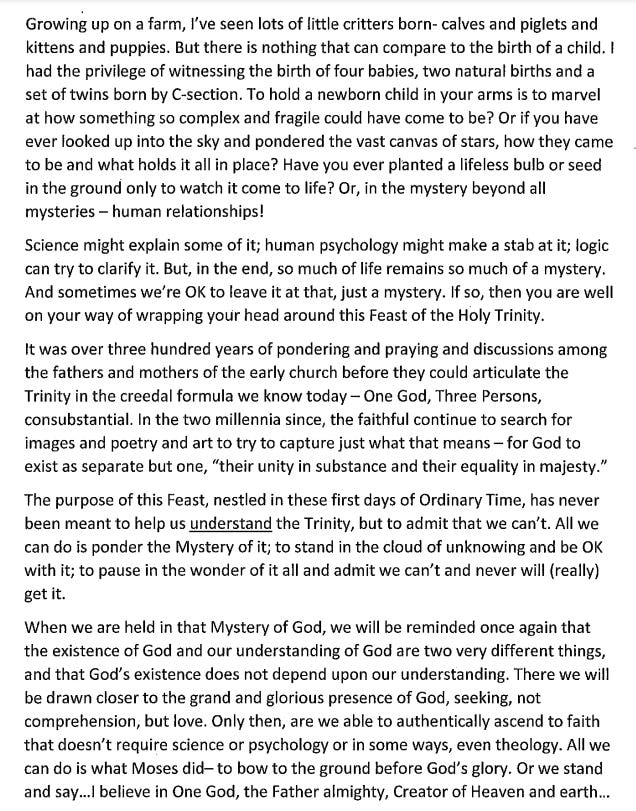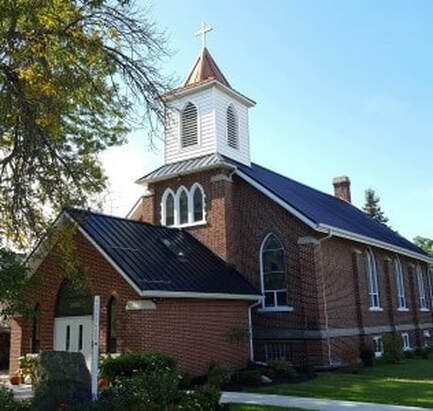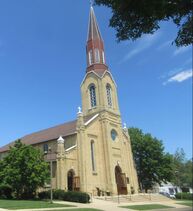Weekend Homilies
Did you hear something that resonated with you? Are you looking to reflect on the weekend homily?
The homily will be made available here in both written and audio form some time during the following week. Click on the links below to take you to a specific homily.
The homily will be made available here in both written and audio form some time during the following week. Click on the links below to take you to a specific homily.
Twenty-Seventh Sunday in Ordinary Time
Deacon Steve (Homily) - Father Steve Kortendick
Deacon Steve (Homily) - Father Steve Kortendick
|
27TH SUNDAY - ORDINARY TIME Oct. 8, 2023 Let’s say you open your Bible either to read a specific passage or chapter, maybe the Scripture of the day, or just open it to read. After reading, did you ever scratch your head and wonder - humpf - what in the world was this all about? What’s the message? More importantly, what’s in this passage for me? Well, I welcome you because it happens to me more frequently than I like. Auxiliary Bishop Robert Morneau, a native of Bear Creek, WI, international speaker and author once wrote: ONE OF THE BEAUTIES OF SACRED SCRIPTURE IS THAT IT DEALS WITH ALL OF LIFE: JOY AND SORROW, GRACE AND SIN KINDNESS AND CRUELTY, MERCY AND RESENTMENT. NOTHING IS LEFT OUT. DIVINE REVELATION OPENS FOR US HOW WE ARE TO SEE AND RESPOND TO EVERY DIMENSION OF LIFE. If we think back over our lives, and even you youngsters, storytellers teach us a lot. Stories help us remember and understand better. Prophets of the Old Testament (inspired by God’s Holy Spirit) and Jesus’ stories are wonderful examples. They are allegories, stories and poems, for instance the Psalms, and the book of Daniel. These Scriptural stories and poems are meant to reveal a message abut our God. Scripture today - Vineyards in Isaiah and Matthew. Mark writes in His Gospel - “He began to teach them many things in parables”. Sounds easy. But some parables are hard to grasp, and some, once they are grasped, are hard to accept. We have two Scriptural challenges in this 21st century:
So then, what are we to do here today? Have some “brilliant person” stand at the ambo and make it crystal clear? There are learned and talented people who can do that. Sorry, today is NOT your lucky day but I will do my best. For sure, these two vineyard stories from the OLD and NEW Testament are clearly about SIN and punishment…in a context that would make sense to the people of the times and to their understanding of our God. We have such an advantage today with Jesus. God, our Father, has told us in so many words…want to know me? Look at Jesus! SIN - PUNISHMENT - GUILT…tough words. Listen to this brief story from Jesuit, James Martin, in his book “JESUS A Pilgrimage”… “A young man once told me that he couldn’t bring himself to pray because he kept imagining God judging him for not only everything he did, but also for everything he thought.” Know this, believe this - There is no end to the love mercy and forgiveness of our God. Go home today with Paul’s words to the Philippians: “Have no anxiety at all, but in everything, by prayer and petition, with thanksgiving, make your requests known to God. Then the peace of God which surpasses all understanding will guard your hearts and minds in Christ Jesus.” Or, if it is easier to remember, Padre Pio’s words: PRAY, TRUST, DON’T WORRY. Amen. Click the audio button to the right to listen. |
Audio Recording
Click the image above to hear a recording of this homily.
|
Twelfth Sunday in Ordinary Time
|
Twelfth Sunday in Ordinary Time
(DO NOT BE AFRAID) DO ANY OF YOU REMEMBER A WOMAN BY THE NAME OF JEAN DRISCOLL? YEARS AGO SHE WON THE WOMENS WHEELCHAIR DIVISION OF THE BOSTON MARATHON. AFTER WINNING, STORIES OF HER LIFE HIT THE NEWSPAPER AND I REMEMBER READING ONE PARTICULAR ARTICLE WHERE SHE SAID, AS A KID SHE WAS AFRAID OF THE LONG TERM CONSEQUENCES OF HER HANDICAP AND WHAT HER LIFE WOULD BE LIKE CONFINED TO A WHEELCHAIR. CONSTANTLY ANGRY AT GOD, SHE SAID SHE DIDN’T UNDERSTAND WHY THINGS, LIKE HER HANDICAP EXISTED, WHEN SHE KNEW THERE WAS A LOVING GOD WHO SEEMED TO BE TAKING CARE OF EVERYONE…BUT HER. THE ARTICLE WENT ON TO SAY THAT HER FEELINGS OF BEING AFRAID…OF NOT KNOWING WHAT HER FUTURE WOULD BE LIKE AND HER FEELINGS OF ANGER, EVENTUALLY CHANGED AFTER WITNESSING THE LIVES OF SOME OF HER FRIENDS …AND HOW THEIR FAITH SPOKE LOUD AND CLEAR THRU THEIR WORDS AND ACTIONS. JEAN DISCROLL REALIZED THAT BEING CONFINED TO A WHEELCHAIR WAS JUST A CHARACTERISTIC…AND NOT A DEFINING PRINCIPLE OF HER LIFE. AND OVERCOMING HER FEARS, SHE BELIEVED GOD HAD A PLAN FOR HER…AND IN FULFILLING THAT PLAN SHE BELIEVED THAT NO MATTER WHO WE ARE…OR WHAT WE HAVE OR DON’T HAVE IN LIFE, THERE IS ALWAYS A CARING, COMPASSIONATE GOD WHO HELPS US OVERCOME OUR FEARS….THOSE MOMENTS OF BEING AFRAID OF NOT KNOWING WHAT THE FUTURE HOLDS FOR US. THAT KIND OF FAITH PROVIDED HER WITH THE HOPE…THE STRENGTH AND THE COURAGE TO COMPETE IN THE BOSTON MARATHON. IN THE GOSPEL TODAY, JESUS IS TALKING TO HIS DISCIPLES ABOUT THE FEARS, THE PERSECUTION…THE OPPRESSION THEY MAY ENCOUTER AS HE SENDS THEM OUT ON THEIR MISSION TO PROCLAIM THE GOOD NEWS. HE REMINDS THEM NOT TO BE AFRAID AND REINFORCES THAT BY LETTING THEM KNOW …REMINDING THEM ABOUT THE MEANING AND IMPORTANCE OF THEIR LIVES. AND IN DOING THAT HE TALKS ABOUT, OF ALL THINGS, SPARROWS. SPARROWS WERE CONSIDERED, IN JESUS’ DAY, TO BE THE LEAST SIGNIFICANT OF ALL CREATURES. YET JESUS SAYS THAT GOD PROVIDES FOR THEM…THAT THEY ARE VERY IMPORTANT AND VALUABLE TO GOD, EVEN IF THEY ARE CONSIDERED THE MOST COMMON AND MOST INSIGNIFICANT BIRD IN THE WORLD. AND JESUS GOES ON TO SAY THAT IF GOD PROVIDES FOR THESE INSIGNIFICANT SPARROWS, HOW MUCH MORE WILL GOD PROVIDE FOR US, ESPECIALLY WHEN HE KNOWS EVERYTHING ABOUT US…EVEN AS THE GOSPEL STATED….THE NUMBER OF HAIRS ON OUR HEAD (AND FOR SOME OF US THE COUNTING IS ALITTLE BIT EASIER FOR GOD. THAT IMAGE OF KNOWING HOW MANY HAIRS ON OUR HEAD IS PROBABLY AN EXAGGEREATED WAY OF SAYING, GOD KNOWS ALL ABOUT US…THAT GOD KNOWS ABOUT OUR NEEDS...OUR FEARS...OR WORRIES…OUR CONCERNS. GOD KNOWS ALL ABOUT OUR JOYS AND WHATEVER ELSE MAKES OUR LIVES MEANINGFUL AND FULFILLILNG. AND IN THAT KNOWING GOD WILL PROVIDE FOR US WHAT WE TRULY NEED, BECAUSE HE DEEPLY CARES WHAT HAPPENS TO US. THAT’S CERTAINLY REASSURING TO THOSE OF US WHO MIGHT BE FACED WITH A LIFE THREATENING ILLNESS…THAT’S COMFORTING TO KNOW FOR THOSE OF US WHO MAY HAVE RECENTLY LOST A LOVED ONE…IT’S A SOURCE OF HOPE IN LIGHT OF SOME OF THE DIFFICULTIES AND CHALLENGES WE FACE IN LIFE. IT WILL BRING US PEACE OF MIND AS WE FACE THE CHANGES BOTH LOCALLY AND WITHIN THE DIOCESE AS ANOTHER PART OF THE “INTO THE DEEP” INITIATIVE IS IMPLEMENTED NEXT WEEKEND. IN A BOOK TITLED, “GOD NEVER FAILED ME”, THERES A HUMOROUS STORY ABOUT 2 NUNS WHO WERE DELIVERING ALL KINDS OF MEDICAL SUPPLIES TO A NURSING HOME, WHEN THEIR CAR RAN OUT OF GAS. THEY SEARCHED THE ENTIRE CAR FOR A GAS CAN BUT THE ONLY SORT OF CONTAINER THEY COULD FIND THAT COULD HOLD GAS WAS A BED PAN, YES, A BED PAN FROM THEIR MEDICAL SUPPLIES.AND WE ALL KNOW WHAT BED PANS ARE USED FOR. SO THE SISTERS WALKED TO THE NEAREST GAS STATION AND FILLED THE BED PAN WITH GAS. THEN RETURING TO THE CAR, THEY CAREFULLY BALANCED THE BED PAN AND BEGAN TO POUR THE GAS INTO THE TANK. WELL, ABOUT THAT TIME A MAN DRIVING A PICK UP TRUCK APPROACHED AND WHEN HE SAW WHAT WAS GOING ON, HE CAME TO A COMPLETE STOP…AND MARVELING AT WHAT HE THOUGHT HE WAS SEEING, HE STUCK HIS HEAD OUT THE TRUCK WINDOW AND SAID..”SISTERS, I’M NOT CATHOLIC, BUT I’LL TELL YOU WHAT…I SURE ADMIRE YOUR FAITH. GOD NEVER FAILS US…THERE’S NEVER ANY REASON TO FEAR, IF OUR FAITH IS STRONG ENOUGH TO WITHSTAND THE CHALLENGES OF LIFE. WE HAVE PEOPLE LIKE JEAN DRISCOLL WHO WON THE WHEELCHAIR DIVISION OF THE BOSTON MARATHON WHOSE FAITH, NOT ONLY GAVE HER THE DETERMINATION TO OVERCOME HER PHYSICAL FEARS TO COMPETE IN THE MARATHON, BUT MORE IMPORTANT, REAFFIRMED GODS LOVE FOR HER. I AM SURE THERE ARE MANY OF YOU RIGHT HERE IN THIS PARISH WHO ARE WONDERFUL EXAMPLES OF HOW YOUR FAITH HAS CARRIED YOU THRU VERY DIFFICULT AND CHALLENGING TIMES…A FAITH NURTURED, STRENGTHENED AND SUSTAINED BY GODS LOVE, CARE AND CONCERN. SO WHATEVER IS HAPPENING IN OUR LIVES… WHATEVER IS GOING TO HAPPEN IN THIS PARISH AS YOU FACE NEW CHANGES AND CHALLENGES…LETS REMEMBER THAT GOD’S LOVE FOR US IS SO GREAT THAT HE WILL PROVIDE FOR YOU…AND ME…ALL THAT WE NEED TO MEET THE CHALLENGES OF LIFE. SO …DO NOT BE AFRAID. |
Audio Recording
Click the image above to hear a recording of this homily.
|
Eleventh Sunday in Ordinary Time
Father Gary's Final Weekend in Portage and Briggsville
Father Gary's Final Weekend in Portage and Briggsville
|
Eleventh Sunday in Ordinary Time
Final Weekend in Portage and Briggsville June 18, 2023 Thirty-nine years ago, on June 15th, I was ordained a priest for the Diocese of Madison. On that day, as I knelt before Bishop O’Donnell, I made a promise of obedience to him and to all his successors. I have kept that promise, a promise that led me here to Portage and Briggsville ten years ago. At that time, I could never have imagined the blessings and graces that I would receive over the next decade. Now, that same promise of obedience leads me to say good-bye. There is (obviously) sadness in that task - but most of all gratitude. So, today I need to thank you… Thank you for welcoming me into your parish, your lives, your homes and your hearts. That welcome is a treasure that we, as priests, depend upon, and has made these past ten years such a rich blessing. Thank you for taking my crazy ideas and guiding some of them into reality. The renovation of our churches will stand as a concrete reminder of those ideas. Others may be less visible, but I hope will stand with the same majestic endurance: what we have done to gather the community, the family of God; of how the mercy has healed wounds and made us a stronger family. I hope those, too, are as memorable and valid as any renovation. Thank you for accepting me for the gifts I may have brought to the table, for giving me the confidence to use those gifts to plant a seed of hope or a vision for a tomorrow, or to put a smile on your face, or comfort you in your grief. Thank you for forgiving me for those times I did anything that offended you, or failed to do something I could have. I am humble enough to know that I was not the Pastor you sometimes wished I would be. Most of all, thank you for helping me become a better Pastor, a better priest and a better man. What I ask of you today is simple: Like the disciples, without cost we have received, without cost we give. You are the workers of the vineyard; just continue to proclaim the Kingdom of God. So, if I have helped you grow closer to God in any way, please make it your mission to help someone else do that same, so that they will remember that they, too, are in the holy presence of God. And if I revealed God’s love to you in any way, reveal that to someone who feels unloved, so that they, too, will never forget that truth that you have heard me say a thousand times: there is nothing we can do to make God love us any more, and there is nothing we can do to make God love us any less. God just loves. If I have made God’s Word a little more accessible to you in my homilies, share that message with someone else, so that they may know that God is at work in their lives, too. If I have opened your heart to the mercy of God in any way, offer that mercy to someone who needs it, because the kingdom of God begins and ends with God’s mercy. At the end of Mass today, I will leave my vestments at the presider’s chair. It is my time to relinquish this privilege to someone else, my time to entrust you, my dear flock, into the hands and heart of yet another pastor who will shepherd you will love. Two weekends from now, Fr. Randy will put those vestments on and, fulfilling his promise of obedience, and will become your Pastor and come to love you, and be loved by you, just as I have. May the Good Shepherd continue to bless you in all that you have been to me - and all that you are - and all that you have yet to become. |
Audio Recording
Click the image above to hear a recording of this homily.
|
The Most Holy Body and Blood of Christ (Corpus Christi)
|
The Most Holy Body and Blood of Christ (Corpus Christi)
June 11, 2023 A couple weeks ago, I visited a long-time friend of mine that was celebrating his 40th anniversary of Ordination. Since we were close by, we decided to take a drive to St. John’s University and Abbey, where we went to seminary. At the time we were there, back in the early 80’s, there were about 200 monks that also lived and worked and taught there, a Benedictine community of men. One of the things we were reminiscing about was how they would process into the chapel for Mass on Sundays. They would come down the aisle two-by-two and when they got to the front, they would bow to the altar in recognition of its sacredness, before the table at which they gathered to receive the Body and Blood of Christ. And then they would turn and bow to each other –a recognition of the sacredness of each other, another place where Christ was present. I’ve always thought those two simple bows proclaimed more about what we celebrate today in the Feast of the Body and Blood of Christ than anything else: The reverence and appreciation of the Body of Christ we receive - and the Body of Christ we become. That simple exchange of bows proclaims the profound mystery in which we are so privileged to participate every time we gather for Mass. To bow to the altar is to acknowledge that it is here where the deepest of our hungers are fed. We have hunger of body and spirit and mind that are fed in countless ways, but there lies within each of us a hunger of the deepest kind, one that often has no word to describe, that only Christ –and Christ alone- can feed. At this deepest place within us, where we are most vulnerable and most afraid and broken, Christ offers himself to comfort us, strengthen us, assure us, enliven us like nothing else can or ever will. To bow to each other is to acknowledge that in each of us, Christ also dwells. The very life of the Risen Lord already abides within us, not by our merit, of course, but simply because that’s what God wants to do. So, we recognize holiness, the Christ, that is present in ourselves and within all of our brothers and sisters. The monks at St. John’s taught me a lot in those simple bows that began their liturgy, because no matter how their day was going or who they processed in with, whether they just came from the classroom or the kitchen or from the fields, whether they were old and had seen many seasons or whether they were a novice and just getting started, whether they liked their brother or were challenged to like them -- it was the recognition of Christ’s presence in the Eucharist and in each other that held them together. They knew what every wise and healthy family comes to know, that we must all be home at regular times and gather around the table. They knew what every community of faith comes to know, that we must also gather around this Table- even if it isn’t exciting, even if things are left unspoken, even if some are bored and others are protesting that this isn’t worthwhile. We will do this because, if we don’t, we will soon fall apart as a parish family. We need the manna of the Eucharist, and we need to remember the presence of Christ in each other. We need God. We need each other. We can bow before that truth. |
Audio Recording
Click the image above to hear a recording of this homily.
|
Feast of Pentecost
|
Feast of Pentecost
May 28, 2023 Tammy was always an inquisitive girl, so it did not surprise her Mom when she came up to her one day and inquired, “Mom, where did I come from? I mean how did I get here?” Of course, Mom, her brain now kicking into Mommy-mode said, “Well honey, God made you out of love. Because your Mommy and Daddy love each other so much, God helped them make you.” Tammy kind of nodded and walked away, and Mom breathed a sigh. But Tammy obviously was not satisfied. She went out the back where Dad was working and asked, “Daddy, where did I come from? I mean how did I get here?” Dad, barely looking up, said, “Well, honey, a long time ago we were all apes and monkeys. And eventually, over the years, those apes and monkeys turned into human beings. That’s where you came from.” She went back to the kitchen, walked right back to Mommy and said, “Mommy, you said God made me out of love. Daddy said I came from a bunch of apes. How can that be?” Mom, without missing a beat, said, “Honey, I was talking about my side of the family; Daddy was talking about his.” It is good for all of us, on this Feast of Pentecost, to remember where we came from. We are a faith community that bears the name of Christ, a church that was born by the gift of the Holy Spirit. At the first Pentecost, Jews from every nation under heaven were gathered in Jerusalem. The astonishment of that day was not that they all of a sudden spoke the same language or found a common tongue. The astonishment and the amazement created by the Holy Spirit was that for the first time, every one of them, no matter where they came from, heard the voice of the Holy Spirit. The gift was not to give everyone the same language or to take away their native tongue. The Holy Spirit gave them the gift to hear how the mighty acts of God were about all of their lives. Some years later, Paul spoke that same truth when he said that we are many parts but of the same body; that there are different gifts and different forms of service and different workings, but the same God that produces them. The church was created out of the many gifts bonded together by the love of Jesus Christ. This was the Spirit of which Jesus spoke when he breathed on the disciples and sent them forth. How is it that we so easily forget this simple truth? How is it that we think that unity can only be created through uniformity? That only if we wear the same color and live on this side of the border and speak the same language and live the same story will we be at our best? How is it that we come to fear those who are different? Hate those who stretch our boundaries? Why is it that as a church and as a people we sometimes work so hard to find ways to divide, and work so little to gather together? To remember Pentecost is to remember where we came from. We remember that each person came to be by the will and love and design of God. By the hand of God we are created with different shapes and sizes and hopes and loves, formed in different cultures and with different traditions and with different dreams and interests and gifts. Can we not trust then, that the same hand of God, who created this myriad of wonder, will not by the Holy Spirit, make us one? Not to be pureed together in some cosmic blender, nor to separate us in some overgrown centrifuge. The Church in which you and I are about to profess our faith was brought about by the Holy Spirit so that our individual beauty and magnificence and wonder and awe might never be lost, but together, would become a living manifestation of God’s glory. |
Audio Recording
Click the image above to hear a recording of this homily.
|
Feast of the Ascension
|
Feast of the Ascension
May 21, 2023 The end is near, liturgically speaking. Next weekend we will celebrate Pentecost and bring an end to the fifty-days of the Easter Season. That’s liturgically. But sometimes it’s hard to remember where we are in our liturgical season when we are immersed in other seasons, like Graduation Season. [St. Mary School had a 4k graduation (complete with cap and gowns) this past week.] Grade schools and high schools and colleges and universities all bid farewell to the Class of 2023 in these weeks. ‘Tis the Graduation season! As different as they are, these two seasons do overlap a bit, though. What we know in our culture graduations touch on what the disciples must have experienced as they witnessed Christ ascend to the heavens. For the graduates of Jesus’ School of Discipleship, it had to be an exciting moment, but it probably scared the begeebers out of them at the same time. Like graduates of today, there was wonder: the wonder that surrounded the moment of mystical transition in their lives as they came to understand Jesus’ ascension and what it meant, and the wondering: now what do we do? But here is the difference: in our graduation culture today, the institutions of education cut the ties; Jesus does not. Aside from an occasional alumni appeal, graduation is a (wave good-bye) “see-ya” moment. Another class takes our spot, our spot in the band or on the team is surrendered to another, our sacred lockers are taken over by a stranger, a new teacher’s favorite takes our place. Schools, whether grade schools or high schools or colleges or medical schools or any other institution of higher education do what they do - educate you and send you forth. Amen. But when Christ ascended to the heavens it was not a Hallmark good-bye-and-good-luck moment. The Ascension of Jesus is a forever moment, a timeless moment that we celebrate every year, because Jesus does not cut the ties. Jesus does not abandon his disciples; he ascends to allow his disciples -then and now- so that we might now do what he had done: to witness the love of God. He trusts us to tell the story of his love; it is our time to proclaim the truth, our time to show the way. “Go, therefore, and make disciples of all nations, baptizing them in the name of the Father, and of the Son, and of the Holy Spirit, teach(ing) them to observe all that I have commanded you.” We don’t celebrate an ending with the Ascension, we celebrate a beginning. There is work to be done. We are sent forth to be witnesses of Christ’s love. But we don’t do so alone. Jesus promises, “I am with you always, until the end of the age.” At graduations schools cut the strings. Jesus didn’t. In a world of endings and beginnings, we have Christ, with whom there is no end. So, fellow disciples, expect no cards of congratulations today; this is not a moment of glory for us. We are not on this earth to make a name for ourselves but to glorify the name of God. We are not on this earth to build a kingdom unto ourselves, but do build the Kingdom of God. It is our task to relieve suffering, to end violence and war, to remove ignorance, to heal wounds and to eliminate division, to promote understanding, to spread love, to live justice. We are sent forth, not to accomplish something great for ourselves, but to accomplish something great for God. And God, our God, is with us always. The path to discipleship is to step out and walk on the water of faith in the one who sends us into mission. And when we commit ourselves to that task, that my friends, is the tassel-flipping moment. |
Audio Recording
Click the image above to hear a recording of this homily.
|
Sixth Sunday of Easter
|
Sixth Sunday of Easter
May 14, 2023 It’s the Sixth Sunday of Easter and we’ll wrap this Season up with the Feast of Ascension next week and then Pentecost the weekend after that. We should have it down by now, right? Jesus died and then rose from the dead. We’ve heard the stories: the empty tomb, the road to Emmaus, Jesus coming through locked doors, all that stuff. Right? And week after week, we’ve heard of how the disciples came out from behind those locked doors and began to do what Jesus had told them to do. With courage and passion, they traveled throughout the known world and proclaimed the love of Christ to anyone who would listen. They did it with gentleness and reverence, sometimes suffering for doing good. But they did it. That’s the Easter Story and we’re sticking to it. But what sometimes is missing from all this is if anything has happened to us over the last six weeks. As Christians, we have the same mission as Jesus had from his Father, the same mission he gave to the first disciples: to spread the good news of the Father’s love and compassion and mercy. Our mission, like that of Jesus, and like that of the disciples, is to do our part to build the kingdom of God in our day - a kingdom of justice, of peace and of love. Like Jesus, we are sent to those who are hanging on by a thread and give them hope; we are sent to forgive those who have crossed the line and offended us, just as we have been forgiven; we are sent to feed the hungry and give drink to the thirsty and welcome the stranger and cloth the naked and house the homeless. That was the mission of Jesus; it is the mission on which he sent his disciples; it is our mission - to be the presence of the risen Christ in the world. Jesus could do what he did because the Father was one with him and he was one with the Father. But Jesus gave us another advocate, another helper, the Spirit of truth, to be with us, to show us the way. God living in us, we living in God. In very simple terms: we’re not orphans! We’re not out here alone. We have everything we need, every power, every strength, every vision to do what Jesus has asked us to do. The Easter story did not end with the resurrection, and it certainly can’t be told in six weeks. The Easter story lived on through the words and work of the disciples. Now, it becomes our story to proclaim. The gift of the Holy Spirit was given not for our sake, not to make our life somehow easier, not for our glory, but for the sake of our mission to others. The prayer you heard at the altar over the past few weeks (and will hear again today) proclaims, “Through [Christ] the children of light rise to eternal life and the halls of the heavenly kingdom are thrown open to the faithful; for his Death is our ransom from death, and in his rising, the life of all has risen.” As we near the last days of this Easter Season, we need to ask ourselves this: Jesus has risen to new life. Have we? |
Audio Recording
Click the image above to hear a recording of this homily.
|
Fifth Sunday of Easter
|
Fifth Sunday of Easter
May 7, 2023 It was in 1980; I was in college and in the process of switching paths from a career in law enforcement to priesthood. A part of the application process required letters of recommendation. So, I asked Fr. Drake Shaefer, the college chaplain, to write one of those letters. I don’t have the letter, nor do I remember most of it. But one line seared a place into my soul. “Gary is always willing to do the simple tasks that need to be done, like setting up tables and taking down chairs. I hope he never forgets.” I cannot begin to tell you how many times in my life those words have come back, not to haunt me, but to remind me of who I am and what I am called to do as a priest. It was a different setting 2000 years ago but the same message: The disciples were busy with the task of proclaiming the gospel, doing what Jesus asked them to do: “Go out to all the world and tell the Good News!” But in the midst of that, they noticed that some of the widows were being neglected in the daily distribution of food. So, they appointed some of their number to do the work of caring for the poor. It wasn’t that the early church saw the work of preaching more important than the work of charity, or the other way around, but they did realize that the mission of proclaiming the Good News had many voices. Did Jesus not say the same thing when he was preparing his disciples for the mission? “I am the way, the truth and the life. And no one comes to the Father except through me.” Didn’t he teach us the way when he fed the hungry, gave drink to the thirsty, welcome the stranger, healed the leper, ate with the sinners, and washed his disciple’s feet? The early Church community, even in its infancy, realized that following the way of Christ meant charity for all. Didn’t he teach us the truth when he taught us that no one is outside of God’s love, no one is outside the embrace of his mercy, that the little children were first in the kingdom, that we must forgive as we have been forgiven? Only in Christ do we get a sense of a divine love in which to operate and measure. Christ teaches a truth of heart that leads us through this complicated and ever-changing, diverse and (seemingly) always divided and violent world. Didn’t he show us the way to life was the way of sacrifice? That only when we are willing to give our life away: our time, our treasures, our gifts, only then will we ever find the way of true peace. In fact, didn’t he show us that the only way to eternal life is the way of the cross? As Christians today, disciples of Jesus Christ, we have the same mission as Jesus had from his Father, to spread the good news of the Fathers’ love, of God’s compassion and mercy. Our mission, like that of Jesus, is to be a part of creating the Kingdom of God of earth, in our own homes and communities - a kingdom of justice, of peace and love. And, yes, sometimes that includes the noble and privileged opportunity of preaching and teaching; sometimes it is wrapped discreetly in simple acts of kindness and compassion, in simple prayers and words we offer to each other. Sometimes it happens here in church, but more often in our homes and schools and workplaces. Sometimes it is witnessed in faithful marriage and other relationships of sacred love, other times it is witnessed in an unexpected moment between strangers who will never see each other again. And, yes, sometimes we follow the way and the truth and the life of Christ by setting up tables and taking down chairs. It’s as simple as that. |
Audio Recording
Click the image above to hear a recording of this homily.
|
Fourth Sunday of Easter
|
Fourth Sunday of Easter
April 30, 2023 (Kids), do you know the game,” Simon Says?” Let’s have a little fun: Simon says: Tap your head. Simon says: Raise your right hand. Now raise your left hand. (Gottcha?) Simple game, important lesson. There are so many voices we must listen to in life – the voice of our parents who try to raise us to become good kids, the voice of coaches and teachers forming our minds and bodies to achieve their best. And it doesn’t end with childhood. There are other voices, good and bad, that clamor for our attention all lifelong: the voice of civil and religious authority setting boundaries, the voice of commercialism convincing us of all those things we can’t live without, the voice of greed and of revenge that arise out of fear and anger, the voice of desire and longing that is fired by our sexuality. And while there is no “Simon” to guide us as to which voices to listen to, there arises one voice above and beyond all others: the Voice of the Good Shepherd. It will most likely not be the loudest voice or even the voice that leads us down the easiest path. But when we hear it, we know it’s a voice we have to listen to because it captures the attention of our souls, and somehow calls us from an authority that is beyond any human authority. It is the voice of Christ, the living God, that dwells within us, a voice that speaks so deep in our soul that it is impossible to ignore. In the crowded marketplace of this world, in a society that clamors to get our attention, when so many other voices are shaped by a political and divisive world, the voice of Christ keeps saying the same thing it’s been saying for two thousand years: That love always wins; that God’s mercy is never exhausted; that we are beloved by our God and there is nothing that can change that; that there is nothing we can do to make God love us any more than God does, and nothing we can do to make God love us any less than what God does. It is a voice that calls us to imitate that love and mercy in the world. Lest we think that the first disciples of Christ had it easy; after all, they were right there with Jesus and had the privilege of actually hearing his voice day after day. They didn’t have anything that we don’t have now. The Voice of the Good Shepherd that echoed in their memory is the same voice that cuts to our heart today, if we dare to listen. It is the Voice that calls us to this sacred Altar (not just for the first time, but) each and every weekend. It is the voice that calls us to forgive as we have been forgiven. It is the Voice that welcomes us into his presence each and every day. It is the voice that calls to the young as they begin their journey of faith and to us who are well on the way of our journey of faith. It is the one and only voice that can call us to our eternal home. (Simon didn’t say that; Jesus did.) |
Audio Recording
Click the image above to hear a recording of this homily.
|
Third Sunday of Easter
|
Third Sunday of Easter
April 23, 2023 It was my first day in Portage in 2013. I was trying to find my way from the church out to Walmart on the north side of town, and kind of knew which direction I should head. What I didn’t notice was the “One Way” signs at the corner of McFarland and Wisconsin, right by Jeff’s Tire. I’m still not sure if it was an inner voice, or if it was Jeff, himself yelling, but I heard it loud and clear: “Hey, dummy, it’s a one-way street!” Fortunately, it’s a short block and no one was coming, but if you’ve never found yourself going down a road the wrong way, you know - it’s not a good feeling. And I’m not just talking about driving. I’m talking about life. We’ve all been there: that moment we realize that our priorities have gotten messed up and we’re heading the wrong direction. Or when the bad habit turned into an addiction, when we’ve ignored the relationship for too long, when we said what we should never have said but can’t take it back, when we’ve lost touch with what’s important, when our prayer life is nonexistent. At some moment, at many moments of our lives, we realize we’re heading down the road of life the wrong way. That is the story of The Road to Emmaus. The disciples were broken, disappointed, defeated. The one they had thought would save Israel was dead or missing or something. All they knew was that things were just not working out the way they thought they should work out. So, they were heading to Emmaus, out of Jerusalem, away from the city of God, the city of fulfillment and promise and hope. They were heading the wrong way. But then, even before they realized what was happening, Jesus came and walked with them. Jesus didn’t wait for them to figure it out, to return to him, he found them and walked with them. Not with anger, not shaming them, not throwing guilt upon them. Just walked with them. As they walked along, first he listened, and then he reminded them that there was a bigger story going on here, so much bigger than their story. God’s story of re-creation, of redemption and mercy, of forgiveness and love. He helped them get out of their small mind and remember the bigger story, where God never forgets, never abandons, always seeks out the lost, always hears the cry of the poor, always shows us the path of life. And then, after all this, he brought them back to the table. Not just any table, but the table where he is made present. THIS table. The table to which he welcomes us over and over and over again. Finally, then, they recognized him. It was Christ who was helping them get back on the road all along, but this time heading in the right direction: back to Jerusalem, from which fulfillment and promise and hope flowed. My friends, we’re going to find ourselves there many times in life - heading in the wrong direction of life. Sometimes it happens, as it did for the disciples, because of sadness or grief. Other times, dreams and promises were broken, and we find ourselves living without hope. Often, we just get lost, we lose sight of what is really important, what really matters, what needs to be our priority. And at other times, life just throws us a curveball and we get caught off guard, and before we know it, we’re heading down a road that leads to nowhere. But then…without our even realizing it, Jesus will be walking with us. Somehow, he’ll find us and listen to us, and then remind us there is a bigger story going on here and help us to see just how our story finds a place in God’s story. And he’ll lead us back to this table, where Christ is made truly present. Like Cleopas and his friend, (like Peter said) we will be ransomed from our futile conduct and continue our sojourn with reverence. This time, though, heading the right way. |
Audio Recording
Click the image above to hear a recording of this homily.
|
Second Sunday of Easter~ Divine Mercy Sunday
|
Second Sunday of Easter
April 16, 2023 Like many of you, I grew up in a time when we never locked the car. In fact, I remember when I was a kid, we’d all go into town on Friday night (because that’s where things were happening!) and not only didn’t we lock the car, we often left the keys right in the ignition. Schools and churches were unlocked, too, and our house. I remember a little hook on the screen door but that was more for keeping the wind from blowing it open. Not so much, anymore. Sadly, it is rare to find doors unlocked, isn’t it? We lock doors when we are afraid. Locked doors give a barrier from whatever it is that we fear. Unfortunately, locked doors do not shut out fear itself; that remains sealed inside with us. Staying behind closed and locked doors may make us feel safe, but it keeps us from the people, the events and experiences that could help us grow into the selves we were meant to become. Just ask the disciples. They were afraid, and rightly so. Afraid that what they had witnessed happened to Jesus, could happen to them. So, they were huddled in the Upper Room, where just a few days before, right before it all unraveled and fear locked them behind closed doors, they had shared the Passover meal with Jesus. Now, with the doors locked for fear, Jesus came and stood in their midst and said to them, “Peace be with you.” And grace rushes in! Just that, Jesus appearing and blessing them with his presence, voicing “Shalom,” Peace, and it all began to change. Not right away, perhaps. Maybe not even for all. But something was broken down. He came, even though the doors were locked, and stood in their midst. When he had said this, he showed them his hands and his side. He was real. Not a ghost, not their imagination. Really and truly present. And when they saw him, the disciples rejoiced. They could see things differently. Just knowing he was with them helped them to be who he had called them to be – disciples. Men and women who would proclaim his message of love and mercy and forgiveness and eternal life. So much of our lives are lived in fear, and there are legitimate things of which to be afraid. But we cannot live our faith in fear -fear of what others will think; fear of being rejected; fear of taking a risk; fear of loss; fear that things may be different than what they were. Fear cripples us from becoming who we are meant to be. If we fear living our faith, or not allowing our faith to shape our relationships and our schedules and our priorities and our tomorrows, it will start to gnaw away at us. We lose confidence and perspective. It’s what happened to the disciples. It’s what happens to us when our faith in Christ is not the center of our lives, when Christ is not in the room with us. The fear grows, takes on a life of its own, while we diminish. And in that fear, we can never become the people we are called to be as disciples of Jesus Christ. Fortunately for us, Easter reminds us that Jesus does, indeed, stands before us. In the Word of God proclaimed, in the Eucharist shared from the Altar, in the Body of Christ that gathers together, the Lord of life himself comes and stands before us. The one who defeated death comes back and says, “Peace,” assuring us that we are safe, that it is going to be alright. Most of all, that he is with us. And then he said to them (and to us): Now, go. “As the Father has sent me, so I send you.” |
Audio Recording
Click the image above to hear a recording of this homily.
|
Easter Sunday
|
Easter Sunday
April 8, 2023 After work, one day, a young woman stopped to watch a Little League baseball game that was being played in a park near her home. As she sat down behind the bench on the first-base line, she asked one of the boys what the score was, “We're behind 14 to nothing,” he answered with a smile. “Really,” (she said), “I have to say you don't sound very discouraged.” 'Discouraged?', (the boy asked with a puzzled look on his face). “Why should we be discouraged? We haven't been up to bat yet.” That is an Easter attitude. That is the message of the empty tomb. Remember that on that first Easter morning, there had been no sighting of Jesus, no first breakfast at the Sea of Galilee, no greeting in the Upper Room; just an empty tomb. That’s how it started. “Behind by 14 in the top of the First.” But there was an empty tomb. That morning - in the midst of their broken dream, in the middle of their darkest hour, as they peered into the empty tomb, before they yet understood, there was faith. While others had given up, thought it was all over, that the game had already been lost, that all they had hoped would happen, didn’t happen - there were those few that first morning that just believed. That’s why it is so important to celebrate Easter every year, why we celebrate Mass with the church every Sunday! Our Easter story is about faith – faith that we are part of the game of life that Christ has already won for us. This is about Christ’s resurrection and his invitation to follow him into that resurrected life. Somehow, the world -and sometimes our own religion - has perpetuated a great untruth that we can somehow save ourselves if we are good enough or score enough spiritual points, or at least score more points than the next guy. In doing this we negate the great act of love that we celebrate on this Easter. We hang on to the false belief that if we do enough back-flips of virtuous acts or complete our spiritual pushups with enough vigor we might, just might, find ourselves in the favor of God. Easter shouts to the unbelieving world that the game is not over. It is our chance to begin anew, to create what has not yet been created, to do what has not yet been done, to accomplish what has up to now not been accomplished, to reconcile what remains still broken. We do this, not by our merit, not by our power, but by the power of the Resurrected Christ that is in us. We come together on this Easter morning, most of us still trying to capture what that really means. Like the first disciples that came to the empty tomb: we believe even if we don’t fully understand. There will, indeed, be times when we might find ourselves “behind by 14 in the top of the first.” But we still have hope, more than hope: absolute confidence in Christ who has won victory over all sin, over all evil, over all darkness, over death itself. What a different place the world would be if we could just believe that; if we could just truly, honestly, deeply believe that in his love for us, Christ died and rose for us…and then live in that unconditional love of Jesus Christ. Once we get there, we will know Easter. And it won’t matter what the score is, because we’ve already won. |
Audio Recording
Click the image above to hear a recording of this homily.
|
Easter Vigil
|
Easter Vigil
April 8, 2023 Every year we begin our Easter Vigil in the dark because in that darkness we tap into something primal and instinctive. There is something in us that longs for daylight, years for new life, eager for a new beginning, yearning for love, eager for reconciliation and unity. So, every year, in its most sacred liturgy, the Church symbolically touches that instinctive yearning and breaks that darkness with fire. And then, from one single flame atop the Easter Candle, that light spreads through the congregation with the acclamation, “The Light of Christ surrounds us.” And Easter happens. Seeds and roots are buried in the ground, but every spring, the warmth of the sunlight urges them to break through the darkness of the soil. And Easter happens. We may know what it is like to feel completely alone in the midst of a crowd, or know darkness of depression or addiction. But then a voice of someone who hasn’t given up on us breaks that darkness and reminds us that we are worthy of love and life. And Easter happens. When in the darkness of loss, or the suffocating blanket of grief, or the betrayal of a friend or lover, you one day find yourself appreciating a sunrise and you hear yourself laugh and you begin saying “yes” to life once more. And Easter happens. Easter happens when in the overwhelming doubt or that reoccurring but nagging wondering, if does God really does exist, or if God does exist does God really care about my tears and hear my cries? And then you are struck by a simple whisper of hope from somewhere you can’t begin to explain. And Easter happens. That’s why the Resurrection story touches such a deep place in our souls. It’s why we keep coming back. We have known that darkness, and we will know it again in our lives. None of us are immune from the tomb. So, we come here tonight to remember what God does with darkness. In our stories of salvation history, the stories of darkness to light, chaos to creation, slavery to freedom, exile to homecoming, longing to promise – it’s all recalled in the proclamation of Scripture and sacred song. We come here tonight and wait for the flicker of a candle that defies the darkness; we smell the flowers that defy the long winter of Lent; we wait for the water of our baptismal font that echoes new life; we hunger to taste the Bread of Life at the Altar -or some of you for the first time. We look for Risen One who defies death itself. And Easter happens. May each and every one of us be reborn in those sacred waters of baptism and become Easter people, people who live every day with reason and hope and freedom and redemption. May we be Easter people who share a joy and laughter that scares away the grim and humorless mantle that so insists on hanging over our world. May we be an Easter people who touch the world with our joy and love for life. May we be an Easter people that wakes up every morning with gratitude in our souls and courage in our hearts. May we be an Easter people that finds a way to proclaim what it is we believe so that those who yet live in darkness may also have hope. We have something to give them, something to break the darkness. We have the Risen Christ! May the world know that Easter has come! May the world know that we are Easter! |
Audio Recording
Click the image above to hear a recording of this homily.
|
Good Friday
|
Good Friday
April 7, 2023 When we pray during Good Friday we met likely think it is all about Jesus. While much of that is true, all of us are also involved. Listen carefully to the participants. Are we like any of them? And it began with the crowd shouting HOSANNAH (which means “save us”). Blessed is he who comes in he name of the Lord. Later, Jesus tells his disciples: “You know that in 2 days time it will be Passover, and the Son of Man will be handed over to be crucified.” After He washed their feet, Jesus took bread, blessed it, broke it, and said: Take it, this is My Body.” He took a cup, gave thanks, and gave it to them. They all drank. And Jesus said “This is my blood of the covenant which will be shed for many. Do this in memory of Me.” Later, Peter said: “Though all may have their faith shaken in you, mine will never be”. Soon after, Jesus takes Peter, James, and John to the garden and tells them, “My soul is sorrowful even to death. Remain here and watch with me.” But they all slept. “My Father, if it is not possible that this cup pass without my drinking it, your will be done.” And His sweat became like drops of blood falling to the ground. And the soldiers took Him away. Pilate asks Jesus: “Are you the King of the Jews?” Peter deep in the courtyard says “I do not know the man!” The crowd shouts: “Crucify Him. Crucify Him!!” And Pilate questions, “Why, what evil has He done? Take Him yourself as I wash my hands of His blood. A Cyrenian named Simon was pressed into service to carry His cross. The bloody, unspeakable torture begins: “My God, My God, why have you forsaken me”. Above His cross is written: THE KING OF THE JEWS! Despite the complaints, Pilate says: “What I have written, I have written.” And during His excruciating pain Jesus prays: “Father, forgive them; they know not what they do.” The criminal hanging next to Jesus says “Remember me when you come into your kingdom.” Jesus looks at him: “Today you will be with Me in paradise.” Near death, Jesus looks down to His Mother, Mary, silently suffering, and says: “Woman, behold your son”. To His disciple: “Behold your Mother”. Jesus whispers: “It is finished”, and bowing His head He handed over His Spirit. The centurion says “Truly this man was the Son of God.” There were also women looking on from a distance. What part of the Crucifixion did each of us play? It’s late afternoon. Jesus is dead. It is finished…or, is it? DEACON STEVE |
Audio Recording
Click the image above to hear a recording of this homily.
|
Holy Thursday
|
Holy Thursday
April 6 2023 Holy Thursday celebration, the beginning of the Triduum, revolves around compelling events in Scripture. Events that cannot be equaled by any stories that we humans can weave. How possibly can we unpack all of this in one short evening: - The meaning of Passover to God’s people - The washing of the disciples feet - The institution of the sacrament of Holy Orders, a sacrament received by our Priests and Deacons, both transitional and permanent - The sacrament of the Eucharist. Each of these are super important…work with me, OK, as I try and touch on each? What began about 33 years prior to Holy Thursday was this: Zachariah, the father of Jesus’ cousin, John, whom we have come to know as John the Baptist, spoke to his newborn son - “You, my child, shall be called the prophet of the Most High; for you will go before the Lord to prepare His way, to give His people knowledge of salvation by the forgiveness of their sins.” There are few things more clear to us Catholics than this…the mercy of our Jesus and the forgiveness of our sins for which we are truly sorry. How many times will Jesus have mercy and forgiveness for us weak and sometimes straying humans? How about 70 times 7! His love for us has no limit and no end. To relive the story of Passover, freeing the Jewish people from slavery at the hands of the Pharaoh in Egypt and eventually leading them to the “promised land” has become a great feast, the greatest and most sacred of all for the Jewish people. Jesus chose this most high feast to speak one more time to His disciples about what the two great commandments mean…(repeat them). LOVE YOUR NEIGHBOR AS YOURSELF. Jesus did something striking… He lays side His outer robe, ties a towel around himself, pours water in a basin and washes His disciples feet. The silence, the confusion, Peter’s attempt at refusal. James Martin, a Jesuit Priest says this: “The message is not so much that the master has become the slave, but that all are on the same level…nobody above or below…there is no domination by anyone, but rather Jesus teaches us equality”. Watch how we wash feet in our parish - as Jesus washed the disciples feet He challenges us to do he same for each other. The greatest commandment - LOVE YOUR GOD WITH EVERY FIBER IN YOUR BODY…ABOVE ALL ELSE! Jesus again did something striking… He takes simple bread, gives a blessing and says, This is my body which will be given up for you. Then, taking a cup of wine, He again gives a blessing and says This is my blood which will be shed for you and for many for the forgiveness of sins. Do this in memory of me. Through the Love He has for us - to give every ounce of Himself for the forgiveness of our sins, opening he doors of salvation to everyone - He taught us how to love His Father…with every ounce of ourselves. With these simple blessings and words, with the command to His disciples to do this often in His memory, He left us the totality of Himself, body, blood, soul, and divinity for all time. We call it TRANSUBSTANTIATION: a large, confusing word probably every Catholic has heard at some point. HOW DO WE UNDERSTAND THAT JESUS IN HIS HUMANITY AND DIVINITY, HIS FLESH AND BLOOD, IS FULLY PRESENT IN THE SMALL WAFER OF UNLEAVENED BREAD THAT OUR PRIESTS CONSECRATE? Succinctly…we don’t understand. But, we know it, we believe it, we reverence this host which our Priests consecrate thru the intercession of the Holy Spirit, as Jesus Himself. Maybe a quick story is best: An uncle asked his nephew a couple of hours before his first Holy Communion, “So Matthew, what do you know about the Eucharist? He said, Jesus loves us so much that he turned Himself into bread. And He wanted to be so close to us that He goes inside of us so that we can know He is always with us.” NOT BAD. - The Passover - The washing of the disciples feet - Our Priests, Deacons, and the sacrament of Holy Orders - The Eucharist What touches YOU right now? SPEND A LITTLE TIME WITH THE LORD TONIGHT. DEACON STEVE |
Audio Recording
Click the image above to hear a recording of this homily.
|
Palm Sunday
|
Palm Sunday
April 2, 2023 “Be aware of where your feet take you; feet don’t lie.” That was the sound advice of a very wise spiritual director that I once had. Be aware of where your feet take you. We say we are going to eat healthy but our feet take us to the fast food drive-thru. We claim we want to get in shape but our feet take us to the couch where we can potato in front of the TV. We tell our family or friends that we should do this more often, but our feet take us elsewhere. We say we want to turn over a new leaf but we go back to the same ol’ tree. Feet don’t lie. Perhaps this sage advice might give us a take on how to enter into this Holy Week. Ponder, in prayer, the path of Jesus this week, with an awareness of the places Jesus’ feet took him. They did not lie. He said he loved us and that he came to save us. His feet took him up to Jerusalem where he knew what awaited him. His feet took him to the upper room, where he would celebrate the Passover with his disciples. His feet took him to the garden where he prayed that his Father’s will might be done. His feet took him into the praetorium to face his accusers and they carried him though the city with the cross upon his shoulders. His feet took him to Golgotha where he would die. He said he loved us and that he came to save us. And he did. Feet tell the truth. What truth do our feet tell? What path do we walk? What truth do they proclaim? Our feet reveal a lot about the journey we are on. So, be aware of where your feet take you; feet don’t lie. |
Audio Recording
Click the image above to hear a recording of this homily.
|
5th Sunday of Lent
|
Fifth Sunday of Lent
March 26, 2023 Barney. That was the name of the first dog that I can remember. In some ways, I suppose, Barney was my first love. Like most farm dogs, he was a mutt, bigger than me, I remember that. At four years old he outweighed me and could knock me over with one bump. Every morning, when Dad would load up the milk cans to take them to the cheese factory in the back of the red Ford pick-up, Barney would follow at a dead run, trying to catch up with him or maybe even beat him there, knowing the short cuts across the fields. Eventually, of course, he would make his way back and the day would go on. I don’t remember all the details of the day he didn’t come back, but I remember this: I remember feeling for the first time in my life what I would later know as “grief.” I remember sitting on the hay wagon with my Mom, both of us crying, and her telling me he was dead and no, she couldn’t make it better. But she held me, and I guess that was enough. There, in the embrace of Mom, I also had my first theology-lesson. Although I certainly couldn’t articulate it at that age (still struggle to today, actually) I began to realize that God was not here to prevent grief, but that I might come to know God through that grief. Slowly, but surely, I have come to believe that God is not here to keep death or endings or failures out of my life, or even to rescue me from the grief that always accompanies death and endings and failures - though I still often find myself praying for that. What God can do is even better; God redeems it. Transforms it. Changes it into something else, something of which I have no name but in which I come to know God’s glory. The grief of Martha and Mary, and in the tears of Jesus himself, is palpable in the Gospel today. We’ve been there: tears, disappointment, questioning, hurting beyond words. When loved ones have died but also when love, itself, has died. We’ve known the darkness of grief when dreams are shattered, when we lose that all-important game, or don’t get that job or didn’t get into the college we so hope for; when mistakes are made or something was said or left unsaid and friendships are broken. We know the grief that accompanies the loss of innocence in a child’s life and the grief that comes with getting old. We know the tears and the questioning and the anger when things don’t unfold the way we had planned. We’ve seen faith challenged and spirits bruised. We’ve all been there and maybeare there right now. It was never the intention of God to rescue us from grief, as far as we have come to know God. God came, not to rescue but to redeem. And there is a difference. A rescue only lasts until next time, it makes things alright for a while, maybe. Redemption is forever. Redemption transforms us, takes us to a deeper level of faith. God is not indifferent to our suffering, on the contrary, God enters into our suffering and redeems it. Redemption unties us. Redemption sets us free. Redemption makes love possible, again. Redemption promises a better life than the one we were once convinced was the best. Redemption doesn’t give back what was, it takes us forward to what can be. Redemption gives hope. Like Martha and Mary, we beg Jesus to come to us in our grief, in our losses –whatever and wherever and whenever they are- to hold us like a loving Mother holds a sad, four-year old little boy, and helps him turn five. |
Audio Recording
Click the image above to hear a recording of this homily.
|
4th Sunday of Lent
|
Fourth Sunday of Lent
March 19, 2023 A good priest-friend of mine can remember every detail in his dreams, and faithfully discerns each and every one of them every morning. He also insists that every character in our dreams is really a version of ourselves. I’m not sure about you, but that’s more than a little disconcerting to me. Yet, some of the greatest theologians and spiritual guides of our Christian heritage insist that every character of our sacred scripture is also, really, a version of ourselves, or at least a part of who we are. And if we hold that truth, it is humbling and blessing all at the same time. The man born blind? Yep! That’s us. Born, not physically blind, but spiritually blind. Born into a world that is blinded by sin, not through our fault -any more than it was the blind man’s fault to be born without sight. In our tradition, we call it Original Sin - sin that obscures our consciousness, blinds us to the right direction of our life. Sin that exists in the world into which we are born. And at times of our lives, we fall back into that blindness, back into sin. We are also the one healed of our blindness. Washed, not in the Pool of Siloam, but in the waters of Baptism. In those waters we are given the grace to see the world with the light of Christ, symbolically offered to us in our baptismal candle. In baptism, we are washed clean, not of spit and mud, but with the Holy Spirit, the Spirit who washes away the darkness so that we might believe, as St. Paul so earnestly tried to teach the church of Ephesus, “You were once darkness, but now you are light in the Lord.” And at that moment, we also become the healer. Yes, we are the Christ. In our baptism, we are clothed in the garment of Saints. Truly, at that moment, Christ comes to dwell within us. Every time we receive Eucharist, Christ comes to dwell in us. We are entrusted to be the hands and eyes and works of Christ in our world today. Notice that when asked if he was the man that used to be blind, he answered, in Greek, in the original language of the gospel, (Ego Eimai) “I AM.” Those are the very words that God used to describe himself when Moses asked, “Who shall I say sent me?” The very word’s that Jesus used when describing himself: “I AM the Bread of Life. I AM the Good Shepherd. I AM the gate. I AM the way, the truth and the life. This is John’s way of declaring that Christ lives in us! So, “Live as children of light,” St. Paul insists. And the crowd. Yes, us too! When we doubt that someone could change, be enlightened, be healed. How often have we responded, “I’ll believe it when I see it?” Or, “Show me some proof.” We are so often slow to accept another person’s contrition, slow to understand another person’s repentance, to believe that they are a new person. How slow we are to believe that even of ourselves! You are blessed and holy people, beloved children of God! How often have we doubted that something that good could be true? And yes, we are also the Pharisees, so embedded into our way of doing things, seeing things, understanding things that we resist any new path that God opens to us. We sometimes are so stuck in the way things are, that we resist the blessing God wants to lay out before us. Is it not the same story of David, the unlikely chosen one that the Lord wanted to be anointed as king? How could he, the youngest, become king? That’s not the way it works. But no one, the Lord reminded Samuel, sees as the Lord sees. I’m still not convinced -or maybe I just don’t want to believe- that I am every character in my dreams. But I am convinced that, at times, I am every character of our sacred scriptures: at times sinner and at other times healer; sometimes proclaimer of truth and sometimes doubter, sometimes walking in darkness and sometimes I am a light to guide others out of darkness. I am all these things. Aren’t we all? |
Audio Recording
Click the image above to hear a recording of this homily.
|
3rd Sunday of Lent
|
Third Sunday of Lent
March 12, 2023 You do realize this is not just a story about the woman at the well. Right? This is everyone’s story. We are all the woman at the well. All of us. We are the woman at the well – just doing our boring, mundane routine of our lives, and all of a sudden, it is interrupted and nothing is ever routine, again. We are the woman at the well – finding ourselves in an unexpected and somewhat inconvenient encounter with someone when all you want to do is get your water and go home. We are the woman at the well – having a conversation, a real conversation, with someone that you’d never in a million years would have predicted, or even wanted, to be having. We are the woman at the well – embarrassed, being called out on some less-than-perfect part of our life we’ve tried to keep hidden; shamed into admission, but not rejected. We are the woman at the well – our minds blown away by something and we cannot wait to get home and tell someone what happened. We are the woman at the well – confident but afraid, spunky but shy, embarrassed but not judged, a bit doubtful but still excited. We are also the Israelites, grumbling and feeling sorry for ourselves because life is not going the way we expected it to go. We are the early church believers, held back by our negativity when hope and grace are in easy reach if we just believe what we say we believe. We are the woman at the well – finding ourselves, at unexpected times and places and circumstances, with an encounter with Christ. Remember this, too: In every story there is a “page turn” and the story continues. The Israelites found new hope in the flowing water and continued the journey to the promised land. The woman went back to town telling anyone who would listen about her encounter with Jesus, and they too came to believe he was the Messiah. The early church found the grace they needed to stand and once again boast in the glory of God. ---- What will we do when we turn the page? |
Audio Recording
Click the image above to hear a recording of this homily.
|
Father Gary's Into the Deep Announcement
|
Fr. Randy Timmerman, pastor of St. Dennis Parish in Madison, is one of my longtime friends; we go back even before he was ordained thirty years ago. One of the things Randy is known for is this: Whenever you ask him, “How ya doing?” His automatic and immediate response is, “Grateful! I’m just grateful!”
That is the spirit of which I hope to capture today. I am grateful. First of all, I am so deeply grateful that I have had the privilege of serving as your pastor for the past decade. In July of 2013 you welcomed me so warmly into your community, and that has been nothing but a gift. Unfortunately, my time as your pastor is coming to an end. Bishop Hying has asked me to accept a new assignment as Pastor of one of the other newly-created pastorates in the Diocese, as a part of the Into the Deep initiative in the diocese, effective July 1. I am also grateful that Bishop Hying has wisely and graciously appointed my friend, Fr. Randy Timmerman, to serve as your next Pastor. He is an amazing priest, a wonderful spiritual leader, a great homilist, and a deeply prayerful man. He has led one of the largest parishes in the diocese for the past ten years and has gratefully accepted the opportunity and challenge to form a new pastorate of the six churches of Portage, Briggsville, Pardeeville, Buffalo, Westfield and Montello. He will be assisted by two other priests, Fr. Joji and Fr. Savio, both of whom are currently serving in Pardeeville and Montello/Westfield. Together, they will serve you and come to love you as I have over the past ten years. Fr. Randy and I will be working together as he prepares to take the role as your Pastor here, and I prepare to take over his role at St. Dennis Parish on Dempsey Road in Madison and form a new parish with St. Peter Parish on Sherman Avenue. I am also grateful this is not happening tomorrow; we have four months to prepare for this transition in your (and my) life. I am far from ready to say “good bye” to any of you, so I ask that as we continue to pray together over the next four months through this Lent and Easter Season, that we welcome the Holy Spirit to guide us with hope into the next chapter of our parish life, and my life. We still have a lot of work to do. I’ve had some time to work through my emotions over the past several weeks that I have known; you’ll need time to do that as well. But then, we’ll all do what we need to do to keep this parish and this community the amazing parish that it is. We’ll continue to live and proclaim the Gospel of Jesus Christ in every way that we can. The profound vision of the transfiguration in today’s scripture gives us a spiritual framework in which to view Into the Deep and Go Make Disciples. These diocesan-wide initiatives are aimed at moving our parishes and diocese from simply maintaining, to becoming who we are called to be: a church of mission, bringing more and more people into a fuller and deeper relationship with Jesus Christ. As I said, we still have a lot of work to do. It was the birthday of Theodor Seuss Geisel this past week, better known as Dr. Seuss. I am reminded of a saying that is often attributed to him, one that has helped me in transitions in the past: "Don’t cry because it is over; smile because it happened." |
Audio Recording
Click the image above to hear a recording of this homily.
|
2nd Sunday of Lent
|
Second Sunday of Lent
March 4, 2023 They had to come down, of course. It didn’t last, this amazing event we call the Transfiguration. And then they couldn’t tell anyone about it, at least not yet; not until the time of the resurrection. They probably didn’t have a clue what that all meant anyway, the resurrection. In the end, after witnessing such a privileged event, seeing the transfiguration of Jesus and hearing the voice of God coming from the clouds; having heard Jesus actually conversing with Elijah and Moses, they had to come down the mountain. They couldn’t stay there. There was still work to be done. We live in a world of some pretty remarkable events, too. Our lives are filled with them. Some of them are remarkable in their blessings, times of our lives that we wish could last forever. But they never do; they give way to another path, another journey. And when that happens, we try to make sense out of what seems senseless; other times we’ve been given blessings far greater than what we can say we deserve. Wins and losses, the highest of mountains and the deepest of ditches, burdens so heavy we thought we would break and gifts so wonderful we have been speechless in our joy. The perspective those events and experiences bring to our lives is remarkable, and it is these very things that give us the courage and strength and perseverance to continue the journey. That’s what the Transfiguration of Jesus was and is all about. But the transfiguration, like all these events and experiences in our lives, the good and the bad, are not meant to last. But they do give us a remarkable perspective from which to continue our journey of life. At the very beginning of the journey it was Abram sent forth from the land of his kinfolks. He was to make a great nation. He had no idea what blessings and challenges would await him, let alone those that would come upon the generations of ancestors that would follow him. He had no idea what he would encounter or of what would be required of him. He was just sent forth. But having been given the blessing of God he had a perspective from which to make the journey. Thousands of years later, Paul would pen a letter to his friend Timothy. There would be hardships, Paul said. Bear them with the strength that comes from God, he told Timothy. Keep it in perspective. It would be tempting to want to pitch our tent on the mountain tops and stay there. It would be wonderful if we could live in an economy that never dipped, in relationships that were always a honeymoon. It would be wonderful if every ticket was a winner and every era of our lives was perfect. But would not our hearts grow numb to gratefulness? Or sometimes it might seem tempting to wallow in the darkness and to seek pity in our hardships. It might be easy to give up or get angry and surrender to forces of evil. But would not our hearts grow numb to hope? Our life with Christ calls us to use the moments of transfiguration and to find strength in God in the hardships that we encounter. And then keep going. Like Abraham did. Like Jesus did. Like the Apostles did. Like Timothy did. Like they all did, those faithful men and women who have gone before us. Just like we will do. ANNOUNCEMENT Fr. Randy Timmerman, pastor of St. Dennis Parish in Madison, is one of my longtime friends; we go back even before he was ordained thirty years ago. One of the things Randy is known for is this: Whenever you ask him, “How ya doing?” His automatic and immediate response is, “Grateful! I’m just grateful!” That is the spirit of which I hope to capture today. I am grateful. First of all, I am so deeply grateful that I have had the privilege of serving as your pastor for the past decade. In July of 2013 you welcomed me so warmly into your community, and that has been nothing but a gift. Unfortunately, my time as your pastor is coming to an end. Bishop Hying has asked me to accept a new assignment as Pastor of one of the other newly-created pastorates in the Diocese, as a part of the Into the Deep initiative in the diocese, effective July 1. I am also grateful that Bishop Hying has wisely and graciously appointed my friend, Fr. Randy Timmerman, to serve as your next Pastor. He is an amazing priest, a wonderful spiritual leader, a great homilist, and a deeply prayerful man. He has led one of the largest parishes in the diocese for the past ten years and has gratefully accepted the opportunity and challenge to form a new pastorate of the six churches of Portage, Briggsville, Pardeeville, Buffalo, Westfield and Montello. He will be assisted by two other priests, Fr. Joji and Fr. Savio, both of whom are currently serving in Pardeeville and Montello/Westfield. Together, they will serve you and come to love you as I have over the past ten years. Fr. Randy and I will be working together as he prepares to take the role as your Pastor here, and I prepare to take over his role at St. Dennis Parish on Dempsey Road in Madison and form a new parish with St. Peter Parish on Sherman Avenue. I am also grateful this is not happening tomorrow; we have four months to prepare for this transition in your (and my) life. I am far from ready to say “good bye” to any of you, so I ask that as we continue to pray together over the next four months through this Lent and Easter Season, that we welcome the Holy Spirit to guide us with hope into the next chapter of our parish life, and my life. We still have a lot of work to do. I’ve had some time to work through my emotions over the past several weeks that I have known; you’ll need time to do that as well. But then, we’ll all do what we need to do to keep this parish and this community the amazing parish that it is. We’ll continue to live and proclaim the Gospel of Jesus Christ in every way that we can. The profound vision of the transfiguration in today’s scripture gives us a spiritual framework in which to view Into the Deep and Go Make Disciples. These diocesan-wide initiatives are aimed at moving our parishes and diocese from simply maintaining, to becoming who we are called to be: a church of mission, bringing more and more people into a fuller and deeper relationship with Jesus Christ. As I said, we still have a lot of work to do. It was the birthday of Theodor Seuss Geisel this past week, better known as Dr. Seuss. I am reminded of a saying that is often attributed to him, one that has helped me in transitions in the past: "Don’t cry because it is over; smile because it happened." I |
Audio Recording
Click the image above to hear a recording of this homily.
|
1st Sunday of Lent
|
I like a good temptation once in a while. Seriously. Sure, temptations can, and sometimes do lead us to sin because we may not always be successful when it comes to resisting the temptation (flashback: Adam and Eve) - but that’s where reconciliation comes in. (More about that another day.) For today, I’d like to stick with the benefits of temptation.
Remember that the temptations of Jesus of which we hear in the gospel today takes place right after his baptism, where, you might recall, the Spirit descended on Jesus and declared that he was the beloved Son of God. Now, just after that, (in Matthew’s gospel) we are reminded that the same Spirit “led him into the desert to be tempted by the devil.” That’s an important point of the message. This was no accident; Jesus didn’t stumble across the temptations. He was led there by the Spirit. There must have been a good reason for that, don’t you think? The point is also not that Jesus was tempted because he was weak from 40 days of fasting, but how he responds to the temptations even in that weakness. And the gospel gives us the privilege to be a part of the dialogue that happens between Jesus and the devil. When presented with the temptations, what did Jesus do? He called on his faith, words from the scriptures that he obviously knew, familiar words that came to him spontaneously. Each time a temptation arose, he didn’t depend upon his own strength to resist, he called upon his faith. His response, then, teaches us, as disciples, how to respond. This was not a “see how good I am” moment for Jesus, but a moment that he would teach us, when we, too, are tempted, how to respond. We need help, help from God. Temptation, then, can indeed lead us to sin, but it can also sharpen us spiritually. When we are tempted, like Jesus, we learn to draw upon a strength deeper than our own. We hone our spiritual skills. We become adept at facing those challenging moments, not with fear, but with confidence that these moments can deepen our relationship with God. Jesus was tempted as a human being (right?), so what makes us think it will be any different for us? If it was the Holy Spirit who led Jesus to face those temptations, what makes us think that we will not find ourselves in the same place, prompted by the Holy Spirit. He had to decide how he was going to live the life and mission given him by his Father—if the Master had to do that, then surely, we, his disciples, could too. Bottom line is this, my friends: Yes, the tempter will always have a voice in our lives: tempting us to think we know even more than God. We will always be tempted to rely on our own worldly power rather than on the power of God that rests in us. We will be tempted to give into our hungers, our lusts, our desires and longings rather than trust that God is enough. We will be tempted to place God in competition with other gods of our lives. Yet, if we, like Jesus, rely on the power of God and not our own power, then, ultimately, temptations have the purpose of leading us closer to God, deeper into life with him. We know all too well that we do not always come out of temptation unscathed as Jesus did. (Again, flash back to Adam and Eve.) We do sin and sin is real in our lives. But just as truly as we should not minimize it, neither should we be preoccupied with it. It cannot be our primary focus. Because we know that when Jesus conquered temptations, he also showed us the way of life. There is where the focus ought to be. |
Audio Recording
Click the image above to hear a recording of this homily.
|
7th Sunday in ordinary time
|
Seventh Sunday in Ordinary Time
February 19, 2023 This week sit back and listen to Msgr. Duane Moellenberndt's Homily by clicking on the icon to the right. Msgr. Duane celebrated with us while Father Gary was away for the weekend. There will not be a text version this weekend. |
Audio Recording
Click the image above to hear a recording of this homily.
|
6th Sunday in ordinary time
|
Sixth Sunday in Ordinary Time
February 12, 2023 There is nothing that is as wonderfully accommodating and at the same time, terribly annoying, than the person who can’t make a decision, or at least chooses not to. “What would you like to eat?” “I don’t care; whatever you want.” “What do you want to watch tonight?” “Doesn’t matter; whatever you’d like.” “Do you want to go out for dinner or order in?” “You choose; either is fine.” Don’t you just want to scream: MAKE A DECISION, ALREADY!! That’s why laws are so popular in our culture. Within the framework of law, the only decision you have to make is if you are going to follow the law or not. You don’t have to do a lot of thinking, mull over the ethics or the morality; you don’t have to discern or weigh the values or the principles. You just have to follow the rule. Just tell me what to do so I don’t have to make my way through the murky waters of life. But then, there are those other moments, when the clearly defined rules just don’t seem to fit the moment, or when the law doesn’t seem to speak to the situation, or when what the law declares as wrong seems so right, or when what the world declares as just, can’t be justified. The point is that law can only go so far. The Jews of Jesus’ time learned that. Even with over 600 complex regulations and laws it still wasn’t enough. With every law that was created there would be, at the same time, exceptions to the law, and more laws would be created. Enter Jesus. A Jew who loved the law, who lived the law, who upheld the law. In his own words, he had not come to change one iota of the law of Moses. But he knew there was something greater than the law, something that fulfilled the law: Love. He knew that one could follow all the rules and still hate; one could live the law and still kill; one could uphold the law and still possess what was not theirs to possess; one could know and follow every rule of the house of God and still not know and follow God. For Jesus, it was all about relationship, relationship with God and relationship with others. Jesus was about changing hearts, not changing the law. He was about love, forgiveness, compassion, mercy; not judgement and condemnation. He had an amazing vision, a vision that could see beyond the law and into the heart. And it was there where God’s word was most purely spoken and courageously lived. St. Paul called it wisdom, but not wisdom in the usual sense of the term. He would say that true wisdom is found in not knowing. In other words, when things are not so clear, when you have to trust the Holy Spirit to get you where you need to be. There, in the confines of the heart, where love and condemnation are both given birth, where forgiveness and revenge rest side-by-side, where disdain is secretly hidden behind compassion. That’s where the work needs to be done. Not in creating new laws but in creating new hearts. Only in our hearts can we most clearly choose; only in our hearts are we able to most purely say, “yes” and “no.” We will always be able to find a reason to be exempt from the law. But none of us, at any moment, in any situation, can find any reason to be exempt from love. |
Audio Recording
Click the image above to hear a recording of this homily.
|
5th Sunday in ordinary time
|
Fifth Sunday in Ordinary Time
February 6, 2023 Some of us are comfortable with ambiguity. We’re OK when things are not always that clear, when there is room for discretion, when choices remain on the table. We love buffets at restaurants. Others of us do not. We want black and white. Tell me what to do so I don’t have to wonder; vagueness and uncertainty are swear words in our vocabulary. Don’t ask me what I want to eat, just put something on the plate and I’ll be fine. That’s what makes the Sermon on the Mount, the teachings of Jesus found in these few chapters of Matthew, so powerful and timeless and enduring. Because no matter how we hear them, like the Beatitudes we heard last weekend, they offer us a truth that nothing else comes close, and yet allow us to find our way to live them out. They tell us just enough to not give us any wiggle room, but still leave enough unspoken so that we might make them our own. These teachings are not a plea from Jesus for us to be better and be holier and kinder and more gentle and loving. This is a teaching. It is a truth. They are not words voiced by some wisdom leader of our past, they were spoken by the Son of God. They are not suggestions, they are statements of fact: You are the light of the world! You are the salt of the earth! You are a city set on a hill! Now, some of you believe that; some of you may not be so sure. Some gather here in church with solid, strong, built-on-rock-kind-of faith. It is why you give so generously in so many ways, pray so fervently and witness so courageously. It is how you maneuver your way with a certain grace through struggling relationships and jobs, through the terrible twos and the traumatic teens. It is what gives you the courage to forgive when every fiber of your wants revenge, to be loving when indifference would be acceptable, to be courageous when it would be safer to walk away. Others of us come with more fragile, emerging, somewhat wounded, just-get-me-through-the-day-kind-of faith; you might even consider yourself more of a salty character than the “salt of the earth.” We live our faith in the shadows, afraid that it might be challenged and we’ll have to defend it. Sometimes we struggle to believe our goodness, in our blessedness. We deny the power we hold in Christ, the responsibility we have to share that gift, fragile as it may be. We question the truths that we have received, contrasting them with the false truths that this world sometimes declares. But wherever we are in our faith, Jesus’ words are no less true. His teaching doesn’t change. You are the salt of the earth. You are the light of the world. It’s not what we are called to do someday or may become if we are good enough. It is who we already are. The only question is this: Are you up for the task? Because here’s a list of people who are waiting for an answer: the sick grandparent, the kid at school that is always on the outside of the group; the homebound and the elderly who live so many hours alone; the kid who needs an example and encouragement, whose parents have given up on them. The young family who is trying to find their way and get a foothold on life that is changing so fast; the person who is grieving and the neighbor who used to believe but now doesn’t. The friend who you haven’t seen in church in ages. They are all around us. Everywhere and every day. They are waiting for us. They need us. To be salt so that they might taste the presence of Christ in their life, again or for the first time. To be a light in their darkness, even if they have forgotten or never knew that light. To be a city on a hill to guide their way, even if they don’t know how lost they are. We gather every weekend in the prayer of the church because in our liturgy we affirm that truth, we nourish that faith. We nudge it forward so that we might have what we need to sustain it, to give it flesh, to live it out every day. It is here, at Mass, that we find our voice to declare one more time: I believe in one God… |
Audio Recording
Click the image above to hear a recording of this homily.
|
4th Sunday in ordinary time
|
Fourth Sunday of Ordinary Time
January 29, 2023 If there is one word that formed my priesthood more than any other, it is the word anawim. It’s a Hebrew word that means the remnant, the left-over, the ones on the outside. It was a word that I encountered when I was in seminary formation and it spoke to my heart for a number of reasons, not the least of which was that I was choosing to do something that most young men don’t choose – to become a Catholic priest. It was, in my early 20’s, when I’d go out with the guys, it was a conversation stopper; they looked at me like I just grew a third eye. Most people my age just didn’t quite get why anyone would do that. But what I began to understand at that time, and have deepened my understanding over the years, is that everyone of us is, in some way, anawim. We all find ourselves, at different times of our lives, for different reasons, anawim. When all our friends are getting married and we’re not; when others have found their life’s mission and we haven’t; when we find out we’re adopted; when we are dealing with mental illness or diagnosed with cancer or admit an addiction; when we are the immigrant in a new country; when we move into a new town, or come to know that we are gay; when we get divorced, or lose our spouse or a child, or have a stroke, or have a child that is disabled, or get arrested. Or are a Bear’s fan in Packer country. It doesn’t take a lot of imagination to find that “thing” that makes us anawim. But when that happens, hold that moment. When that event or awareness or feeling or realization comes, don’t deny it or run away from it. Hold it. Because it is there that God best comes to meet us. It is there that the sacred river of truth finds its way into our hearts. It is there that humility gives noble birth to a different kind of honor. It is there that blessedness is found, where true reward and true strength is discovered. Because all we have at that moment is God. And all we need at that moment is the promise of God. The people of Israel discovered they were not the most powerful nation, they were the remnant, a people humble and lowly. It was only then, relying solely on God, did they come to know their part of the sacred story in God’s plan of salvation. Only when the followers of Jesus heard those timeless words spoken on the hillside of Galilee, did they realize they were not following a leader who would conquer with power, but with humility. They would not win the battle with sword but with peace; not with vengeance but with mercy. Only when the early church found itself in the midst of persecution, despised by the world, did they understand what they truly could boast of. Anawim does not call us to walk with our heads down in shame or humiliation or fear or defeat. No, anawim allows us to lift our eyes to God, knowing we already have our reward. |
Audio Recording
Click the image above to hear a recording of this homily.
|
3rd Sunday in ordinary time
|
Third Sunday in Ordinary Time
January 27th, 2008 At age 30 I started to drink coffee; I was (finally) growing up. At 40, I was cutting my baby-teeth as a pastor. At 50, having just completed building a new church in Beloit, I finally felt like I had my pastor-molars. And now, as I turn 65 this week, I’m just hoping those teeth don’t fall out because for better or worse, I’m about to enter into the “Old Priest Club.” That gives me a slight advantage of credibility in some circles and a longer list of excuses, both of which I am planning to take full advantage of. Being a pastor is one thing, but when it comes to discipleship, all we have is credibility; there are no excuses for any of us. The moment we were baptized, we stepped into that role, personally and completely, to be disciples of Jesus Christ. That is our credibility. We were called out of the darkness of sin and into the light of Christ. Ever since that moment we entered the “Discipleship Club.” And there’s no gettin’ out; no excuses; no maybes. Young and old, men and women, college educated and blue collar, life-long Catholics and converts to Catholicism, we are all called to be disciples of Christ. No excuses, no denial., because we are called by Christ himself. We can’t deny the reality of our call to discipleship any more than I can deny getting old. We may not feel ready for it; we may think it’s someone else’s gig; we might want to delay the responsibility until wherever. But we can’t; we’re already in it. All of us. Like us, the stage was set for the first disciples of Christ by the generations that had come before. Like us, they, too, understood and knew well the call their ancestors accepted: to be the light to the nations, to lead the way. They knew they had been gifted, selected by God. The burden of being under the suppression of the enemy had been taken away and now it was their turn. Centuries later, Jesus, fulfilling that prophecy in his own unique way, passed on that ancient call of discipleship with his followers. Andrew and James, Simon and John- they were called by Jesus to become the disciples. Their role- to bring others into the circle of Christ’s message of love and justice, compassion and forgiveness, kindness and justice, to pass on the gift of faith, to pass on the message of salvation. St. Paul and the next generation of disciples- they were called to no less, perhaps even more, as they struggled to remain united as one body. But they did their part. Now it’s our turn. If we dare say that we believe that the reign of God is among us, then we need to publicly center our lives around that astounding truth. If we dare call ourselves Christian, then we must also dare to accept the responsibility of living that faith openly, honestly, boldly. We all know people who walk in darkness today, those who have no relationship with Christ, we bear witness to our faith so they will also have the privilege of seeing the great light in their lives. So many today are intent on division by politics and race and ideologies, may they, too, know what it is to truly belong to Christ, to be of One Body. We live our discipleship so that our neighbors, the kids we go to school with, the people we work with might also come to know how the power of Christ can be at work in their lives, just as Christ is at work in ours. So that they, too, might become his disciples. I’m about to enter the Old Priest Club. In the timeless moment when I am face to face with God, he’s going to ask me…he’s going to ask us: “Yes…but who did you bring along with you?” |
Audio Recording
Click the image above to hear a recording of this homily.
|
2nd Sunday in ordinary time
|
Second Sunday in Ordinary Time
January 15, 2023 I don’t get a chance to watch a lot of movies at home but every once in a while, I stream a short, a movie that lasts only about 12 or 15 minutes or so. I can usually stay awake for that long. One of the movies I recently watched was a 2007 film called Validation. It’s a wonderful little film that centered around a young man whose job was validating parking tickets in a shopping mall parking ramp. But he took his job one more step, because he not only validated the ticket, he validated the person. A parking customer would come to his booth to get their ticket stamped and before he would do so, he’d look at them and say something like this, “You have the most beautiful eyes! They just set off the beautiful person that you are. You are great!” And then he’d stamp their ticket. Every time he did that, you could just watch each person break into a smile. “That suit is fantastic. It looks great on you!” And they would stand taller and more confident as another smile would break. The rest of the rest of the story is too complex to keep telling but it dawned on me that what the attendant was doing for his customers, God does for us every day only on a much deeper level. His love for us validates our very existence. He reminds us we are beloved. He tells us we are holy. Something we desperately need to hear and remember. The people of Israel saw themselves as servants of God, and indeed, they were. But God also says that’s not enough, I will make you a light to the nations; that my salvation may reach to the ends of the earth. As the new Jerusalem, the people of God, we share that same privilege and responsibility - to be a light to the nations, to bring God’s salvation to the ends of the earth. Paul reminds the community of faith in Corinth that they have been sanctified in Christ Jesus, called to be holy, with all those everywhere who call upon the name of our Lord Jesus Christ, their Lord and ours. We have received that holiness, too, not by our doing, but by the sanctification of Christ! This is not God talking to people of some distant time and culture and land. He is speaking to us. We are servants of God, and as servants, also called to be a light to the nations. We are sanctified in Christ Jesus, and by that sanctification, made holy. God validates us. That validation is also behind what John did for Jesus -or in reality, what he did for us. John validated this man who came to the waters of the Jordan River as the Lamb of God. He is the one through whom we would receive the Holy Spirit. John validated the person of Jesus as the Christ, the Messiah, the Holy one of God. He did so, not for his sake, but for ours, so that we might believe in him. The recipients of the validation in the film were not the same people after they had their tickets stamped as they were before; they believed something different about themselves. They smiled more, competed less, reached out more often, lived happier, and rested more peacefully. They lived more fully, healed broken relationships, loved better all because some guy at the parking ramp said they were great. My brothers and sisters, we have, not the voice of a parking lot attendant, but God himself saying to us: I have chosen you bring my message of salvation to the world (and you can start right here in Portage/Briggsville). You are my holy ones, sanctified by the blood of the cross and the outpouring of the Holy Spirit. If we just trusted that truth, the ills of the world could be healed, broken spirits restored, the fragile state of humanity and family could be strengthened. But it all depends upon us truly believing that, indeed, we are great! And then, from the depth of our souls, we could sing out: Here I am Lord, I come to do your will. |
Audio Recording
Click the image above to hear a recording of this homily.
|
solemnity of Epiphany
|
Solemnity of Epiphany
January 8, 2023 The tradition-stories of the Three Kings that have been handed on to us conjures up wonderful images. As they made their way across the countryside, following that star, can’t you imagine them singing: “We Three Kings of Orent Are…” I think it would be far more likely that they would be singing along to…(Johnny Lee’s) a country-western song: I was lookin' for love in all the wrong places; lookin' for love in too many faces… Or not. But isn’t that what they finally found? Love. They found the love in an infant king born in a manger. Beneath the beam of a mysterious star they had followed, they found Jesus. Those Gentile keepers of the sky were convinced that nature itself was communicating a message of earthshaking importance. Realistically, a desert-crossing caravan would probably include a whole lot more than three people. There would be servants and generations traveling together, safety in numbers, searching for this newborn king. What makes this story so sacred and timeless, regardless of historic details, is that it can take hold of our imagination and become the carrier of our own search for God’s love. We have no idea how historically accurate the story of the Three Kings is. Like most of the infancy narratives of the Gospels, this story, too, is likely a romanticized version of something that truly happened, a story that had been handed from believe to believer until Matthew included it in the gospel he was preparing. Their identity was reflective of Isaiah’s description of the Gentile nations who would seek a relationship with God in the city of Jerusalem. “Rise up in splendor, Jerusalem! Your light has come, the glory of the Lord shines upon you. Nations shall walk by your light, and kings by your shining radiance. Raise your eyes and look about; they all gather and come to you.” Like the magi as they searched the heavens for messages, most of us could write our list of failed attempts to find a manifestation of God’s love, as well. But, like the magi, we keep on the journey, by-passing the cheap grace that this world often so readily dishes out with empty promise, readjusting our priorities and reevaluating our commitments and adapting to new directions, new opportunities, new stars that symbolically guide us along the way. We grasp, sometimes, at what we think will make us happy, what we think will be fulfilling, what we think will be the answer to all our woes. We long for facts, for black-and-white, only to discover, as St. Paul did, that God can only be found in mystery. We often look for love of God in all the wrong places, in too many faces. We learn what the magi learned: that all our wisdom, all our knowledge, all our certainties are not enough. We will get glimpses, hints in this world of the divine that awaits us. Every once in a while, when we hear his Word speak to us, to our hearts, it stops us in our tracks. Or when we receive Christ in the Eucharist, the simple way that Jesus chose to remain within our grasp, every once in a while, that reality takes our breath away. Some of us are fortunate enough to know the unconditional love of another person that begins to open the door of understanding the unconditional love that God has for us, and it forever changing our search. So, we follow whatever star leads us until that day, like the magi, enticed by grace, with courage and with the confidence that God will find a way to lead us, until that day when, we, too, will see Christ face-to-face. And say …ahhhhh… that’s what I’ve been looking for! |
Audio Recording
Click the image above to hear a recording of this homily.
|
solemnity of mary, mother of god
|
Mary, The Holy Mother of God
January 1, 2023 I’m going to talk this evening/morning about something of which I know nothing about. (So what else is new? Right?) I want to talk about what it must be like to be pregnant. So, moms, please bear with me while we ponder this together for a few moments… Morning sickness aside, there must be excitement and wonder and fear all wrapped up in this awareness of another life within you. Everything changes - What you eat and drink, what you do and what you can no longer do. Your body takes on a new shape over which you have little control because another life is depending upon you and that changes everything. By now, all of you women who have been through the experience of pregnancy are either nodding in appreciation or saying to yourself: “Father, you still don’t have a clue.” And you would be right, of course. All I can do, as a man, is ponder. Like Mary did. Hers was no ordinary pregnancy! Mary was called upon to nurture a child into life but this was the Son of God. Mary could not have known, really, all that would mean. But she “kept these things, reflecting on them in her heart.” Some translations of scripture simply say: she pondered. And that’s what we can do, too. We ponder: What was it like for Mary to know, by the power of the Holy Spirit, that she was given the gift and the responsibility to give birth to Jesus, the Word of God made flesh? And we can ponder this, as well: What does it mean for each of us, by the gift of the same Spirit, to bring the Word of God alive in this world, to give it real flesh? What a gift Mary was given! What a gift we are given! The privilege of bringing God’s Word into the world. As Meister Eckhart, a great mystic of the church, wrote some 700 years ago, “We are all meant to be mothers of God.” But accompanying every gift and blessing is responsibility. Once we come to truly believe that Christ is in us (Which is exactly what we believe when we receive Communion, right?) we can no longer live just for ourselves. We must be more conscious of what we do and where we go, literally of what we put into our mind and body. When we come to the reality that Christ is dependent upon us to be made-flesh, we change. Things that mattered before don’t matter as much. Things that once didn’t seem important now take precedent. We see the world differently; we live differently when Christ dwells within us, when Christ is depending upon us. So, we will need the help of others and we will be dependent upon each other. (We call that Church and it’s why we gather every weekend.) We need each other’s encouragement and support to do what we are all called to do: to make Christ present in this world. But just knowing that what God has to offer the world—through us—gives us strength and perseverance and hope. Like Mary, we are being asked to bring new life—God’s life—into the world that is sometimes eager and sometimes resistant to receive him. What a blessing we have been given! What a responsibility! Something to reflect on as we begin this new year. |
Audio Recording
Click the image above to hear a recording of this homily.
|
Christmas- The Nativity of the Lord
|
Christmas
December 25, 2022 Have you ever been so surprised by something and it kind of took your breath away? Like this: AH! It’s kind of like holding your breath, but just for a split second, really quick. Something totally amazing and unexpected, something you were not anticipating happened! And for that moment, you couldn’t even breathe! That’s what it was like the night that Jesus was born. Only it wasn’t just Mary and Joseph. It was everyone: the shepherds and the angels, all the animals, the cows and donkeys and lambs. They too went “UH!” - and if you’ve ever heard a cow go “UH!” you know it’s serious. In fact, it wasn’t just the people and the animals. It was as if the earth itself did it, and the stars! Just for a moment. The earth stopped turning and the stars stopped their dance. Just for a split second, the moon and all the planets paused. What else could they do? Something had happened that had never happened before. God, one through whom all was created, came to the earth. It had been planned from the beginning of time, of course; prophets had talked about it forever, it seemed. But after all that time, no one was actually thinking it would happen then, and in Bethlehem, of all places. There, taking up almost no space on this earth, in the most powerless being, a baby, was the greatest power that ever existed on the earth. It’s just enough to take your breath away! That night in the tiny village of Bethlehem, it happened. On that night, in the blink of an eye, God actually came to be us. Not just for a visit but forever, to be a part of our ordinary, sometimes-boring, once-in-a-while exciting lives. God came to be with us, not (St. Paul reminds us) because of any righteous deeds we had done but because of his mercy. Right then, every bit of God’s creation went: UH! And then… ….then all of creation breathed again. The angels clapped their hands and broke out in song but went back to do what angels do. The cows cheered and then went back to chewing their cuds. Mary and Joseph smiled in gratitude and wonder, and then began to do what moms and dads do. Now, every year, we listen to the Christmas story, we sing Christmas songs, we decorate our homes and churches, we wear our best and gather as best we can. We come here for Christmas Mass tonight/this morning. Somewhere deep within us, we know that we need to do this. The world needs us to do this. To literally take a momentary pause of life to remember what happened on that night in Bethlehem. But, my friends, what happens next is what will matter the most. What happens tomorrow, next week – that is what is equally important, perhaps even more important, than what we do here tonight/today. It’s not enough to celebrate this incredible moment of God’s glory once every year. Now it is our task, our mission: to do what Israel was asked to do, to do what the angels and shepherds and wise men did. We must tell the story of this incredible act of God’s love. We must get to work. Start by assuring others that they, too, are loved. Start by telling the story of God’s mercy by offering that same mercy to those in our lives that need to hear it. Tell the story of God’s faithfulness by renewing your own commitment to be faithful to God. Tell the Christmas story by bringing God’s light into every corner of our world. Far too many people have lost the hope and the promise and the love and the reassurance that only Jesus can give them. Far too many people have forgotten what we remember tonight/today, what God chose to come and dwell among us…and still is with us. He’s not leaving. |
Audio Recording
Click the image above to hear a recording of this homily.
|
Fourth SUNDAY OF ADVENT
|
Fourth Sunday of Advent
December 18, 2022 My very first Christmas Eve Mass here in Portage, nine years ago, I had all the kids up at the altar for the homily. A few minutes in, one little 4-year old boy just looked up at me and, loud enough for everyone to hear, asked, “Just where you goin’ with this, Father?” (Thanks, Oskar!) I’m sure some of you have wanted to ask that same question countless times over the last 9 ½ years of homilies! Where you going with this, Father? Just get to the point! It probably was shouted out to God many times by the Israelites, too. For generation after generation they had listened to the stories of the ancestors of faith and the prophets; they had suffered through persecutions and exiles. “Give us something, God; anything to hold on to.” So God did, or at least he made the promise: The virgin shall conceive, and bear a son, and (you) shall name him Emmanuel. Finally! God with us! And then they waited the better part of another millennium before the prophecy would be fulfilled. I wonder if those nine months of pregnancy were the longest nine months of Mary’s life. Hard enough to endure the complexities of body and emotions during pregnancy, but how do you await the birth of your child when you know it was God who placed it in your womb? Where you going with this, Father? I wonder what it was like for Joseph. Could he trust the dream? What did it mean that this child would “save his people from their sins”? How do you wrap your head around that? How long would he have to wait to find out? But wait, they did. What choice did they have? Eventually a child was born. Emmanuel. And by his death and resurrection he saved us from our sins. And yet, the world sill waits. Now we wait, not for the Messiah, but for the promise of salvation to be known and welcomed by all people. Like Mary, we wait in hope that love of God might be known and protected in every child that is conceived, no matter the circumstances. Like Joseph we wait for the plan of God to make itself known especially when we are in the least control of what is happening in our lives. Like St. Paul, we wait for his grace and peace to be manifest in every corner of the earth, to every nation. But I wonder, sometimes, is it we who are waiting or is God now waiting for us? Is God asking each of us: Just where you goin’ with this? |
Audio Recording
Click the image above to hear a recording of this homily.
|
THIRD SUNDAY OF ADVENT
|
Third Sunday of Advent
December 11, 2022 Several years ago, a global, ground-roots movement was born, a movement that attempted to offer support to youth who were struggling with issues of sexuality. It was called the “It Gets Better” and was a simple way to give hope to youth who lived every day with fear and confusion and anxiety; hope that life would, as the name declares, (someday) get better. For a young, struggling person, hope is often all they have to hang on to. There are times when hope is all any of us have to hang on to. We possess an astonishing capacity to hope but sometimes we have walked in darkness for so long that we need help to point us to the hope that stands right before us. Sometimes we are so beaten up by listening to voices of gloom that we need another voice to help us uncover the hope that lies within us. Sometimes doubt is planted in our lives and we need to be reminded of the seed of hope whose roots lie at the core of every person. Hope is God’s message; hope gets us through the worst of times. The biblical image of exile is the human experience of hopelessness. The people of Israel, exiled from their homeland, were separated from their heritage, cut off to the temple where God dwelt. So, we can imagine how they must have clung to the words of the holy man Isaiah: “Be strong, fear not! Here is your God…he comes to save you. Strengthen those hands that are feeble and make firm those knees that are weak. The eyes of the blind will be opened, the ears of the deaf will be cleansed; the lame will leap like a stag, and the tongue of the mute will sing. (You) will return and enter Zion singing, crowned with everlasting joy.” Isaiah gave them hope; he assured them by the very promise of God that it would get better. Isaiah proclaims what we also often need to hear: Hope can’t be destroyed; it cannot pass from existence. But sometimes it takes the patience of a farmer waiting for the fruit of the earth after a long growing season. Sometimes it takes a complete redirection of our vision, as it did for the followers of John the Baptist. Maybe John, himself, had doubts if Jesus really was The One. After all, he was in prison, facing torture and death. Or maybe he was just, in his own way, leading his disciples to redirect their hope to the One who was to come. Either way the Kingdom of God was upon them, and things would never be the same. Hope had come forever and Hope was not about to leave. So, these collective voices of Advent can remind us that it will (and does) get better than this: our relationships, our marriages, our community can be healed and renewed and united. It can and does get better than this: tolerance can open doors and forgiveness can heal even the greatest of wounds. It can and does get better than this: the poor don’t have to face hunger and the imprisoned don’t have to face humiliation. It can and does get better than this: our differences don’t have to divide us, they can make us better, stronger, even. Hope, in its God-given best, is what Christ gave to a waiting world. And it still does. |
Audio Recording
Click the image above to hear a recording of this homily.
|
The Immaculate Conception of the Blessed Virgin Mary
|
THE IMMACULATE CONCEPTION Dec. 8, 2022 I was thinking about the original dedication of our Church…Dec. 8, 1859. You know, if we built our Church 6 years earlier, it would have been a different name. We didn’t know yet what we now know as the Immaculate Conception. It was on December 8, 1854, Pope Pius IX, in an official papal document named Ineffabilis Deus (Ineffable God), proclaimed: We declare, pronounce and define that the doctrine which holds that the Blessed Virgin Mary, at the first instance of her conception, by a singular privilege and grace of the Omnipotent God, in virtue of the merits of Jesus Christ, the Savior of mankind, was preserved immaculate from all stain of original sin, has been revealed by God, and therefore should firmly and constantly be believed by all the faithful. Church language…it’s sometimes difficult to understand. Immaculate is a big word but we know it means Perfectly Clean. Mary, the mother of God is Immaculate, perfectly clean of original sin. It’s a big deal, an amazing gift from God to the Mother of His son. Our Church celebrates this date, Dec. 8th, for all time, just like we celebrate Christmas on Dec. 25th for all time! (Fun fact…Bernadette Soubirous in 1858 saw the apparition of a lady in the cave of Massabielle about 1 mile from Lourdes. She saw the lady several times. She finally asked who she was? The Lady responded I am the Immaculate Conception, spoken by Mary just 4 years after the declaration of the Immaculate Conception.) A question for us is this: does St. Mary of the Immaculate Conception mean something for us today, or is it just a big deal for Mary? How come it took so long for the Church to recognize and declare this singular gift from God? I mean, some 1800 hundred years after the life of Jesus here on earth? Understanding and appreciating God’s gifts to us is not easy stuff. Many times (maybe most of the time) we need help, and this is one of the many things our Church, through the guidance of the Holy Spirit, does for us. Why did it take so long to understand the gift of the Immaculate Conception? For our Jewish forefathers, it was only God that was free from sin - no one else. How could they believe anything else? We have to go back a long time, eons and generations, millennia ago, to the Garden of Eden where Adam and Eve lived. Honestly, they had it made!!! No worries, a bountiful garden full of food, every kind of tree imaginable, perfect weather, no sin. They talked regularly with God as He walked with them in the Garden. Now…that’s cool! Sign me up!! God gave them one only one command…don’t eat from the tree of knowledge of good and evil because if you do you will die. Not a death where you are buried in the ground, it’s a different death, a death inside, a death because of sin. Along with the beautiful garden, God gave Adam and Eve free will, they could make the choices they want. Their choice…obey God or do what they want. The evil one, Satan, pictured as a snake, tricked them and they made a choice against God’s warning. We know the rest…they were banished from the Garden of Eden and all that good things disappeared. Sin entered the world. After God found out what Adam and Eve did, God said to the snake, the evil one…I WILL PUT ENMITY BETWEEN YOU AND THE WOMAN, AND BETWEEN YOUR OFFSPRING AND HERS. Adam and Eve had free will, they could make choices. You and I have free will and we can make choices. The woman that God was talking about is Mary, the Mother of God. Mary also had free will and could make a choice. Listen again to what the Angel Gabriel said to Mary: Hail, full of grace, the Lord is with you. It took a long time for our Church to understand what “full of grace” really meant. Gabriel continued… The Holy Spirit will come upon you, and the power of the Most High will overshadow you. Therefore the child to be born will be called holy, the Son of God. Mary was a very young teenager, not even married. She could have made a choice and said NO to God. I don’t want this! I’m too young. I don’t want to have a baby. I’m not married. And if I had a baby I don’t want to name him Jesus. Just like you and I, Mary had free will and could make her own choices. Her choice? BEHOLD I AM THE HANDMAID OF THE LORD. MAY IT BE DONE TO ME ACCORDING TO YOUR WORD! She said YES to God and Jesus the Savior of the world was born. And we sing - Shout with Joy to the Lord all the earth, break into song, sing praise! The Feast of St. Mary of the Immaculate Conception, our Patron saint here at our church, is the Mother of God, and we celebrate two things: 1) She was born without Original Sin, and 2) She chose God. Imagine what the world would be like if she said NO to the Angel Gabriel”s message from God? Imagine what the world will become if you and I say say NO to God. How about this? Imagine what the world will become if we say “YES, LORD, ALWAYS YES!” Deacon Steve Letourneaux |
Audio Recording
Click the image above to hear a recording of this homily.
|
Second SUNDAY OF ADVENT
|
Second Sunday of Advent
December 4, 2022 Maybe I’m just getting older, but has the weather been wild these last weeks or what?! How many times have we moved 20, 30 even 40-degrees in a matter of hours. One day people are out golfing in shorts and a day later they’re wearing their parkas. One day we’re in short-sleeves putting up Christmas decorations and the next day we’re chasing our Christmas decorations down the block in 50 mile-per-hour winds. Winter in the Midwest demands a great deal of endurance and a lot of encouragement. Endurance and encouragement- Clearly, it is not only winters in the Midwest that demand these gifts; one short perusal of the news will call for the same. And not to be outdone by violence and politics and hateful rhetoric, now the church is leading us “into the deep,” challenging even the most solid of the faithful to respond with the same endurance and encouragement. Many generations ago, Isaiah foretold a day when the wolf would be the invited guest of the lamb, and the leopard would lie down in peace with the kid. The day will come, he promised, when the calf and the young lion would browse together, and the cow and the bear would be neighbors, their young resting together. Those days that Isaiah predicted with such grace and poetry seems today as distant a dream as when they were first proclaimed, don’t they? And yet we know those words are not the empty words of a poetic dreamer; they are the promise of God. They were proclaimed as some fairytale world that can’t exist; they were voiced on behalf of the very God who created this world. So, what stands in the way of this harmonious living that Isaiah foretold? What keeps this prophecy from being more than empty words of ancient promise? What keeps that “day” from happening? Faith leads us to believe that God has not abandoned us or gone back on his promise. He sent the One of wisdom and understanding, the One of counsel and strength, the One of all knowledge. God, himself, came to fulfill the prophecy. What it means is that we have not yet welcomed the one God has sent; not really, not fully. We are, in many of our ways, no different than the brood of vipers that John denounced in the desert. We are in need of a baptism, not of water, but of spirit. There is still winnowing and threshing and burning to happen. There are still crooked paths to be made straight, sins to be acknowledged. There is still a need for repentance. There is work to be done. What it means is that God is not done with us. It seems, then, that perhaps the best thing we could do in this Advent Season is to set aside our agendas, our answers, our ways and let God do what God has intended to do from the beginning. Perhaps what Advent calls us to is to get out of the way and give the space and the power and the authority and the judgment to the One who has already come. Maybe this Advent might give us the courage to give a clear path to the One who is willing to come again and again and again, willing to keep working on our hearts and souls, willing to keep working in our communities and in our world. Centuries ago Paul wrote a prayer of blessing to the Church of Rome; it seems to be a perfect blessing for us, yet today: “May the God of endurance and encouragement grant you to think in harmony with one another, in keeping with Christ Jesus, that with one accord you may with one voice glorify God.” |
Audio Recording
Click the image above to hear a recording of this homily.
|
FIRST SUNDAY OF ADVENT
|
First Sunday of Advent
November 27, 2022 Do you ever find yourself living in anticipation, not for something, but just for something to be over? There is so much preparation, so much anticipation, so much that needs to be done prior to a meeting, to an event, to a celebration, to a game, to a holiday that when it finally arrives, you kind of breathe a sigh of relief. Like, “Whew…that’s behind us. And then it’s on to the next thing on the calendar.” Not a healthy way of living, for sure. And, unfortunately, that kind of living can overtake our Advent, as well. There is so much to do, so much to prepare for, so many details to tend to, so much planning for Christmas, that when December 26 arrives all we do is breathe a sigh of relief. The tree comes down, the wrapping paper goes out in the trash, the leftovers are divided up, we shake off the tinsel with a “Whew… that’s behind us!” It’s not a good way to live in anticipation and certainly not the way we want to enter into these weeks of Advent. So, how do we get out of that mentality, out of that mode of just getting through the day or the season or the holiday or the event? How do we move beyond the sprint of these four weeks and wrap our heads around Advent and life in another way, not simply a way to prepare for Christmas, but to prepare for the day when there is no “next event,” the day of eternity? Isaiah, the poet of the prophets, gave me an insight this week. He gives us the image of the mountain of the Lord, the place where God dwells. Here, in the holy city of Jerusalem, was the temple, the dwelling of God. It is here, Isaiah, says, that all the tribes will come. “Let us go rejoicing,” we sang out in the psalm, “to the house of the Lord.” Imagine a satellite view of this: tribes of people coming from every corner of the known earth, merging together within the many valleys that surrounded the mountain. Generational families, young and old, all merging on the roads; tribes that are sometimes even at war with each other, but now all coming together, like tributaries of water forming streams of people and then rivers of humanity, all flowing toward the holy mountain, the city of Jerusalem. Praying for each other, praying with each other with one common goal: to come to the house of the Lord. Transition that image, my friends, into another image, not of the multitude of tribes of humanity, but of the many parts of ourselves and ask: Are they all leading us to God? Our relationships within our family members, our friendships and work relationships, how we spend our money, how we give our money away. Are they all leading to deepen our relationship with Christ? Our priorities that wiggle their way into our calendars, our social lives (or lack thereof), what we read and what we repeat: Where does all this lead us? Does our use of our time, our energy, our intellect lead us closer to God? How about the music we listen to, the movies we watch, what we google and stream into our devices? What about the care we give to our own bodies, tending to our mental health, our physical health, our spiritual health? If we had to present our credit card bill or bank statement: would it reflect in any way our journey to Christ? Maybe asked another way: if anyone was joining me on my journey, would I be helping them find their way to Christ? All the tribes were joining together on their journey to the holy mountain. Is every part of our lives aimed in the right direction? Are we on the right path? Because in the end, there is only one journey, one event that we must be concerned about: the event that will never end - the day of eternity. Fr. Gary Krahenbuhl |
Audio Recording
Click the image above to hear a recording of this homily.
|
Thanksgiving
|
THANKSGIVING 11/24/2022 Mountains of mashed potatoes and gravy, green bean casserole, homemade stuffing, turkey or ham, or maybe both, cranberry sauce, cole slaw, rolls and biscuits, desserts galore, along with pumpkin pie and whipped cream or ice cream. Are you hungry yet? And that’s just the start. Card games, board games, outside throwing the pigskin around, or maybe in an easy chair watching others throwing the pigskin around (and probably getting a nap in also). Others in their blaze orange hoping to fill the freezer with some good roasts and deer sausage. All this and more while some are cleaning the kitchen and divvying up the leftovers. Conversation, jokes, memories, little ones in their excitement interrupting adult relaxation time. The wonderful joys of Thanksgiving. Makes all the preparation and driving worth it, doesn’t it? A far cry from 1621 when the settlers in Plymouth celebrated their first successful harvest with the Wampanoag natives…the genesis of Today’s Thanksgiving. A lot has happened in our country in these last 401 years. We grew into and became the “United States of America”. Sadly, we are anything but “united”. After a rocky human history reflected in our Old Testament, our “Catholic Thanksgiving” began with Zechariah, the father of John the Baptist and the husband of Elizabeth. On the 8th day after John was born, when Zechariah and Elizabeth were bringing him to the temple to consecrate him to God, Zechariah, inspired by the Holy Spirit, spoke in part his canticle: “In the tender compassion of our God, the dawn from on high shall break upon us, to shine on those who dwell in darkness and the shadow of death, and to guide our feet into the way of peace.” And sadly, as in our country, we have not yet reached that “way of peace”. NOT YET. We are on our way though as Paul reminded us: “Jesus Christ will keep you firm to the end…God is faithful.” And, God has a plan. The Holy Spirit works now, every day in every way. The inspiration didn’t end with Zechariah, or Jesus’ resurrection, or the Apostles. That very inspiration and guidance of the Holy Spirit is right here, right now, in our laps. Bishop Hying, our Pastors, many of us faithful Catholics knew that we must do “something” to grow God’s kingdom because what we have been doing for a long time is not working well. You’ve all read Bishop Hying’s Strategic Plan, INTO THE DEEP, right? (How many times have you read it? 4) We have such an opportunity now to get back on that road to the way of peace. Yep, it will take work, compromise, acceptance of change, maybe some heartache, and welcoming of new people into our newly forming pastorate. Fr. Gary told us about the woman he sees that likes to pinch herself each morning. How did that work, Fr. Gary? (He reminds us). I have a little different thing I do with our people in Tivoli and Heritage House. We chat a bit before our Communion service, I talk about good things, maybe the sunny day, perhaps a joke and then I ask with my two thumbs up…ARE YOU HAVING A GOOD DAY?? Usually, except for those that are snoozing, the thumbs go up and smiles are on their faces. Ten lepers asked for healing; all were healed. One came back to thank and praise our Jesus. For many reasons my reflection tells me the other 9 were very grateful, but just didn’t come back to thank and praise our God. Jesus only asked where the other 9 were, voicing no condemnation at all. Fr.Gary reminds us almost every Sunday of the limitless and deep love God has for us. I believe Jesus found a way to touch these other 9…we just don’t know the story. It’s Thanksgiving. This holiday is rooted deeply in all of us. With our God, with our family and friends, we remember our past good times, memories, and promises. For all that is good now, we are grateful. For all that is yet to come, we are filled with hope. For all of this WE GIVE THANKS!
Deacon Steve Letourneaux |
Audio Recording
Click the image above to hear a recording of this homily.
|
Our Lord Christ the King, of the Universe
|
Our Lord, Jesus Christ, King of the Universe
November 20, 2022 Tobin Cornelius Rote. Do you remember him? Before Aaron Rodgers, Brett Farve, Lynn Dickey, Don Majkowski, and Bart Starr, and a few others, Tobin Rote led the Green Bay Packers as quarterback for seven seasons. In 1956, he also led the league in pass completions, pass attempts, passing yards, passing touchdowns, rushing attempts, rushing yards, and rushing touchdowns. And today, virtually no one remembers his name. Once a king of quarterbacks, now overshadowed and forgotten by the next generation of Green Bay fans. And so it goes. One day, a generation from now, maybe two, Bart and Don and Brett and Aaron will also be forgotten, replaced by the next and the best. And so it goes. With politicians, business leaders, musicians and coaches; with pastors, parents and matriarchs and patriarchs. All, someday, give way to the next generation to take up their role, offer their gifts, enjoying their moment of glory. That is not to diminish our particular roles and gifts and moments! Not at all! The world depends upon each and every one of us doing our part. But the point of our feast today, the Solemnity of Our Lord Jesus Christ, the King of the Universe, is simply to remind us: there is only one King that endures forever, Jesus Christ. The Church, by this feast, reminds us of that truth, lest our own egos or the egos of our today-leaders forget. It is also worthwhile remembering a few things about the Kingship of Christ: First – He was a point of unity. Like a quarterback who leads the team or a parent that leads a family; like a pope who leads the church or a chief that leads a department. In the lineage and image of King David, the greatest king the Israelites had known, Jesus came to unite, not only the people of Israel, but all people of every race and language and tongue, of every time and generation. The quality of leadership is forever measured in unity. As St. Paul reminds us, “In him, all things hold together.” Second – He held people to the highest standards but always forgave them for their imperfections. The cross stands as a sign of victory, not as a weapon of force but a force of forgiveness, the ultimate power of mercy, the final promise of all who sin. “Today,” he told his fellow crucified, “you will be with me in paradise.” My friends, if we take those two simple qualities of the King of the Universe: Unity and Mercy, and make them our own, it would seem that we would be operating in the best of the kingdoms. If those two qualities, unity and mercy, became the mission of whatever earthly kingdom in which we operate, it would seem that we are doing the will of God. Of this we can be sure: The world will one day forget us. That’s just a fact of life. But if those two simple qualities of the King of the Universe become our mantra of life, we can be assured that Jesus will not forget us. On the day we utter our final plea, we will hear those same words: “Today, you will be with me in Paradise.” Fr. Gary Krahenbuhl |
Audio Recording
Click the image above to hear a recording of this homily.
|
33rd Sunday of Ordinary Time
|
Thirty-third Sunday in Ordinary Time
November 13, 2022 A wise pastor once told me that if you start repeating stories you’ve been in a parish too long or you are getting old! So, if you’ve heard this story before you can blame it on either -I’ve been here too long or I’m old - but this remains one of my most memorable moments of my priesthood. Ruby Bonds was an African-American woman who lived well into her nineties. I was visiting with her in her home one day many years ago and asked her how things were going. She responded with the most wonderful statement in her lovely southern-black voice: “Father, every morning the first thing I do is pinch myself. If it hurts I say, ‘Get up old woman; God’s given ya ‘nother day.’” We’re all going to die. But we’re not dead, at least not yet. God has given us another day! Both are good things for us to remember. One day…someday…we will die; the world as we know it is going to end. Jesus, like Malachi and all the great prophets that came before him, never hid that truth. It might be by war or insurrection or powerful earthquakes, by famine or plagues or persecution. It might be cancer or a heart attack or an accident or simply old age, but we are all going to die. But today we are alive; God has given us another day. What Jesus and the great prophets that came before him did was to prepare us for that moment of death by teaching us how to live this day. There is something to be said about living fully every day with the anticipation of the end. There is even something quite holy and hopeful about it. But how do you get there? Paul gave two bits of advice to the church of Thessalonica that might seem kind of silly or naive, but I think they are filled with great wisdom: Work quietly. Eat your own food. Work quietly. There is work to be done. I don’t think that anyone could hold a valid argument that the world is exactly as we want it, that our family relationships and international relationships are where they could be, that we are living and loving the way we are called to live and love. I am quite certain that the church is far from what God intends us to be. And contrary to what many politicians and CEO’s and church leaders would like us to believe, the best work is not that which happens in high profile offices but in the everyday labors of the women and men of our communities, with us. Teachers and nurses and janitors and musicians, people who wait on tables and those who check us out at the store, retirees and students, as mothers and fathers and grandparents and neighbors and friends. This is where God’s work quietly and consistently happens: around our kitchen tables and in our schools, when we drive and when we wait in line. We have work to do. And eat your own food. Simple advice that Paul gave his people to stay on track. Much of what we can do to live in anticipation of tomorrow and whatever tomorrow brings is to live simply, prudently, and graciously. Greed is the destroyer of tomorrow. When we live beyond our means, desire more than what we need or live in envy of what others have and when we steal off of other’s plates, we destroy the balance and harmony of the community. Don’t worry about how much more everyone else has on their plate; eat your own food. It makes for a more peaceful table. I took Ruby’s advice this morning. It hurt. I’ve got another day. So do you. |
Audio Recording
Click the image above to hear a recording of this homily.
|
32nd Sunday of Ordinary Time
|
Thirty-second Sunday in Ordinary Time
November 6, 2022 A little prelude to the first reading today: It’s an Old Testament reading from the Second Book of Maccabees. It was written about a hundred and fifty years before Jesus was born, a time of great persecution of the Hebrew race, the Jewish people. People were being tortured and killed; cities were destroyed; the temple had been defiled; it was a time when hope was thin. The Book of Maccabbees was a work of literature written to give hope back to the people of Israel at this time and to inflict a little fear into the conquering armies so that they knew that God—the God of Israel—was not about to abandon his people. It was written to inspire and remind people that the story was not finished. God was with them. The entire seventh chapter, of which we only get a few snippets in our first reading, is about a woman and her seven sons who were being cruelly tortured by the king. The king was trying to get them to eat pork, to transgress the laws of their faith. One by one, her sons were cruelly tortured. But one by one they refused the king’s attempts to get them to turn their back to the God of Israel. One by one they died, all as their mother watched. Finally, she met the same fate. Yet even in the face of that inhuman experience, she never stopped encouraging her sons; none ever lost faith. They knew that whatever they suffered in this life would pale in comparison to what awaited them in the resurrection. --------------------------------Homily--------------------------- There are some things that God did not reveal to us (and I have to assume) on purpose, like what heaven will be like. Artists have attempted but are limited by their imaginations. Song writers can write music that can lift our hearts and spirits heavenward but they can’t come close to reveal eternal life. Authors have told stories but words are limited to capture the fullness of eternal life. Even the best of the best theologians are limited by the lack of revelation of God and limitations of their own minds. There’s a reason for that - because nothing, nothing in the vast gifts of this world, could possibly come close to what heaven is. God knows that. We are the ones who keep forgetting. So, we keep asking same old questions: Do you think our pets go to heaven? Do you think we are old or young when we get up there? Will we recognize our loved ones who have gone before us? Will there be food in heaven? Will all our questions be answered? Or, as in today’s gospel: “Whose wife will she be?” Can’t you just picture Jesus putting his head into his hands and wondering, “Where do they come up with this stuff?!” Resurrection is based upon the eternal nature of God. We can’t fully imagine it or describe it because it cannot be contained in our mortal nature. It is so far beyond us that we can’t legitimately capture it. So, we are left to sing about it and paint it and talk about it and ponder it. But we’ll never get it. God has not revealed it to us…yet. What God has revealed to us, is that we must prepare for it now by how we live in this world. The seven brothers and their mother stood with courage as martyrs not because they were the bravest souls of the land but because they trusted that whatever they had on earth, even their suffering, would pale in comparison to the glories they were about to receive in heaven. We must live our lives remembering by remembering what will last forever and what cannot, by keeping in perspective what is of this world and what is not. We must use our limited and measurable time wisely and generously because time will have no value in the kingdom of heaven. We must remember that the treasures of this earth may, indeed, provide some sense of security (perhaps) and will offer some pleasure (however fleeting) in our earthly journey but in the kingdom of heaven earthly treasure has no place; where all is complete and all is fulfilled. But how we use our talents and gifts on this earth matters greatly. God has not revealed the fullness of the kingdom that awaits us when we die for a reason. For that we must wait. But without doubt, God has revealed how we are to live on this earth. That is what we can paint with generosity and sing with loving charity and write with compassion for the poor and the tell the story of faith in our good works. Until the day of eternity. |
Audio Recording
Click the image above to hear a recording of this homily.
|
31st Sunday of Ordinary Time
|
Thirty-first Sunday in Ordinary Time October 30, 2022 - INTO THE DEEP One of our fourth-graders said this week that she wishes I’d quit talking about INTO THE DEEP at Mass because it’s boring. Well…boring as it may sound, I assure you, it is and will be anything but boring when it all comes to be. So, sorry: one more weekend If you have missed either of the last two weekends, I urge you to go to the Diocese of Madison website for more information. I’ll also be sending out a Flocknote this week, again. It will contain a lot of background information and, as important, the opportunity for you to sign up for further information coming from the Diocese as well as offer opportunities for your feedback. It is going to take all of us to be willing to reimagine our parish structures and embrace a new model for parish life; we must be willing to let go of some things that keep us from following Jesus with continued courage and generosity. We will have to work together in new ways with other parishes, and commit to renewing the culture and priorities within our parish. If we do all of that, we believe that the INTO THE DEEP vision is attainable across the Diocese of Madison. Having said this, I would like to offer a brief sketch of this new model that is being developed and discerned. • Currently, there are 102 parishes and 135 churches in the Diocese of Madison. Remember that a parish and a church are two different things. A parish is a community of the faithful typically within a geographical boundary, while a church is a sacred building within a parish territory where people gather to celebrate Masses and weddings and funerals. As such, every parish has at least 1 church to serve the needs of the people within that parish, but a parish may also have more than 1 church (for example: St. Faustina Parish has two churches – one in Pardeeville and one in Buffalo Township.) • Under this new model our 102 parishes will be initially reorganized into approximately 30 “pastorates” or groupings of parishes. Each of these 30 (or so) “pastorates” will be led by a single Pastor, with other priests working alongside him. So, each pastorate will have a small “team of priests” - plus a unified group of lay employees and deacons working together to serve the needs of their parishioners. The number “30” allows for a stable/sustainable model for decades into the future to provide for the needs of the faithful. • In early November, the diocese will offer the plan that has been developed and will seek your feedback about these proposed “pastorates” and the model as a whole. As such, if you have good ideas to contribute, you are encouraged to share them with the diocese when the public feedback phase begins in November. Following this period of public feedback and continued refinement, the “pastorates” will be finalized sometime in January or February of 2023. Next summer, parishes will officially start working together as “pastorates” and new priest assignments will begin. • Between July of 2023 and the summer of 2024, the parishes within each of the pastorates will begin the process to merge into a single canonical parish. A merger is like a marriage, where previously separate entities become one with a shared or common life together. So, by the summer of 2024 and through the merger process we will have approximately 30 new parishes in the Diocese of Madison with 135 churches, school buildings and rectories. • Following these mergers and the formation of these new canonical parishes, each parish will then have to prayerfully and prudently discern at the local level which of their churches or other buildings are no longer needed or helpful in their proclaiming and living out the Gospel and the mission of the Church. If it is determined by the pastor -in consultation with parish leadership groups, and after considering other available options- that one or more of their buildings would be a grave burden and should no longer be used without causing harm to the good of souls, then they will seek the Bishop’s permission, with due consultation, and receive guidance from the diocese about how to properly close/repurpose/sell the respective buildings. Any money that is received from the sale of a building will remain locally with the parish to be used at their discretion; the diocese does not receive this money. And they will also have to work together at unifying their Mass times, programs and activities, and leadership groups with the goal of building a stronger Catholic community together than if they were to have remained apart. So, while it may sound boring, clearly, the next several years will be anything but boring in our diocese. May God guide us, may He bless us, may He strengthen us, and may He help all of us in the Diocese of Madison to follow Him as committed missionary disciples. Our hope is that by coming together and collaborating in new ways we will be able to more effectively and fruitfully: 1) follow Jesus; 2) reclaim Sunday as the Sabbath; 3) bring those who have lost connection with their church or faith back into the fold; 5) form strong leaders within parishes; and 6) serve neighbors both now and well into the future. |
Audio Recording
Click the image above to hear a recording of this homily.
|
30TH Sunday of Ordinary Time
|
Into the Deep Homily
October 22 & 23, 2022 Last weekend I spoke about Into the Deep – the Diocese of Madison’s Strategic Plan to move our parishes from maintenance to mission. It is obvious that we are facing some significant challenges, which requires a significant and bold solution. This is especially true if we are going to stop the practice of simply managing decline, and build a healthier and holier reality for future generations of family and faithful. So, to begin: why? – why are we embarking upon this arduous journey together throughout the diocese? 1. The resources (clergy, human, financial, structural, etc.) of our diocese and parishes are no longer well aligned for the sake of our essential mission to keep the Gospel of Jesus Christ alive in our families and communities. 2. The steep decline in people celebrating the sacraments and regularly attending Mass are signs of a deep spiritual crisis, and COVID has only accelerated this crisis. As our society has become more secular, religious belief and practice have substantially declined. 4. Families today face increasing challenges and pressures, and we are inadequately helping them to live as “the domestic church”/as communities of Christian disciples. 5. We are underserving certain communities across the diocese, such as the Hispanic community, whose deep faith and devotion could help to renew our institutions. 6. We have many underutilized and/or aging facilities that are not always conducive to the needs of today. 7. The current financial models in most of our parishes, schools, and diocese are not sustainable, and we struggle to attract and retain qualified and faithful lay employees. 8. Existing structures often prevent the diocese from being able to assign priests to parishes/ministries according to their gifts and talents. Given all of this, it is obvious that our current model of parish life is not working, and something needs to change. We know, however, that God has not abandoned us, and so we are convinced –with firm faith – that He has a plan for us, and that He is inviting us at this precise moment in history to reimagine what a parish can and needs to be. With the help of His grace, we are developing a new model of how our parishes are organized and operate in the future. So, where is God leading us? What do we seek with this new model that is being discerned and developed? We want to: 1. Realign diocesan, parish, and school resources for the sake of the essential mission of the church - to “make disciples.” 2. We want to offer more and better formational opportunities for families and people of all ages, including a more effective and unified approach to Catholic schools. 3. We will reclaim the Sabbath and Eucharist as the center of parish life and increase participation in the Sacraments with vibrant church liturgies at greater than 50% capacity so all the faithful will experience Masses that are lively and life-giving. 5. We have to address facility needs, maintenance, and usage; financially stabilize our parishes, schools, and the diocese; and hire, retain, and pay qualified and faithful staff. 6. We will follow recent directives from the Vatican so that those who voluntarily wish to attend Traditional Latin Mass may do so, but those who do not are not forced to. 7. Create schedules, assignments, and responsibilities that allow our priests to live happy, healthy, and holy lives; to work in collaboration; and be responsible for no more than 3 weekend Masses. Having said all of this, how do we plan to get there? We will get there by seeking after and following the Holy Spirit, by working together in new ways, by keeping the richness of the Church’s Tradition but letting go of outmoded models and other attachments that keep us from doing God’s will. We cannot rely upon ourselves apart from God - or violate Church teachings, canon law, civil laws, or other diocesan policies, or ignore the data or goals mentioned. We cannot change parish, school, and/or diocesan structures without a corresponding change in culture. Into the Deep is about changing our structures, while Go Make Disciples is about changing our culture. Both are necessary. We must make structural changes, but even more importantly, we must continue to change and renew our parish cultures – which begins with each one of us recommitting ourselves to following Jesus with all of our hearts. You will have an opportunity to provide feedback on this new model next month. We are embarking upon this bold journey together with gratitude for the past but with a realistic eye towards the present and sincere hope for the future. But above all, we are looking towards Heaven – our true homeland and the source of all spiritual renewal! St. Paul wrote to his companion, Timothy: “The Lord stood by me and gave me strength, so that through me the proclamation might be completed and all might hear it.” May God guide us, may He bless us, may He strengthen us, and may He help all in the Diocese of Madison follow Him as disciples…Into the Deep! |
Audio Recording
Click the image above to hear a recording of this homily.
|
29TH Sunday of Ordinary Time
|
Into the Deep Homily on Our Current Reality and the 8 Takeaways (Weekend of October 15/16, 2022)
Today and over the next two weekends Bishop Hying has asked all priests to speak about Into the Deep – the Diocese of Madison’s Strategic Plan to move our diocese, parishes, and other Catholic institutions from maintenance to mission. In particular, tonight/this morning I am going to talk about our Current Reality. I know that some of you may already be familiar with this information because you’ve been following along via the Catholic Herald, the Into the Deep website, Flocknote messages, etc. Nevertheless, I’m sharing it here at Mass because the Bishop wants to ensure that everyone knows about this important endeavor. Also, please know that we will have handouts in all the bulletins this weekend, so please take one with you and ponder it carefully. I am going to share with you some important statistics and facts, book-ended by a reflection from Bishop Hying. As disciples of Jesus Christ, we know that nothing happens outside of God’s providence and foreknowledge. Every event – no matter how challenging or confusing it may be when it happens, or how unrelated it may appear to be to other events – is in fact willed by God for our good, if not directly then at least permissively. This is the teaching of our faith. As St. Paul writes in his letter to the Romans: “We know that in everything God works for the good of those who love him, who are called according to his purpose” God’s action of creation, redemption, and sanctification, which He marvelously fulfilled and revealed in the Paschal Mystery is the ultimate truth and meaning of human existence. It underlies all other realities, including our current reality in the Diocese of Madison. It is important that we remember this as we courageously follow the Lord Jesus’ call to put out into the deep. Equally important, however, is that we honestly and truthfully face our current reality. For as the Lord Jesus says, “you will know the truth, and the truth will set you free” (John 8:32). For us this means that we acknowledge and accept the difficult truths of our current reality, so that together we are free to follow Him into a brighter future for our local Church, that is, the Diocese of Madison. Over the past six months, PartnersEdge, LLC, and the Into the Deep Strategic Planning Team have been working hard gathering and analyzing various data sets, including demographic data, parish and school data, financial and giving data, sacramental and priest data, historical data, etc. This professional, comprehensive, and thorough effort has led to the creation of a Current Reality Report, which spells out with great clarity and insight our current reality our Diocese. In particular, there are 8 principal “takeaways” from the Current Reality Report: FIRST: THE TOTAL POPULATION ACROSS THE DIOCESE IS GROWING.
SECOND: WE ARE LOSING CATHOLIC PEOPLE, ESPECIALLY OUR YOUNGER PEOPLE; AND WE ARE AGING.
THIRD: FEWER AND FEWER PEOPLE ARE ATTENDING MASS.
FOURTH: SIGNIFICANTLY FEWER PEOPLE ARE RECEIVING SACRAMENTS. In looking at Sacramental Trends the following data points are heartbreaking to hear:
FIFTH: FAITH FORMATION ENROLLMENT IS IN A FREE FALL, WHILE CATHOLIC SCHOOL ENROLLMENT IS HOLDING RELATIVELY STEADY.
SIXTH: WE HAVE SIGNIFICANTLY FEWER PRIESTS THAN IN THE PAST, BUT, PRAISE GOD, WE PROJECT TO BE RELATIVELY STABLE INTO THE FUTURE.
SEVENTH: PEOPLE WHO GIVE DONATE ABOUT 2% OF THEIR INCOME; WITH FEWER OLDER PEOPLE GIVING MORE THESE DAYS.
In looking at Financial Trends the following data points are noteworthy:
Again, in from Bishop Hying: When considering these 8 “takeaways” from the Current Reality Report together it is obvious that we are facing some significant challenges. But this probably comes as no surprise. And these issues are not new; most have been building for quite some time. Recognizing this, the diocese has made attempts at various points over the past few decades to tackle some of these and other pressing issues. Parishes have clustered or merged, priests have taken on additional responsibilities, slight modifications have been made. But, despite the best of intentions, most of these efforts have been inadequate, incomplete, and/or directed towards symptoms rather than root causes. With some notable exceptions, most dioceses in the country have tried to “tweak” or “band-aid” these growing problems rather than ask, “what if God is inviting us to re-imagine what a parish can and needs to be in an increasingly post- Christian culture?” Once again, we face significant challenges. And this necessitates a significant and bold response. Now is the time for us to look reality square in the face, see the truth, and with boundless hope and trust in Jesus Christ courageously put out into the deep to re-imagine what a parish can and needs to be if we are going to fulfill our mandate to go make disciples. We must be willing to let go of the past – or any other attachments that may hinder us – to follow Him into a new and brighter future, that is, into a healthier and holier reality. In the words of St. Peter, “Master, we have toiled all night and took nothing. But at your word [we] will let down the nets” (Luke 5:5). May God guide us, and may He grant us the grace, courage, generosity, and faith of St. Peter to follow Him into the deep and into a new reality! Next weekend I will be sharing with you our dream for the future, and how with God’s help we hope to get there. Please pray for this effort and may God renew the Diocese of Madison, our parishes, and each one of us for the sake of making disciples! I find the last line of the Gospel today to be a very poignant question. If Jesus would have had a microphone to drop, it would be “microphone drop” moment then, as it is today: “When the Son of Man comes, will there be any faith on earth?” |
Audio Recording
Click the image above to hear a recording of this homily.
|
28TH Sunday of Ordinary Time
|
Twenty-eighth Sunday in Ordinary Time
October 9, 2022 Pythagoras gave us the theory of geometry that we all learned in junior high: the sum of the squares on the legs of a right triangle is equal to the square on the hypotenuse. (Remember that?) Einstein gave us the Theory of relativity: E = mc2. Here’s my theory: Gratitude will always lead to respect. Put in another way: If we are grateful people, we will be respectful people. It’s not all that complicated. Naaman figured it out. [He was a powerful leader of the Syrian armies, arch-enemy of the Israelites, but now had leprosy, outcast and vulnerable and scared. Desperate enough to ask his slave-girl to go to the enemy and ask for help. And help he received through the prophet Elisha.] Naaman was cured of his leprosy in the waters of the Jordan River and, wanting to give thanks to the God who had cured him, took the trouble to haul back a couple of loads of dirt so that he would never forget the gift he received from the God of Israel. The Samaritan leper, cured of his leprosy, figured it out. He came back to Jesus – a sworn enemy of the Samaritans for generations, and in gratitude, fell on his knees in respect of a man that he was sworn to hate. How about us? Have we come to that truth in our lives? Are we grateful people? Because if not, when we stop being grateful, we stop being respectful. If we are not grateful for the gift of all that God has created in its delicate balance, and our life that depends upon it, we will stop respecting it. And the consequences of not respecting creation will haunt not only us but all generations that come after us. If we are not grateful for every child conceived or of a dying person in their fragile state of life, we will not respect that life and in that irreverence, no longer make it a priority to protect that life. If we are not grateful for every person, regardless of what they became, or how they failed to live up to our expectations, we will no longer respect that person’s existence and what they have to offer the world in their imperfections. If we are not grateful for immigrants and refugees and the opportunity to offer what we have to lift them from their place of vulnerability, we will no longer respect them as our brothers and sisters in Christ. If we do not hold those of imperfect bodies, or who have minds that are ill or souls that are troubled or whose spirits are wracked with addiction – if we do not hold them with the same gratitude as those of healthy minds and bodies and spirits and souls, we can no longer say we respect the person to whom the body or mind or soul or spirit is connected. If we are not grateful for the wonder that is brought into our church and our communities and our families by people who experience life and love differently than we do, or who speak or look or believe differently than we do, we will no longer honor them with respect they deserve and appreciate the richness they bring to the Body of Christ. And if we stop being grateful to God, we stop respecting God. And that, my friends, is a very dangerous place to be in life. It’s not rocket science; it’s actually pretty simple. When we are grateful people, will we be respectful people. |
Audio Recording
Click the image above to hear a recording of this homily.
|
26TH Sunday of Ordinary Time
|
Twenty-sixth Sunday in Ordinary Time
September 25, 2022 I’ve been preaching this gospel parable now for 40-years, and I’m quite certain that never in that forty years has anyone fully identified with the rich man, myself included. Somehow, we give ourselves a way out. First of all, because most of us don’t think of ourselves as being rich. Sure, we may have more assets than some others but we’re not really rich. Not in comparison to the billionaires that own yachts and mansions. Right? And second, because most people that I know who are rich are actually quite generous. In fact, very generous. So, what does this parable of Jesus have to say to us? I’d like to switch it around a bit: what if the riches that the parable of Jesus have nothing to do with money. What if the wealth we are talking about is simply this: our faith? What we believe. It might have been our hard work or simply because we inherited the gift of faith through no real merit of our own; or perhaps we married well. But we are here today because we believe in something, someone – God who is powerful beyond all worldly measure and yet chose to dwell among us as a human being. We believe that God becomes present to us in the Scriptures that are proclaimed, in the Sacraments we celebrate and in each other. Our faith has carried us through the toughest times of our lives, led us to forgive when forgiveness seemed impossible. Our faith brings us together with fellow believers as one family, one Body of Christ, right here in this church, for generation after generation. Our faith has brought us to our knees, moved us to bow our heads, united us in common purpose in the greatest moments of celebration and in the most challenging of times. What if this, our faith, not money, was the wealth that we are talking about today. Let’s start there and listen to the story once again with a little re-write. “There was a woman, rich in faith, that prayed every day. Next door was a young man that had no faith. He didn’t know the love of God, wasn’t raised in a family of faith with the comfort of God’s presence in his home. He hungered for even a scrap of something, something that gave more meaning to his life, that healed some pretty deep wounds. He had never tasted the strength that faith could offer and the depth of love it would reveal. “But when the young man tragically lost his life, he was carried into the bosom of Abraham. The woman also died, and from the netherworld, where she was in torment, she raised her eyes and saw Abraham far off and the young man at his side. “And she cried out, ‘Father Abraham, what’s up with this? Have pity on me! Send the young man to dip his finger in water and cool my tongue, for I am suffering in torment in these flames.’ Abraham replied, “My child, remember that you received so much faith in your lifetime; this young man wasn’t that fortunate. But now, he is comforted here but you are not. Moreover, between us and you a great chasm is established that keeps us separated. Do you know why? “Your faith, my daughter, was not meant simply to bring you comfort, to give you peace of mind. It was meant to share. What did you ever do to share that faith with your neighbor? What conversation did you ever begin? What morsel of faith did you set upon his plate? What love did you ever show him in my name? When did you ever pray for him, encourage him to get to know me? “I gave you so much – a bed of ivory! What did you do to share the wealth of faith that you were so privileged to have in this life?” The Gospel of the Lord. |
Audio Recording
Click the image above to hear a recording of this homily.
|
25TH Sunday of Ordinary Time
|
Twenty-fifth Sunday in Ordinary Time September 18, 2022 Most days, I struggle enough with the English language, so I always admire people who can master multiple languages, particularly those who learn English as their second language. How do you explain to a non-English-speaking person that “read” (r-e-a-d) and “read” (r-e-a-d) are different words but spelled the same? As is the sentence: “I was going to read the book tomorrow but I read it today. And what if the book had a red cover? It would be all the more confusing, right? Similar confusion can happen when the same phrase can have a completely different meaning, as in the phrase, “to take advantage of.” I can say, “I took advantage of the opportunity.” It can mean that there was an opportunity to do something good, and I went for it. Or it can mean there was an opportunity to do something not so good, and I went for it. Confusing, right? That’s why we can hear the parable today and scratch our heads and say, “Wait! What?” Jesus played the linguistic card of the day and got the people thinking. He wasn’t telling the people to be dishonest and take advantage at someone else’s expense, though that’s exactly what it sounds like. That would contradict his entire message and that of the prophets of old in their admonition to care for the poor and the vulnerable. He was, rather, giving them an example of how they, as God-like people, could take advantage to do something good. Like the steward in the parable, we are given the opportunity to take advantage of that which is offered to us: to accept God’s mercy and forgiveness, to place our burdens upon the shoulders of Christ; to be unburdened of the anger that still holds our hearts and the sin that weighs us down. We are welcomed to take advantage of the opportunities to deepen our faith, to learn more about God in whom we profess our faith. We are encouraged to take advantage of every door that is opened to us by Christ. Likewise, as the Body of Christ, as people of faith, as members of God’s kingdom, we become bearers of compassion, ambassadors of mercy, proclaimers of God’s love for others. We hold a certain power, a responsibility with the wealth of gifts God has entrusted to us. And with that power, with those gifts we have the opportunity to ease the burdens of the poor, to encourage those who are weighed down by grief, to welcome those who feel excluded, to heal those who are broken. It might be the simplest conversation in which we extend a word of kindness, or to welcome others into the world of faith in Jesus Christ. To unburden someone of the cross they bear, or forgive as we have been forgiven. This wealth, this power puts us in an advantage, not for our benefit but for the benefit for others. Not to take advantage of others but to use the advantage for others. Unlike our English language that can be very complicated, this stuff, this gospel, really isn’t that complicated at all. |
Audio Recording
Click the image above to hear a recording of this homily.
|
24TH Sunday of Ordinary Time
|
Twenty-fourth Sunday in Ordinary Time
September 11, 2022 I’m not sure just where in Wisconsin the line of demarcation is drawn, but I know when I moved to this area nine years ago, something changed. When I lived in Beloit and left someone’s house to drive home you got the “drive safe” farewell. But in the last nine years, what I have heard in a farewell is slightly different. “Watch out for the deer!” As if there is anything you can actually do to keep your bumper and the buck from meeting when he jumps out at you. Both farewells fall in the line of other warnings and cautions: Don’t cut yourself. Don’t fall on the ice. Be careful with the power saw. All good warnings; all good admonitions; all meant to keep us safe and in one piece. But, admit it, sometimes it is good to let go! Not to put others or ourselves at risk but to eat dessert first, to buy the lottery ticket when there isn’t a snowball chance in July that you’d win the millions. To sing in the shower at full voice, to dance like Tom Cruise did in the movie Risky Business (when no one else is home, of course). Live a little recklessly. That, my friends, is exactly what God is calling us to do. Not in recklessly putting ourselves or someone else at risk, but to recklessly live mercy! We are called to imitate God in that reckless outpouring of love and forgiveness. But living our faith recklessly, as God demands, is challenging. We’re just not wired to do so. Or at least not trained to do so. We live with the cautions of life always rolling around in our heads to keep us safe and in one piece – personally and as a community. The Israelites called it justice. Their lives and laws and understanding of God was mostly a good thing, like mighty “cautions” from God of what to do and not do, how to keep things in order, to keep safe and united. But when it came to forgiveness, god didn’t work that way. God couldn’t help himself. The only response of God was to remove all the filters of practical justice, all the cautions, and simply forgive. To offer mercy with reckless abandon. That’s why when Jesus taught parables of mercy and forgiveness, he was teaching the people to move beyond their sense of retribution, beyond their understanding of justice, beyond what would be normally expected. No respectable shepherd would abandon ninety-nine sheep in search of one that wandered away. That would be irresponsible. And when Jesus told the story about the crazy woman that wastes a whole day tearing her house apart looking for a penny, a single little penny, and then when she finds it she throws a party for the whole neighborhood, they’d shake their heads and say, “Well how much is that going to cost her? That just doesn’t make any sense!” Is that not what God is telling us? Doing for us? Asking us to follow? Is that not what it means to sing words of mercy when vengeance would be the expected song of the day? Are we not being called to shout forgiveness before condemnation, to dance a dance of love before suspicion? When it comes to bearing God’s mercy to the world, should we not be crazy like the shepherd and go after the one that is lost, be foolish like the woman throwing a party for one silly penny? St. Paul reminded Timothy that “Jesus Christ came into this world to save sinners,” and “display all his patience as an example for those who would come to believe in him.” The key to unlocking this whole story of mercy is this: First, we have to believe that God forgives us. Let’s start there: with our personal failings. When we didn’t live up to our best as parents or friends or child or servant of God. Because if we believe that God so recklessly shares his love and mercy with us, what is keeping us from doing the same? First by forgiving ourselves for our own shortcomings and failures and faults. And then, forgiving others for theirs. So, yes, when it comes to deer, be cautious, watch out. When it comes to sharp objects, be careful. But when it comes to forgiveness, be a little risky: dance like Tom Cruise. |
Audio Recording
Click the image above to hear a recording of this homily.
|
23RD Sunday of Ordinary Time
|
Twenty-Third Sunday in Ordinary Time
September 4, 2022 I could imagine this conversation between Jesus and St. Luke in the Kingdom right now: “Luke, what in God’s name were you thinking? I didn’t think you’d actually write that stuff down! You’re going to give these people a heart attack. You must hate your father and mother, wife and children, brothers and sister…renounce all of their possessions…carry your own cross! And Luke would respond: “Well, you said it, Jesus. How am I supposed to know you didn’t really mean it?” Actually, I doubt that conversation is –or ever has- taken place. I suspect that the conversation is more than likely something like this: “Well, Luke, they’re just not getting it. I had to get their attention because they just didn’t seem to be listening. I gave them everything they needed to be happy. They just didn’t realize it; they just haven’t tapped into it. “I’ve given them every bit of courage they need to stand in my name before anyone for what is right and good an holy even if they are hated for it, the kind of courage to put their relationship with me ahead of any other relationship in their lives and realize it will make every other relationship better, the courage to love me more than they love any person of this world, the courage they need to let go of any relationship that keeps them from living my gospel. “I’ve given them the strength to carry the cross every day! The strength to forgive when they have every reason to retaliate, the strength to keep going for my sake when they’d rather give up, the strength to live justly when it would be so much easier and more fun to live selfishly, the strength to stand up for the poor and the weak and bullied when everyone else forgets them. “You know! Possessions have a way of seeming so permanent and important and crucial when so often they just get in the way. They cloud what really matters and pretend to give joy that is so fleeting compared to what I can give. How many times did I teach them that things can get in the way of me, and dared them to give it all up if they do? “Luke, don’t they know I’ve given them the Holy Spirit just like I gave it to you and everyone who has ever believed in me since? “You remember Onesimus, Paul’s friend? Paul was already in jail because he was preaching my message. That day he broke every social taboo and welcomed him, a slave, as his very own son. He loved him and people hated him for it. But he had the courage and the love and the strength to send him to Philemon and said, ‘He’s not a slave. He’s our brother. And if you love me, you will love him, too.’ We see, that’s what I’m talking about. Following me means sometimes you have to break the rules, be bold, be different, be confident. “You got it right, Luke. It’s tough stuff to grasp. Real tough. But when they do, when they figure it out, it’s going to set them free. They will be on fire! And finally, Luke would respond, “So…you don’t want me to rewrite the gospel? Soften it up a bit? Make it just a little easier?” “No, Luke, it’s my Word and I’m sticking to it.” |
Audio Recording
Click the image above to hear a recording of this homily.
|
22nd Sunday of Ordinary Time
|
22nd Sunday of Ordinary Time
August 28, 2022 In his first message to the world as the first-ever Pope Francis in 2013, after asking prayers for his predecessor, the newly elected Pope said this: “And now I would like to give the blessing. But first I want to ask you a favor. Before the Bishop blesses the people, I ask that you would pray to the Lord to bless me – the prayer of the people for their Bishop. Let us say this prayer – your prayer for me – in silence.” And thus began one of the most unique papacies of our church’s history. That night he didn’t go to the papal palace, as would be the custom; he went back to the hotel. The next day, he paid is own hotel bill. He forgoes the “pope mobile” for a small, compact car; wears simple vestments instead of the most ornate. His teachings and off-the-cuff comments and writing all reveal that he clearly takes the parable of today’s gospel to heart. It is why he told the new Cardinals yesterday that their place is in the kitchen feeding the poor, why on Holy Thursday he washes the feet of prison inmates. And that is what makes him one of the most powerful persons on the face of the earth. It is also why there is a strong group opposing Francis: laypeople, theologians, bishops and cardinals who would like him to disappear from the scene. Isaac the Syrian, a 7th Century bishop and theologian, said that a person who is genuinely humble gives off a certain scent that other people can pick up. Here’s his logic: In the presence of such a person one does not feel judged and has nothing to fear. People feel safe around a humble person and are drawn to him or her. By this theory, it is why animals, even wild animals, fall under its spell and never harm that person. Isaac believed that humble person has (in his words) “recovered the smell of paradise.” The word humility takes its root in the Latin word, humus, meaning soil, ground, dirt. If one goes with this definition then humble people are the most-earthy and most-grounded people we know. To be humble is to be firmly planted on the ground, to be in touch with the earth - and to carry the smell of the earth. To be humble is to take one’s rightful place as a piece of the earth and not as someone or something separate from it. To recover the smell of paradise. Humility should never be confused, as it often is, with a wounded self-image or with being timid. Too often we think a humble person is one who puts themselves down or deflects praise (even when it’s deserved), who wouldn’t think of stepping forward and offering his or her gifts to the community because it would draw attention to them. But truly humble people are the most-grounded, that is, those who know they are not the earth but also know that they are not a second-rate piece of dirt either. It is why so many leaders of his time were threatened by Jesus. It is why the Wisdom writers of our faith history held humility as a trait of the best of its leaders. It is why the psalmist sang of God’s care for the poor. It is why the Christian church saw their relationship with God change when God humbled himself to come among us as one like us; he broke down any division between God and his creation. No wonder people like Francis of Assisi could talk to birds and befriend wolves; no wonder why Pope Francis has been able to build bridges with people that have been alienated from the church, or hurt by the church. “Who am I to judge?” Following a humble leader is always an adventure, for sure – a step into a world turned upside-down. Being humble ourselves is an even greater adventure, to be transformed, changed and, and in humility, become the most powerful weapon against evil and division that exists. Humility is an adventure that, Jesus promised, will be repaid in the resurrection of the righteous. That’s a pretty solid promise to hold on to, don’t you think? |
Audio Recording
Click the image above to hear a recording of this homily.
|
21st Sunday of Ordinary Time
|
21st Sunday of Ordinary Time August 21, 2022 It used to be Jeopardy and The Newlywed Game. But then came Survivor, and then The Final Straw, The Voice, Bachelor and Bachelorette, America’s Got Talent, Dancing with Myself, Don’t Forget the Lyrics, Master Chef….the possibilities are endless with unscripted television shows of competition. In fact, there are more than 750 different so-called “reality shows” that fill network and cable TV. Seriously: doesn’t life itself offer enough unscripted competition? Because able-bodied or not, muscular or not, talented or not, good looking or not, we all share in one life-long competition, the quest for the mother of all finish lines, the crown of all crowns: to be welcomed into the Kingdom of Heaven. That’s reality! There is an argument, of course, that crossing that finish line relies solely on the love of God. No one, even the saintliest among us, could possibly get there without the love of God. And it is true that there is an inclusivity of God’s love that our minds can hardly capture: that God loves all people completely and fully and without condition. Everyone, no matter how good or bad, how moral or immoral, how law-abiding or how criminal the world judges – no one is beyond the mercy and love of God. I’ll preach that thousands of times in my years with you. It will be a mantra I hope you never forget. God’s love for us is unconditional, complete gift. We can’t earn it; we can’t bargain for it or bargain it away. There is nothing we can do to make God love us more and nothing we can do to make God love us less. But (Yes, there is a “but.”) that love comes with expectation. God doesn’t want to be a part of your life; God wants it all. Not an hour a week, not an hour a day, but all of it. From the very beginning God made it clear he is not picky about who shows up at the gates. He told the people of Jerusalem that he will literally send their fugitives to the east and the west, from the north and the south and invite foreigners, those that have never even heard of me will be welcomed to come to Jerusalem. But God also made it abundantly clear from the beginning that there were expectations -not conditions to his love, but expectations in response to that love. And that, brothers and sisters, has never changed and never will. God’s love, if we accept it, will take us places we may not want to go and lead us places we could never imagine, but there has always been an expectation that we must live in that love, reflect that love, use that love every day of our lives and in every decision of our lives and in every challenge of our lives. God never stops loving us; God’s love, the invitation to live in and through that love, never, ever changes. So, the final word of our entrance into the Kingdom of Heaven is not so much in God’s hands as it is in ours. And it is not simply answered at the time of death. It is answered right now, with how we respond to the love of God today. It is not about perfection; it is about willing to accept discipline and correction. It is not about being the best; it is about being humble and sometimes contrite. It is not about winning; it is about enduring, about holding on to the end. It is not about being first; it is about being faithful. It is the ultimate unscripted game and the only one we can truly call reality. |
Audio Recording
|
Assumption of Mary
|
Assumption of Mary
August 15, 2022 I have said, more than once in the past couple of weeks, that I don’t want to BE 20 or 30 year’s old. (Been there; done that.) What I do want is a 20 or 30-year old body. One with less aches and pains, a little more flexible and with a few less miles on it. But, such is aging and being human. But the Feast we celebrate today, honoring the Assumption of the Blessed Virgin Mary, gives me hope, not for a young body, but for an eternal body. As beautiful as the theology of this feast is, it runs the risk of just sounding a lot like just an elaborate way of saying “Mary is awesome.” But the theology of this feast runs much deeper than that. Through the Immaculate Conception, Mary was free from original sin in order to be able to cooperate completely with God in the Annunciation, welcoming Jesus’ incarnation. She has in full the freedom that all of us were made for. In baptism, we too, are made without sin. And in the Assumption, we see where that full freedom leads, to the fullness of life, both soul and body, with God. Mary’s Assumption is a promise of God’s hope and desire for all of us, not a one-off miracle solely for her sake. This is what we are made for, and Mary goes before us to show the way. In the preface for today’s liturgy, prayed just before the “Holy, Holy, Holy” in the Mass, there is a beautiful line that does a lot to explain why we celebrate the Assumption in the first place. The preface says that the Blessed Mother’s “was assumed into heaven as the beginning and image of your church’s coming to perfection, and a sign of sure hope and comfort to your pilgrim people.” But unlike Mary, we have a long way to go, individually and as a church. We are far from perfect, in need of God’s endless mercy, dependent upon the unbounded love of God. Because the reality is that we are still much closer to pride and might and wealth than we are to lowliness and hunger. And so the promise God makes through Mary is that the path God lays out for all of us; the path Mary has followed will involve us being humbled, as well. In order to share the hope of the Assumption—in order to share any Christian hope at all—we have to start by admitting that both we and the world are broken in a way that we cannot fix on our own. We have to admit that we hope for something we cannot achieve ourselves. And then, even in the midst of our sin and hypocrisy, we begin to cooperate with the freedom God offers, the freedom Mary knew fully, to be humbled in order to be lifted up. Mary’s Assumption is the promise that such hope is better than we can imagine, and the reminder that the way to it is through God’s mercy rather than our own strength. |
Audio Recording
|
20th sunday of ordinary time
|
Twentieth Sunday in Ordinary Time
August 14, 2022 I was a senior at St. Ambrose College in Davenport, Iowa. Fr. Drake Schaefer was the chaplain. I don’t remember the issue, really, but I do remember his words: “Gary, if you go through life and don’t make any enemies it’s a pretty good indication that you don’t know what you stand for and neither will anyone else.” It’s funny how certain words get seared into your memory and form your soul. I wonder if those words would have brought any consolation to Jeremiah when he was stuck up to his neck in the mud at the bottom of the cistern. He was trying to convince his people that they should surrender Jerusalem to their enemies; that their infidelity to God had consequences. That didn’t go over so well with the Jewish leaders. I wonder if they would have helped the crowd make sense of Jesus' unusual almost-shocking declaration today: Do you think I’ve come to make peace? Not a chance. I came to make division! We have to remember that in the time of Jeremiah and Jesus the written word was not available to most people; God relied on women and men who were filled with the Spirit to relay his message. And as far as we know, Jesus never wrote a word. His message was all wrapped in the stories he told and his day-after-day teaching to any crowd that would gather. It was the life he led and the death he endured that spoke to the hearts of his people. Those words of the prophets and Jesus -THE WORD- took flesh in spoken word, and shook things up. And, if we allow that Word to speak today it will continue to shake things up. In fact, if the Word of God doesn’t shake us to the core once in a while then we are probably not listening. If all we get out of the Gospel is “warm fuzzies” then we are most likely not hearing what Jesus had to say. Because we like comfort; we like routine. (Moving into a new space [and a new time] throws off routine. / Kind of like moving an 8:00 Mass to 11:30 throws off our regular routine.) But more than routine, what we need is fire in our bellies! Fire that gets us out of our lazy-boys to do his work, fire that refines our priorities in our schedules and resets the norms of how our families or businesses or politics operate. We need fire in our bellies that challenges us to try again where we once failed, fire that will make us stop and think, again, if this is really how we want to live our lives. We need the fire of Christ that will shake us in our relationships that we have come to take so for granted. Yes, that kind of fire is dangerous. But without it, status quo takes over, apathy becomes so deeply rooted that we quit trying. Without keeping the fire of Christ alive in our hearts and in our church and in our own parish and in our communities and in our institutions, we die. It may be a slow and even peaceful kind of death, the kind of death that comes creeping slowly upon us. But we will die. We will die from a lack of hope, from a false sense of security that breeds injustice, from all our little addictions that quietly take over our lives, from the comfort that allows greed to win. We just kind of give up trying to make it any better. But if we all work to keep the fire of Christ alive, then there is no stopping us! Then the kingdom is the limit, and goodness will reign. When we keep the fire of Christ alive in our hearts we might make an enemy or two, but that same fire of Christ will find the path to heal that wound; that same fire of Christ will make room for compassion; that same fire of Christ will ultimately, in time, bring a peace that this world cannot give on its own. So whatever it is that you can do to keep that fire of Christ burning in our lives – find it; do it. Because that’s the fire that will help us preserve in running the race that lies before us. That’s the fire that will keep us from growing weary and losing heart. That’s the fire that will keep us alive. |
Audio Recording
|
19th sunday of ordinary time
|
Nineteenth Sunday in Ordinary Time
August 7, 2022 “A man is worked upon by what he works on.” Forgiving its non-inclusivity, it’s a great quote of the African-American statesman, Frederick Douglas. In other words, the things that we choose to put our time and energy into in life (the things we work on) are the things that shape the person we become. The parable from which Jesus teaches today says the same thing in a timeless story. It is not so much a teaching about the end of time as it is a teaching about what we are doing with the time in which we are living, our time right now. It is about what we treasure and how that shapes us. We are not simply carved out and formed by the circumstances that life deals us, the hand we’ve been dealt. Those circumstances are only the beginning, they set the stage for the choices we then make, what we choose to work on. What becomes important to us, what we spend our money on, what we put into our already tightly-wound schedules – these are the decisions that shape the people we become. The relationships we choose to work on and those we choose to neglect, what we value in life and the value we place on life - all of that forms us and shapes us and turns us into the men and women we become. As Jesus says, where our treasure is, there our hearts lie. The same truth can be said about our treasure of faith. On some level faith comes to us through the circumstances into which we have been given by our family or in marriage or through friendships. That’s all true. But equally true is that we can only become truly faithful men and women if we choose to work at it. And it takes work. The deep faith of Abraham and Sarah was not given to them on some mystical silver platter. They came by it the same way we do: first as a gift from God, and then they worked at it. It must have been soul-searching, gut-wrenching, and sometimes-terrifying work to trust God in the unique journey he set before them. Hard choices had to be made and difficult paths were chosen. They, as the author of Hebrews preached, embarked upon a sojourn not only through the desert but through faith. But they worked on it, and it (faith) worked on them. They received much, but much was demanded of them. They become the Father and Mother of a nation that would forever place its faith in God. In a sense, faith was not given to them; it was entrusted to them, just as it is to us today. I don’t think we can dispute that we all have work to do. So, as a starting point, let me propose three questions that might send us in the right direction: 1. Are we truly committed to participate in the Sacramental life of the church in such a way that the Sacraments truly form us? (Liturgy, literally translated, is the “work of the church.”) 2. Are we committed to do the work that it takes to deepen our prayer life, to work on our personal relationship with Christ every day? 3. Will we make the effort to grow in our understanding of our faith traditions and teachings, taking advantage of the resources that are offered to us? We have been given so much, and because of that, much will be demanded of us. So, take comfort in the wisdom of Fredrick Douglas: if we are willing to work on it, it will work on us. |
Audio Recording
|
17th sunday of ordinary time
|
Seventeenth Sunday in Ordinary Time
July 24, 2022 A million years ago, when I was in seminary, we were required to take a few courses in pastoral counselling. One of the most basic counselling skills we learned in that class is what is called “first level empathy.” Here’s what it sounds like: Someone tells you something, a story, a feeling, and you respond with, “What I hear you saying is…” and repeat back what they said. It’s good, basic communication. It lets the person know that you heard them, that what you heard was, indeed, what they wanted to communicate. It’s not only a good counselling skill, it’s a good skill to use in any communication: with friends, in marriage and, honestly, and, perhaps a whole lot of bad theology could be prevented if we practiced that with God, as well. Such as the parable Jesus taught today. It is often misinterpreted - that if we ask God enough, we will get what we want. That God is like a gameshow host who awards prizes to the best performers. Or that we need to convince God to be nice. Or that somehow if we are persistent enough, God might (if God is in a good mood) actually listen to us. Or if he gets tired of listening to us bombard him with prayers, he might just do what we wanted to be done all along. This was the illusion of the Israelites when they assumed that they could plead and try to change God’s mind, going back and forth in argument with God to try to cajole some mercy out of Him. What we hear you saying, God, is that if we try hard enough, plead long enough, be persistent enough, if we are a pain in your holy side enough, we can change your mind. At which time God says, “No, you missed what I was trying to say. So, let me try this again. “I’m not the crabby old guy in the house that won’t offer the bread. That’s YOU. I’m the friend of the friend who pleads and begs for you to have a change of heart, to be more generous. That’s how prayer is answered! That’s how my kingdom works.” Prayer is never about changing God or changing God’s mind or changing God’s will. How presumptuous of us to think we could make God, who is love, love us any more, or that we could squeeze some mercy out of God that God has not considered. Prayer is always about US! Our prayer for the coming of God’s kingdom is ultimately a prayer of self-offering, of saying to God: What can I do to make your kingdom come? How might I do your will? How can I make your name holy? Who must I forgive so that I might more fully know your forgiveness? When we really hear what Christ is saying to us, we stop asking God to do our bidding and join Christ in doing everything we can do for the coming of God’s kingdom. What God so freely and generously offers is himself. The Holy Spirit. And then he says, “You got this.” |
Audio Recording
|
16th sunday of ordinary time
|
Sixteenth Sunday in Ordinary Time
July 17, 2022 Did you see the images coming back from the James Webb Space Telescope this week? These amazing photographs, actual photographs of space. Shimmering stars, warped light trails and thousands upon thousands of gem-like galaxies twinkling against the darkness of space, the deepest images of the universe ever taken. As one professor said, "You start looking at this image and realize there's no blank sky. "There's something crazy happening everywhere." The focal point of Webb's deep field image is a large, bright cluster of galaxies which sits about 4.6 billion light-years from Earth — meaning the light we see was emitted before our planet was even formed. Try to wrap your head around that one! I’m not really a space-geek. I leave that science to far more brilliant minds. Because when they start to explain the minute scientific details of what we are seeing in the images, what can be lost is this unfathomable dimension of time and space, for me, a profound glimpse into the Creator, itself: God. I use this as a place to understand the scriptures this weekend because the same thing can happen when we get so focused on the details of life, the business, the crazy things that are happening every day. When we focus on the little imperfections, the constant activity, the never-ending demands of the day, you lose the bigger picture; you lose sight of God. Abraham had eyes that never lost that perspective. When the three men appeared at his tent, he knew it was the Lord. He offered over-the-top hospitality, yes, but didn’t lose sight that it was the Lord that was visiting. So, when they made the audacious prediction that he and Sarah, who were far too old to even think about children, would become parents and give birth to a new nation of people, he just heard God. When Jesus visited Martha and Mary, Martha offered wonderful hospitality to Jesus, certainly not a bad thing! But she was so concerned about the details of the visit that she forgot the other part, the part that Mary didn’t lose sight of: they were in the presence of the Divine, the presence of the Holy One. Through those same eyes we can see the bread and wine become the Body and Blood of Christ. We don’t need science if we have the eyes of faith. Through those same eyes we can see others, as different as they are from us, as also being children of God, our brothers and sisters. We may not have images of the Webb telescope coming our way every day, but we can pause every day, even if just for a moment, and look up into the heavens, or look deeply into our hearts and remember that we, too, are always in the holy presence of God. Just to do that every day can give us a whole new view of what is happening in our space and what is unfolding in our time. |
Audio Recording
Audio not available for this weekend.
|
15th sunday of ordinary time
|
Fifteenth Sunday in Ordinary Time
July 10, 2022 This “thing” we are talking about today, sometimes we confuse with what we call values. But values are defined through culture; they are taught and handed on from generation to generation. And values can change. What may have been very important to us may become not all that important in light of our experiences of life; things that once meant little to us can become treasured. And it’s not conscience. Conscience is formed over time, through the discernment of values that are learned, through our lived experiences. Conscience is something that, while it guides our life’s decisions, is affected when values change, when experience changes, or when the situation changes. It’s different from law. Laws may certainly reflect our values and a community’s collective conscience. But we know that laws are fluid. Courts and legislature, families and even our church sometimes change the laws we live by. What we are talking about is something that is greater than law, more formative than values, more effective than conscience. We are talking about a voice that lies within us, so deep and secure within us that nothing from the world can affect it or change it. Moses said that is not too mysterious and remote for us. It is not up in the sky or across the sea that we have to go searching for it. It is already in our hearts and in our mouths. It is the voice that led the Samaritan man in the parable to go beyond the laws of his time, touched him deeper than the values in which he had been formed and spoke louder than his conscience would take him. Called the “universal and inescapable” voice, the “mind of God, the “keen awareness of the divine” by scholars and saints. But no matter what we call it, some-ONE is talking to us. It is the voice through whom all was created, the voice of the ONE who is before all things, and holds all things together. Speaking to us in spite of what our laws might say is legal or not, beyond the echo of any value system of any time or culture, greater even than our sometimes gullible and susceptible conscience. The voice of God within us. What a world we could exist in, what a church we could be a part of, what a community we could form, what a family we could create…if we all just listened to that voice, abided by that voice, tended to that voice of God within! |
Audio Recording
|
14th sunday of ordinary time
|
Fourteenth Sunday in Ordinary Time
July 3, 2022 A beauty salon owner was surprised when one of his regular customers came in to have her hair styled one day; she wasn’t scheduled for a cut for another couple of weeks. He asked if she has some big plans for that evening. “No,” she said, “I don’t have anything special going on. I just want to look good tonight. So, the stylist went to work. He gave the woman a scalp massage, then shampooed and styled her hair. During their almost-hour together the two talked and joked and laughed. When he had finished, the woman smiled and hugged him goodbye. A few weeks later the salon owner received a note from the woman. She thanked him for the wonderful time she had that afternoon. His kindness and the fun they shared had given her hope enough to check herself into a hospital and seek help for her depression -- instead of taking her own life, as she had intended to do that evening. “Thank you for being there,” she wrote, “without knowing that you were.” Christ sent forth the nameless seventy-two disciples. He sent them out without any special provisions. They didn’t have a degree in theology or any certificates of ministry. He just sent them out to bring the gift of Peace to any home they entered. As salon owners and police officers, retirees, contractors and accountants, carpenters, grandparents and engineers, store clerks and teachers, parents and children, we, too, are sent forth by the same Christ to proclaim the same gift of God’s peace. We are the seventy-two sent today to proclaim peace that is centered in service and compassion, peace that enables us to wiggle the good out of even the most cynical heart, peace that comes when we stop long enough telling someone else how they should live their life and just listen to their story, peace that comes when we stop competing with each other and start helping each other. This is the Peace that comes back at us in blessings we never imagined. It’s so easy for any of us to develop a “the world owes me” attitude, that others exist to make our life easier and damn them if they don’t. But that’s not who we are, or at least not who we are called to be. We live our call to discipleship when we make others’ lives a bit more blessed, a tiny bit more joyful, a trifle less burdened. This call comes at the very root of what it means to follow Christ. It’s who we are. It’s what we do. Isaiah presents an image of Jerusalem as the nurturing mother to whom all may come to be fed and comforted. He goes on to say that when this kind of love is witnessed, hearts shall rejoice and bodies shall flourish. This is a great image of what we, as believers, have to give to the world, that place where others may come to be renewed and loved and comforted. This is the gift we have to offer and we have the Lord’s power to do what we are called to do because we believe (as St. Paul said) that the grace and peace of Christ is in our spirits. Disciples minister to the needs of others, however great those needs may be and with whatever little we have to offer: across our back yards and across borders, over a cup of coffee in a kitchen and over lunch in the break rooms of the factories. We bring others to Christ not in self-righteous posturing but in selfless giving. We have the privilege of being that “Jerusalem” of comfort when we take a walk with our kids and shop with our neighbors and after a long day, fall asleep next to our beloved. It’s what we do. It’s who we are. |
Audio Recording
|
13th sunday in ordinary time
|
Thirteenth Sunday in Ordinary Time
June 26, 2022 “Some. A little. For a while.” Those were the only three measurements my Mom used when she cooked, the only three measurements she passed on to me. “Start with some of ‘this’ and add a little of ‘that’ and cook it for a while.” Those directions have served me quite well in the kitchen and, honestly, in life in general. For much of life, “some, a little and for a while” works quite well; black and white absolutes tend to make things worse. We back ourselves or others into corners; we, make promises or ultimatums we later regret; we commit to things we cannot possibly fulfill or condemn things that come back to haunt us. But when it comes to the invitation, the command, really, to follow Christ – “some, a little and for a while” doesn’t cut it. Jesus demands absolute. A little mercy isn’t enough. Some forgiveness won’t work. Our following for a while, as long as it is convenient, is not what he is looking for. And honestly, this is nothing new in God’s expectations of followers. Once Elisha slaughtered the oxen, broke up the plow to make a fire and fed the meat to his people, there was no turning back. His days of farming were over. He was committed, now, to follow Elijah as a prophet for the Lord. St. Paul made it very clear to the Galatians: Live by the Spirit. (period) The flesh, that is, worldly things, can have no power, no influence, no demand over you. “For freedom Christ set us free,” he writes to us. “You were called for freedom, brothers and sisters! Use it as an opportunity to serve one another through love, he implores. There’s no watering down that message. Jesus, on his way to Jerusalem, knowing the cross awaited him and his disciples, broke through every excuse, every “out,” every justification that his followers were bringing, and said in effect, there is no some, no little, no for a while. You either follow me or you don’t. We spend our lifetime discerning what that means, what it calls us to, what it demands of us. And the truth is that most of us are so good at operating in a “some, little and for a while” way of life that any absolute commitment escapes us. We find ourselves in half-hearted commitment of living the gospel. We pick and choose which teaching of Jesus we want to follow and which we will pretend doesn't exist. We put words in his mouth that were never spoken so as to conform to our political persuasion, or to support our worldly decisions, or to justify what we have done, are doing or plan to do. I’ll give Jesus some, but not too much. I’ll offer him a little of me, but just enough. I’ll follow for a while, as long as it’s convenient. But clearly, that’s not what he’s asking. Fortunately, for me in the kitchen, I can always try again. Fortunately for us, God is a God of second and third chances. But let’s be honest from the start, when Jesus says to us, “follow me,” it’s not a suggestion. |
Audio Recording
|
THE MOST HOLY TRINITY
|
Feast of the Most Holy Trinity (No Audio)
June 12, 2022 If you had a chance to meet your hero, some famous person, someone you have admired from afar, who would it be? And how do you think you could make that happen? Whose people would your people have to call? And how would the meeting take place? Over lunch? A long walk? A glass of wine? A fantasy, perhaps, but what if??? What is so amazing, so wonderful and downright remarkable, so astounding - that when it comes to getting to know God we don’t have to fantasize! God has already taken the initiative; all we have to do is show up! That’s what we celebrate on this Feast of the Trinity. The Trinity is not about explaining God through some complex theology or coming to understand God through an intricate spirituality or an attempt to comprehend God with a far-reaching mysticism. It is simply about coming to know God. And God takes the initiative so that can happen! Because God is the Speaker; God is the Word that is spoken; God is the Interpreter of that Word. God is the Speaker, the one who does the talking. God speaks through the power of creation: the sunrise that breaks forth at dawn, the full moon that reflects the same sun in the darkness of night; God speaks in the chill of a winter day and the bud of a tree that mystically comes out of the branch at the first warmth of Spring; we come to know God in the seed that comes to life in a field overnight, the roar of an ocean and the smell of a warm rain; God is the first cry of every newborn and the last bit of wisdom that is spoken from the mouth of the dying. Thus says the Wisdom of the Lord! God is the Word made flesh: the child born of Mary who grew in wisdom and grace; the One who healed the sick and loved the outcast and forgave the sinner and welcomed the lost; God is the One who fulfilled every imperfect law and rule of his time and ours with love; God is the one who laughed and cried and worried and got angry and frustrated, the One who told ageless stories and made every earthly and human thing holy. God is the one who died but could not be contained by death. He is the Word who continues to live in us and through us and by us, the One who never left; the One who gathers us at the Table and then becomes fully present to us. God is the Interpreter. There is so much we have yet to learn about Him, so much more to get to know and embrace and discover and discern. We can’t possibly say we know all there is to know about God! Ever! But when we need it and when we are ready for it and when we are hungry enough or curious enough, God will be there helping us to know Him from another angle, from another point of view, with another perspective. It will be like sitting at the table with an old friend or our beloved, someone who we thought we knew all that we could know, and he’ll speak again. And we’ll say, “I never knew that about you! Why didn’t you tell me that before?” And God will just smile and say, “Well, I’m telling you now.” And once again we will know the delight God has for us; the love of God will be poured out in us; God will be glorified at that moment. This whole journey, this thing we call the Holy Trinity, is not about understanding God; it is about knowing God. It’s about our friendship, our loveship with God. And it’s only just begun. |
Audio Recording
|
pentecost sunday
|
Feast of Pentecost
June 5, 2022 Most of us find it easy to imagine God the Father, even if it’s the white-haired, bearded guy on the big throne. We see God in the beauty of creation, in a new-born baby, in the vastness of the ocean or the endless sky or a beautiful sunrise or sunset. We “get” God, the Father who made the heavens and the earth. And the Son, Jesus - pretty easy, too. Right? Artists and movies and Scripture all offer us images of Jesus that we, as fellow human beings, we can relate to. We “get” Jesus, the Son. But the Holy Spirit – that’s a different story. The Holy Spirit as tongues of fire or as wind or even as a bird just don’t give us a lot to hang our hats on. She’s just a bit more challenging to imagine in concrete terms. But here’s what the Holy Spirit looks like to me: The Holy Spirit looks like unity, never division. If division exists it’s a pretty good indication that the Holy Spirit is not at work. The Holy Spirit always unites, uniting us to God and God to us and us to one another. The Holy Spirit is at work when people listen to one another and honor each other. Sometimes when we hear someone else’s story of life it sounds like foreign language, so different than our own. But Pentecost teaches us that the Holy Spirit brings us to a place to hear and understand those stories, those experiences of life, as if it were our own truth. The Holy Spirit mends. She is present when forgiveness mends that which is been wounded and reconciliation heals that which has been broken. Divisions cannot exist under Her breath, for She is Peace. Peace that found its way through locked doors and fearful hearts and closed minds, as She did for the Apostles huddled in the upper room. And the Holy Spirit sets us free. Someone once told me in regard to a decision that his back was against the wall so that must be the sign of the Holy Spirit. Not in my book. The Holy Spirit never places our backs against the wall, but when we find ourselves there (and we will at times) it is She who takes us by the hand and leads us to freedom. The Spirit brings us through times of challenge and struggle with confidence and strength. The Spirit teaches us to dance even when the burden of sadness continues to sit on our shoulders, and helps us to rejoice when darkness enfolds us. The Holy Spirit is at work when we hold on to hope even as tears fill our eyes. In those times, when we feel chained and imprisoned by the limitations of our earthly existence, it is the Holy Spirit who brings us freedom. The Holy Spirit: elusive and bold at the same time; hard to capture and yet gentle, daring but still sly, quiet and at the same time, strong. Like breath itself, the Holy Spirit exists in us and yet most of the time we are hardly aware of Her presence. I can’t tell you how it happens, I’m just grateful that it does. Because with the Holy Spirit, and only with the Holy Spirit, can we truly be who God calls us to be. |
Audio Recording
|
feast of the ascension
|
Feast of the Ascension
May 29, 2022 Power. It’s a word and we use it a lot. In the business world we have power brokers. In the athletic world, power lifters and power walkers and power hitters who drink Powerade. If we need a rest we take a power nap. Kids have Power Rangers and adults have Power of Attorney. If you donate blood you can give a Power Red donation. We refer to nations as world powers and leaders as powerful people. We consider willpower a favorable attribute and people strive to become part of the power elite. Then, we are on a power trip. But when Jesus promised the apostles that they would be clothed with power from on high, and St. Paul prayed that the people would know the surpassing greatness of his power for us who believe, and when Luke told the disciples that they would receive power when the Holy Spirit comes upon us, we’re talking whole different language of power. This world bases power upon strength over another or control over another. We think of power as conquering our weakest part or reaching beyond our potential. We deal with power as something we achieve, and that we have power over another person or nation by reason of authority or threat or wealth. But the problem with that kind of power is that for every measure of power we achieve, someone is always working to undo it, surpass it, or take it away. There will always be someone coming along that is stronger, richer, smarter, more powerful. Every power we have in this world is a power that we can lose. And ultimately will lose. But to have power in Christ is to have a power that no one can take away. Ever. When you find yourself looking for ways to serve instead of being served, you have power in Christ. When you go out of your way to offer forgiveness instead of seeking revenge, you have power in Christ. When you create truly just systems instead of building walls of intimidation, you have power in Christ. When you choose to love instead of nurturing hatred toward another, you have power in Christ. When you find yourself walking with courage instead of cowering in fear, you have power in Christ. We spend so much of our life trying to achieve some sort of worldly power. And to what end? When we take advantage of the power that Christ has already given us in the Holy Spirit, we are powerful beyond measure. If we lived our lives with that power, we could conquer the world. Do you all have a “Happy Place?” You know, that place you go to when you just can’t handle any more…bad news, family drama, stress at work or school. You might be fortunate enough to have an actual place -a cabin or the deer stand or the lake shore. Or maybe you find that place on the back porch with a cup of something in your hand, or in your rocking chair with the rosary in your hand. We all need those places at times, more often than not, to find peace. Jesus knew his disciples would one day need that place, and more than just a place. The days were coming when he would no longer be with them; their world, as they had come to know it, would unravel. The first disciples would need it when there “arose no little dissension and debate” when they broached some very sensitive topics with the newly-converted Gentiles. The early church would have craved it when they faced persecution and torture. They needed, as we do today, that “happy place” to go where hope is restored and promise is renewed and forgiveness is nurtured and unity is created. And while we may have those places in our lives that help us to get there, the peace we look for and speak of today cannot be found simply in any particular place. It can only come from God. It is what Christ offers when he says, “My peace I leave with you, my peace I give to you.” It’s a different kind of peace than we find in our “happy places.” There we might look for peace as the condition of a world where there is no conflict, but we will be waiting for a long time. If we understand peace as the condition of our soul in perfect harmony, we’ll have to wait for the mystical “age of Aquarius”. If we see peace as perfect unanimity, we’ll be on an endless search. If we understand peace as that condition of life where there is no stress, good luck. We can only get true peace from one source: The Holy Spirit. If true peace is what we long for, we must never close the door to the Holy Spirit. Don’t give up on Her. For us, the peace we can only find in Christ, the gift of the Holy Spirit always reveals itself as hope, something to long for, something to work for. We are surrounded by reports of war and conflicts, up to our ears in stressful relationships at work and at home, overwhelmed by burdens of inflation and dysfunctional systems of government. Our hearts are often challenged to find compassion and our souls challenged to keep loving and our lives challenged to forgive, again. John was inspired by the Holy Spirit and saw hope in a vision of a holy city gleaming with the splendor of God, with angels guarding the gates, bringing people from all corners of the kingdom. It had no need of the sun or moon because the glory of the Lord gave it light. The ancestors of the Christian Church listened to the Holy Spirit and found a way to make it work, despite the obstacles they faced. We listen to the promise of Jesus Christ and remember that we too have been given the Holy Spirit. So, yes, once in a while we have to go to our happy place. But remember, where we go is far less important than what we pray for and listen to when we get there. “Peace I leave with you. My peace I give to you.” And all shall be well, and all shall be well, and every manner of thing shall be well. (Julian of Norwich) |
Audio Recording
|
6th sunday of easter
|
Do you all have a “Happy Place?” You know, that place you go to when you just can’t handle any more…bad news, family drama, stress at work or school. You might be fortunate enough to have an actual place -a cabin or the deer stand or the lake shore. Or maybe you find that place on the back porch with a cup of something in your hand, or in your rocking chair with the rosary in your hand. We all need those places at times, more often than not, to find peace.
Jesus knew his disciples would one day need that place, and more than just a place. The days were coming when he would no longer be with them; their world, as they had come to know it, would unravel. The first disciples would need it when there “arose no little dissension and debate” when they broached some very sensitive topics with the newly-converted Gentiles. The early church would have craved it when they faced persecution and torture. They needed, as we do today, that “happy place” to go where hope is restored and promise is renewed and forgiveness is nurtured and unity is created. And while we may have those places in our lives that help us to get there, the peace we look for and speak of today cannot be found simply in any particular place. It can only come from God. It is what Christ offers when he says, “My peace I leave with you, my peace I give to you.” It’s a different kind of peace than we find in our “happy places.” There we might look for peace as the condition of a world where there is no conflict, but we will be waiting for a long time. If we understand peace as the condition of our soul in perfect harmony, we’ll have to wait for the mystical “age of Aquarius”. If we see peace as perfect unanimity, we’ll be on an endless search. If we understand peace as that condition of life where there is no stress, good luck. We can only get true peace from one source: The Holy Spirit. If true peace is what we long for, we must never close the door to the Holy Spirit. Don’t give up on Her. For us, the peace we can only find in Christ, the gift of the Holy Spirit always reveals itself as hope, something to long for, something to work for. We are surrounded by reports of war and conflicts, up to our ears in stressful relationships at work and at home, overwhelmed by burdens of inflation and dysfunctional systems of government. Our hearts are often challenged to find compassion and our souls challenged to keep loving and our lives challenged to forgive, again. John was inspired by the Holy Spirit and saw hope in a vision of a holy city gleaming with the splendor of God, with angels guarding the gates, bringing people from all corners of the kingdom. It had no need of the sun or moon because the glory of the Lord gave it light. The ancestors of the Christian Church listened to the Holy Spirit and found a way to make it work, despite the obstacles they faced. We listen to the promise of Jesus Christ and remember that we too have been given the Holy Spirit. So, yes, once in a while we have to go to our happy place. But remember, where we go is far less important than what we pray for and listen to when we get there. “Peace I leave with you. My peace I give to you.” And all shall be well, and all shall be well, and every manner of thing shall be well. (Julian of Norwich) |
Audio Recording
|
5th sunday of easter
|
There are some movies, most in fact, that are once and done. You watch it, you enjoy it (or not) but you never have to see it again. And then there are others, like the “Wizard of Oz.” Every human being holds an obligation to its own generation to see that movie. Several times.
But I’m telling you, even steeled by an adult beverage and wrapped in my blanket, those flying monkeys are scary; they freak me out every time I watch it. Flying monkeys aside, though, what the movie offers is the timeless truth that is known so well: “There’s no place like home.” “Home,” wherever and however we created it, that place where we find peace and feel safe, where things are brought back into perspective, where burdens are shared and joys are celebrated. We create that “home” in our lives, where we ready ourselves to face the challenges, and where spirits are renewed. Perhaps that bit of human nature, known by God who placed it within us from the beginning of time, is why God also chose to make home with us. For generations, the people of Israel sought to find God and somehow make God’s dwelling among them. They travelled across the desert for forty years with the Ark of the Covenant in their possession; they fought wars; they created laws and rituals; they built temples and rebuilt them when they were destroyed. Led by prophets and sages they did everything they could to assure themselves that God would dwell with them. But in the end, it was not by their efforts, but God who made the choice to dwell with us. “God’s dwelling is with the human race,” John tells us. “He will dwell with them and they will be his people and God himself will always be with them as their God.” Period. End of story. Or not. Like the generations that need to hear the Wizard of Oz proclaim what already seems so obvious and should be known, every generation needs to hear the message of the Gospel of Jesus Christ and the promise for people of all ages. We cannot and should not assume that everyone has seen the “movie.” Like the early disciples who took upon themselves the task to bring that message to towns and cities and countries well beyond their comfort zone and with names foreign to their tongue - Lystra and Iconium and Antioch, Pamphylia and Perga and Attalia, Ashwaubenon and Oconomowoc. So must we. It is our story to remember; our obligation to tell – God dwells among us. Being disciples of Jesus Christ might seem daunting, scarier even than flying monkeys. But Jesus made it so simple, so doable, so within our grasp, and he offered it with the simple command: love one another. It may have taken a tornado and a whole cast of characters for Dorothy to realize there was no place like home. For us, we need love. Before any word is preached or any sacred story told, before traditions of faith are lived or creeds of faith are proclaimed, before any church is built or any lesson is taught, there must be love. Period. End of story. Or just the beginning. |
Audio Recording
|
4th sunday of easter
|
Fourth Sunday of Easter
May 8, 2022 It doesn’t take a rocket scientist to recognize that we are a divided world. It’s amazing that we can even exist on the same planet. Some things divide us by absolute chance: The families into which we are born, our country of origin and language of birth, our physical or mental abilities or disabilities. It’s all by chance. We are also divided by age and sex and sexual orientation, by race and often by religion. But then it seems we go out of our way to create further divisions, even in our own Catholic religion, between Catholics who want to move the Church forward into the modern world, as prescribed by Vatican II, and those who want to return to pre-Vatican II church. We choose seemingly insurmountable political sides that run deep as the Grand Canyon. We are divided by rivers and oceans, of course, but then we further divide by which side of the tracks we live on, by city-dwellers and rural folk. We have differing allegiances to sports teams and differing loyalties to our alma mater. How does the God that has created all of us in His image and likeness, how does our God speak to this world that is so divided? How can the Good Shepherd possibly call his sheep when we are of such different flock? We know how God does not speak: Whenever we hear a voice that sounds coercive, that is somehow in-our-face and bullying, you can be sure that no matter how holy and righteous it might claim to be, no matter what authority it assumes or what threat it shouts, it is not the voice of God. It is not the voice of the Shepherd. That doesn’t mean that the voice of God is not a voice to be reckoned with; on the contrary. Certainly, the voice of God spoken through Paul and Barnabas was a powerful voice; there was nothing meek about it. Think of the courage it took to bridge the Jewish-Gentile gap and unite the brothers and sisters with this new faith in Christ. It doesn’t mean that the voice of God does not judge but it does so, not with words of condemnation but with a silent voice, like shaking the dust from the feet of the disciples. It doesn’t mean that the voice of God is timid. It is, in fact, very bold. But its authority is not in its volume or power, but in its commitment to love and protect, like that of a shepherd who calls his sheep into the fold. They know his voice; they follow him. So how, in the midst of our diversity, can we hear the voice of God? Let me ask you this: Do you know what it’s like to walk into a group of strangers and immediately feel welcomed? There is just a spirit of hospitality that is present. Or, how the presence of one person can melt a glacier of coldness that has settled in a room? Have you ever had someone offer a gentle touch, and somehow the pain of your wounded soul took a step toward healing? Or do you know how the innocence of a tiny child can expose our pettiness and just bring us back? Or how someone else’s generosity can expose our selfishness? Or how one person with a big heart can inspire a whole team? Or the kindness of a stranger can stop a crowd in their tracks? Do you know how, when you are in the midst of an argument, by just taking a breath, pausing long enough for a moment of silence, you can stop it from turning into an all-out brawl? Or how a song can come on the radio, bring a tear to your eye and take you from planning revenge to planning reconciliation? Do you ever remember a moment when you were sure you were the only one who felt this or did this or saw the world as you did, and someone said, “Ya, me too”? That’s the voice of God. This is the voice of the Shepherd. This is the voice that, while it won’t take away what divides us, can bring everything together. This is the voice that calls us to be one with him and with each other. Listen to that voice. |
Audio Recording
|
3rd sunday of easter
|
Third Sunday of Easter - First Communion Sunday
May 1, 2022 One of the rites of initiation you go through when you grow up on a dairy farm is learning to drive a tractor, and then next, to rake hay. Now, for you non-farmers, let me tell you a little bit about raking hay. After the hay was mowed down and had dried a couple of days, you would drive through the field pulling a hay rake that would roll the dried-hay into windrows. Later the baler would pick up the windrowed hay and make it into bales. Raking hay is the first real tractor-machinery job you are given for two reasons: First of all, it is as safe as you can get. Second of all, it is easy. You just drive around and around the field. You can’t really mess it up. Well, most people can’t. I did. I don’t know how it happened but one day I started going around the field the wrong way. Do you know what happens when you do that? You just keep making one really, really big windrow of hay. And, do you know what else happens? Dad gets really, really mad. I was sure that day that I had lost my place in the hierarchy of sons, that I’d never be allowed on a tractor again. I left the field in tears as I watched my older brother trying to fix the mess I had made. The next day there was more hay to rake, and to my surprise, Dad sent me right back out to the field with the same tractor and the same rake. I learned two things that day. I learned what clockwise meant. I also learned something about forgiveness. You are making cookies and you drop the bowl, but Mom just mixes another batch of dough. We dent the car, but we are handed the keys again. Angry words are exchanged with your spouse, but you are invited back into their embrace. You defy your parent’s authority but they still give you a place to call home. You offend your friend, but they still pour you a glass of wine. We ignore Jesus for years but we are invited back to his Table again. It’s what Jesus did that morning for Peter and the disciples – he forgave them and he sent them out into the field. The disciples had abandoned Jesus in his crucifixion; Peter denied that he even knew him. Still, Jesus filled their empty nets with fish. He invited them to breakfast. He welcomed Peter back into a love relationship. He helped them know they were not defined by their mistakes and failures; neither are we. We are defined by God’s love for us. Over and over again our empty nets are filled. Over and over again we are invited back to the table. Over and over again we are welcomed to proclaim our love of Christ. Over and over again we are forgiven. Over and over again we take up our responsibilities to witness the gospel. The only question that remains is the question that the disciples faced: Will you follow him? |
Audio Recording
|
2nd sunday of easter
|
Second Sunday of Easter
April 24, 2022 “Wow! What up with her? What’s gotten into him?” Oh, wait. Wait, I read that wrong. “Wow! What’s up with her? What’s gotten into him?” That is what everyone was saying about the disciples! What’s up with these guys? What happened? We know them; they are just the ordinary guys, women we’ve known forever. Just days ago, they were cowering in fear behind locked doors, worried that what Jesus endured, they would be next. They were afraid and trembling, amazed but still in the dark, still confused. What happened to them between those days, from when they were huddled in fear behind locked doors, and what we hear today: Peter preaching and healing boldly and courageously right in the midst of the crowds at the temple? This is the one who just days before denied that he even knew Jesus, yet now was eloquently proclaiming the power of Christ, so much so that people were hoping that even his shadow would fall upon them. What happened was that they came to believe. They came to the realization, the conviction, the faith that Jesus was the Christ -Lord and God- AND the breath of God came upon them, the power of Christ was now in them. That’s what got into them. That’s what was up with them. When that happens, when that deep moment of faith takes root in our lives, when that message of salvation, God’s love on full display in the death and resurrection is truly known, not a thinly veiled hope but a deep and enduring faith - then the only viable, logic, feasible thing to do is to tell others. Proclaim it. Live it. Share it. Because once that faith explodes, nothing will be the same. Nothing can remain as it was. Everything becomes new and changing and powerful…and dangerous and risky and a bit “out there.” Isn’t that exactly what Easter should do for all of us? Isn’t that exactly what the world needs from us who believe? Not to cower in our small, safe circle of fellow believers here in church, but to get the message out there! This is not a time to be shy; this is the time to take what we have been given and do something with it. John, in his narrative that he wrote on the island of Patmos (in what we now know as the Book of Revelation) is almost always misinterpreted as something about the end of times, a scary and intimidating story of what is about to happen. But that’s not at all what John was trying to say. If that’s all it was about, the world would have ended long ago. What John was offering was a symbolic prediction of what was coming, and, in fact, what was already here in the resurrection of Jesus Christ. Everything old was passing away; what was being revealed was everything new. The other disciples found their way to proclaim it; John found a way to say it with rich symbolic and colorful imagery and language. This is the start of something new. The resurrection changes everything. Everything has to be reinterpreted, reprioritized, reordered. Everything must now be seen through different eyes, even death itself. My friends, if Easter did not do that for us, or is not in the process of doing for us, then we need to hear it again. And again. And again, until we are so converted by what Christ has done for us that people will begin to ask about us: “Wow! What’s up with her? She’s like a different person. What’s gotten into him? I’ve never seen him like that before!” |
Audio Recording
|
EASTER sunday
|
Easter Sunday
April 17, 2022 We’ve all heard it before, right? Even Peter began his great preaching with “You know what has happened…” So why do we take all this time to listen to all these stories again? They don’t change. They stay the same year after year after year. We do it because this is the story of our salvation. Every Easter morning, we listen to these same scripture readings because it is who we are and who we are destined to become. It’s the same reason why we tell stories when we gather with our families, passing on legends to yet another generation. It is why middle-age athletes talk of the glory days and why veterans recall the war stories and why fishermen tell the stories of the one that got away. It is why lovers recall the day they met, and friends remember the good ol’ days. They remind us where we’ve come from and they tell us who we are. And they also tell us what we must do. The resurrection of Jesus may, indeed, be old news; we didn’t have to check our news feeds this morning to find out if He had really risen! But our resurrection is not old news; it is being written even as we gather this morning. The scripture stories may have been written and recorded long ago; our story is still being written. The question is not whether Jesus is going to come out of the tomb. What we have to decide is whether WE are willing to come out of OUR tombs! Will we become the people God has called us to be? When we find it difficult to articulate our faith, when it all seems so confusing and complex -like the disciples who did not yet understand- will we search for new words, new examples, new images? Will we find new yeast to add to the dough, as St. Paul encouraged the people of Corinth? When others are stuck in their tombs of darkness and loneliness, will we listen and have the insight to help them to find the presence of the living Christ? Will we have the courage to run back and tell the others in our world today that Christ who died is now alive? The resurrection to which Easter calls us to is not a moment of history, it is a moment to create our own history! The Resurrection we proclaim with ritual and song and word requires that we search for God by listening with new ears and seeing with new eyes. It requires us to listen not only to the stories that never change, but also to the stories that are being written in each other’s lives today. We need to live every day expecting God to surprise us, in ways we never thought we’d see and through the words we never thought we’d hear. Easter is all about stories, those told and those yet to be written. In those stories we find out who we are and who we might become. And we remember that Christ is indeed risen. He is alive. He is with us. And that, my friends, makes all the difference in the world. |
Audio Recording
|
EASTER VIGIL (NO AUDIO AVAILABLE)
|
Easter Vigil 2022
April 16, 2001 We’ve all heard it before, right? This creation stuff, and God asking Abraham to sacrifice his son, the parting of the sea. We’ve heard the promises and admonitions of the prophets and St. Paul telling us that we have been “...buried with Jesus in the baptism of death.” And of course, the stories of the empty tomb and the amazement of the disciples. So why take all this time to listen to all these stories again? They don’t change. They stay the same year after year after year. We do for one simple reason: This story of our salvation history. We take the time every year at this Easter Vigil to proclaim and listen because it is where we have come from; it is who we are. It’s as simple as that. It’s the same reason why we tell stories when we gather with our families, passing on legends to yet another generation. It is why middle-age athletes talk about the glory days and why veterans recall the war stories and why fishermen tell about the one that got away. It is why lovers recall the day they met, and friends remember the good-ol’ days. Because these stories tell of our life history; they remind us where we’ve come from and tell who we are. It’s as simple as that. Our faith stories need to be told again for the sake of Sarah who will be baptized tonight along with her daughters. We tell them for the sake of Jacob and Kim and Hannah and Ryan, for Jill and Josh, for Zach and Heidi and Gabe and Chole, all of whom will be fully initiated into the Church tonight. We tell the stories of faith for those of us who are struggling to understand who God is and how He might be working -or not working- in their lives. We tell the stories for the guests and the visitors who may not have heard them before, and for those who have heard them so many times they could recite them verbatim. I listen to these stories of faith, so that as a priest I may never lose touch with the people I am a part of, and whom I am called to serve. These stories of faith tell us who we are. And they also tell us what we must do. The resurrection of Jesus may, indeed, be old news; our resurrection is not. The stories may have been written and recorded long ago; our story is still being written. The question is not whether Jesus is going to come out of the tomb (We know that!); what we have to decide is whether WE are willing to come out of our tombs! Will we continue the creation story and become the people God has called us to be so that the Creator looks at us and cries out: “This is good!”? Will we, pass the test of faith as Abraham did, and reward the world with faithfulness for the generations to come? The Israelites began a whole new life of freedom when the Egyptians were washed away in the sea. How will our lives change tonight when we renounce evil in our lives and renew our baptismal promises? What prophets inspire us and what voices admonish us so that we may be what the Church calls us to be as a holy people? And when we find it difficult to articulate our faith, when it seems confusing and complex, will we persevere to find the words to inspire others like Paul did for the people of Rome? When others have are stuck in their tombs of darkness and loneliness with terror and amazement, will we listen to their stories with wonder and awe? Will we have the insight to help them to find the presence of the living Christ and come out of the tomb? Will we have the courage to run back and tell the others in our world today that despite the culture of death, Christ who died is now very much alive? The resurrection to which Easter calls us to is not a moment of history, it is to create our own history! The Resurrection we proclaim with ritual and song and word requires that we prepare to find God by listening with new ears and seeing with new eyes. It requires us to listen not only to the stories that never change, but also to the stories that are being written in each other’s lives today. We must be prepared to be surprised by God in strange places, in ways we never thought we’d see, and through the words of those we never thought we’d hear. Easter is all about stories, those told and those yet to be written. In those stories we find out who we are and who we might become. And in that, we find that Christ is indeed risen. He is alive. He is with us. “ALLELUIA!!” |
Audio Recording
|
holy thursday (NO AUDIO AVAILABLE)
|
Holy Thursday
April 14, 2022 I was with my dad earlier in the week. He had been in the hospital for a few days already and knew he wasn’t going home anytime soon. So, I went back to the apartment and picked up Mom so they could spend some time together at the hospital. She was barely in the room when he caught sight of her and immediately his tears started. She inched her way with her walker across the room while he brought himself as close to the edge of his chair as he could without falling out. I stood behind Mom to offer some balance as she awkwardly leaned into his waiting arms. They kissed and cried, mumbling “I love you-s” and “I miss you-s” as they kissed some more and held each other as tightly as their almost 90-year old bodies would let them, between oxygen tubing and walkers. It was a 69-year love story unfolding before my eyes. It was beautiful and humbling to watch. All they wanted, all they needed was to be in each other’s presence, just to be with each other. Tonight, my friends, it’s not a 69-year old loves story, but a 2000-year old love story that unfolds before us once again. It is Christ who desires to be near us; we who need to be in His presence. Not with kisses and hugs but with bread and wine. Not with bodies awkwardly holding each other in reverence, but by reverently receiving the very Body of Christ into our hands. Like my mom and dad, we are at our best love when we are in each other’s presence. It’s why the Israelites commemorated in the Passover meal, the ancient memorial feast celebrated as a perpetual institution, a making-present of God’s love. It is why Jesus gathered his followers in the Upper Room, in anticipation of his death - that he might perpetually remain present with his followers. It is what the early church recognized this as the new covenant with God, a promise of endless presence. It is what we do tonight. We remember with ritual and with reality the truth about our relationship with Christ: we need to be in each other’s presence; we need to be together. But Mom and Dad’s relationship of love was not all hugs and kisses; that I also witnessed. There was 69 years of commitment, and the hard work of mercy and forgiveness, choices and decisions and compromises and sacrifices. The “I love you-s” flow today because of decades of care and concern and worry and prayers. We are reminded tonight, as Jesus reminded his disciples in that Upper Room, that love always flows most fully from the hard work of commitment and mercy and forgiveness, choices and decisions and compromises and sacrifices. Christian love is always spoken from centuries of care and concern and worry and prayers. I will never forget the display of love my parents revealed last Monday. But equally, I will never forget the love I so often see it in all of you. I have had the privilege of being your pastor for the past nine years. Time and time again, I have witnessed the love that you show for one another, for your family and your friends, for neighbors and strangers, for your parish family. Generations of faithful have walked this path before you and generations yet to be born will do the same – if we continue to live in kindness and generosity and commitment, in forgiveness and mercy and love. Time and time again, I have seen you make sacrificial choices that proclaim what we remember and celebrate tonight in these simple and timeless rituals of the Church. Two thousand years, in an awkward act of humility and profound teaching, Jesus washed his disciples’ feet, wordlessly saying, “I love you.” But then he added, “As I have done for you so you should also do.” |
Audio Recording
|
palm sunday
|
Passion Sunday
April 10, 2022 [The following is a reflection given as an introduction to the proclamation of the Passion. No homily to follow.] Storytelling is a part of almost every gathering of families. Sometimes the same stories are told over and over again but each time they are told they fall upon ears that hear them in a new way, or hearts that understand them with new openness, or minds that pick up a truth that we’ve never heard before. We hear them filtered through our own new experiences, and our own wisdom that we have acquired. Every generation hears them in our time, through our own loves and sufferings, deaths and resurrections, relationships of love and loss. Some of these stories are told countless times, year after year, gathering after gathering. Today is one of those days to tell a part of our faith story. It is a long story, one we’ve heard countless times before. So your mind may wander a bit. (Let’s be honest; your mind WILL wander.) But pay attention to where it wanders and what brings it back; to a detail you hear that you’ve never heard before; to where it takes your heart in a different way. Even though it may be told in more dramatic ways in movies and song, the Church, in Her wisdom, calls us to simply tell that story yet again. Because another year has passed, so even this old Story becomes new. This is the Passion of our Lord, Jesus Christ, according to Luke. |
Audio Recording
|
5th Sunday of lent
|
Fifth Sunday of Lent
April 3, 2022 Have you ever had one of those moments when you turn your head around quickly, and (AHHHH!) you get a sharp pain in the neck and all you can do is hope your chiropractor has an opening. Our heads are aimed in the direction they are aimed for a reason. It may be a product of evolution, but like all evolution, the hand of God is a part of that mystery. Glancing back might be a good thing to do once in a while but we’re meant to look ahead. Our faith tradition honors our great story of salvation history but the vision God calls us to is not in the past, but in that which is yet to come. The past, our collective past and our personal past, might give us an indication of where we have come from. It might even sometimes explain why we do what we do. But our past never declares who we are called yet to be. Christ does that. As great as the Lord’s hand in opening the sea to free his people and swallowing up the chariots and horsemen and powerful army in pursuit, Isaiah tells the Israelites: “Remember not the events of the past, the things of long ago consider not; see I am doing something new!” Something new, something greater, something even more powerful awaits those who are willing to continue the journey. The Psalmist sings out, not denying the exile and the sins that landed them there, but singing of the joy of returning to the Lord. “Those that sow in tears shall reap rejoicing.” Paul reminds the people of Philippi that there is much water under the bridge, so much has been done in the name of God -both good and bad- but he tells them they must forget what lies behind and strain forward to what lies ahead. He writes, “I continue my pursuit toward the goal, the prize of God’s upward calling in Christ Jesus.” In the iconic story of the woman caught in adultery, a story only found in John’s recording of the gospel, Jesus doesn’t deny that the woman sinned, but doesn’t get stuck there. He doesn’t dismiss her indiscretion but he also doesn’t end her story. “Has no one else condemned you? “And neither do I condemn you [he says]. Go, and from now on do not sin any more.” It is the relentless and consistent message of God; it is the recurring message of Lent. It’s time to move in, folks. Time to get over it, get past it, get beyond it, get away from it - whatever IT may be that keeps us from moving forward in Christ Jesus. If there actually were any “good old days” they now lie behind us, captured in the trophies that collect dust. To those days, Isaiah speaks: Forget about the events of the past, the things of long ago consider not; God is doing something new! If what keeps you from living fully in the love of Christ are those times when we did that we thought were right but it turned out not so right, the times we “knew it all” only to find out we knew nothing, St. Paul reminds us: forget what lies behind and strain forward to what lies ahead, the upward calling in Christ Jesus. If it is shame that haunts you and guilt that keeps you in darkness, get beyond the sin and past the indiscretion. Listen to the gospel of Jesus Christ: I do not condemn you. Just go. Live. Don’t do it again. Can you hear it, folks? What more does God have to do and say so that we can live freely, love completely, believe fully and praise him joyfully? There’s a reason a windshield is bigger than the rearview mirror. |
Audio Recording
|
4th Sunday of lent
|
Fourth Sunday of Lent
March 27, 2022 Sing it with me: “Amazing Grace.” John Newton wrote that in the later years of his life. In his younger days, he was a slaver trader, in fact, the Captain of a slave ship at one point. That is, until he converted to Christianity and became an abolitionist and an Anglican priest and a songwriter. It was, in many ways, autobiographical. But the same lyrics could have been written by the Israelites at Gilgal on the plains of Jericho when, after 40 not-so-faithful years in the desert, they ate from the yield of the land that God had long ago promised. Or by the “prodigal son” the morning after the celebration of his return home. Or by any one of us when we felt that same forgiveness. That moment we crossed from that place where we were sure that no could ever love us again for being so stupid, when we messed up beyond even our most vivid imagination – and then came to know that we were forgiven, we were still loved. It’s those moments that take us from being loathsome to blessed, from sinner to redeemed, from exile into a loving embrace, from turmoil to peace. When that amazing grace, unconfined to the parameters of time and culture and family, is once again revealed. Whether it comes from our beloved or a stranger, from your child or from a parent, from a friend or from an enemy. Or from God. It is an amazing grace at work when instead of rejection we are restored, instead of an ending we receive a new beginning. Sometimes that grace flows unexpectedly from another person; often it flows from the very breath of God that somehow reaches into our soul and assures us that we can come home, the exile is ended, we are still loved, it will all be OK, nothing has changed. Most of us have been there; that’s why we are here. What better response to that wonderful gift! Or maybe once again we find ourselves in that dark place of exile and long for that mercy. But somehow or somewhere or through someone we have come to know something about that loop of God’s grace to which we are invited to enter. We can relate to the prodigal son who found that grace in the loving embrace of his father. But there are others who haven’t known that prodigal love of God. Among us and out there, where we work and play and live, so many others stay enslaved in their sin, not because they want to be, but because they don’t have the trust or faith to come home. So, they remain hungry and homeless, not in a physical sense, but in a spiritual sense. They can’t believe that anyone, let alone God, could be that radical in forgiveness. They can’t believe that anyone, let alone God, would rejoice at their return. They can’t believe that God doesn’t operate in the ways that the rest of the world operates, carefully calculating sin and punishment, wrongdoing and repercussion. They can’t believe that God could be so extreme as to not only welcome the sinner, but to do so with joy. They just can’t believe there could be that much love. To them, we must be, as St. Paul says, ambassadors for Christ. We are entrusted with this story to help them to believe that with Christ, the old things pass away and new creation is promised through forgiveness. Always. We must be the voice of forgiveness and acceptance and compassion and reconciliation. We must tell the story of the Prodigal Son with our lips and with our lives so that our sisters and brothers will come to know the forgiving, compassionate, reconciling voice of God and they, too, will come home. |
Audio Recording
|
3rd Sunday of lent
|
Third Sunday of Lent
March 20, 2022 With smartphones, everyone (including myself) now thinks we are a photographer. But the truth is, we’re not. We can take photos, for sure. And these smart phones have amazing lenses and technology to enhance any photo we take. And the fact that we don’t have to use film makes it all the easier. We can store them and keep them and share them and send them like never before. But, we’re not all photographers. We just take photos. A true photographer is able to see something that we might pass by, and capture an image that we might not pay any attention to. A photographer sees the world not just through a lens of a camera but with different eyes, ready to capture on film a moment, an emotion, a truth that cannot be described in words. I am struck by the fact that Moses’ life and vocation – not to mention salvation history – was changed forever because he saw something in a bush that was on fire. He was aware; he took the time to investigate; he was curious; he was willing to engage and listen for God’s voice. A burning bush is not utterly unique, and if he had been wrapped up in his own problems or thoughts, or in a hurry, he could have easily passed by, assuming the bush would soon burn up or that someone else would be along to tend to it. But he didn’t. He saw something in that moment that changed the story of salvation history. How often do we pass by someone or something that could transform us, if we were open to them or it? Would God necessarily give us a message as important as the message God gave Moses? Maybe not, but maybe. God does have desires and plans for each of us, just as God had desires and plans for Moses. How many sunrises or sunsets have we seen – but not really appreciated? How many tears have gone unnoticed because we were too busy? How many stories were never shared because we didn’t take the time to listen? How many times have we given our solution before we understood the problem? How many moments of grace went unheeded because our minds were in a different place? How often have we quit on someone – someone who disappointed us, someone who failed us or broken our trust? What if we could have forgiven them? Given them another chance? Would the story be different? How often have we walked away instead of walking toward? Listened to instead of assuming? How often have we passed by a burning bush and not taken notice, and therefore missed God’s reaching out to us? How many times have we grumbled about someone else instead of considering how we might have to change? How many trees have we cut down when all they needed was a little tender care? Or just put away the camera and appreciate the moment? |
Audio Recording
|
2nd Sunday of lent
|
Second Sunday of Lent
March 13, 2022 Sometimes I wonder if I have any faith. I sat down and thought about it. And when I had enough of that I got up and went on my way. And that…getting up and going…was faith. On most days, I read these words to end my morning prayer; they are framed in the room where I pray in my home. Just getting up and going…is faith. That’s enough to get the day started. Like many of you, I assume, some days are easier than others. Some days we’re not all that eager, not all that excited to get going, not all that hopeful, but we do. Hope and faith: they are different gifts. Hope happens under the illumination of light; faith happens under the shadow of darkness. Let me explain that one. Hope happens when after a long, cold winter, we listen to a weather forecast that actually sounds spring-like. Hope happens when the sun shines and things begin to turn green. Hope is a new-born baby, or when teacher sees that look in a child when they “get it.” Hope explodes when love flows out of your heart and is returned from another’s heart. Hope is what happens when the things come together and you are confident that this is going to work out after all. Hope jumps out when a new insight unveils a solution to an age-old problem or when you just see goodness happen. Hope happens in the illumination moments of our lives. Faith – faith is different. Faith finds its birth under the shadow of darkness. Faith happens when you are afraid but you do it, anyway. Faith happens when you have every reason to quit but somewhere in your gut, you find something that gives you the strength keep going. Faith is born when the odds are against you but it doesn’t matter, when what appears to be impossible becomes possible. Faith doesn’t manifest itself when everything is perfect, but when the imperfect reveals a path to move forward. That is why the scriptures almost always uses mystical language when it comes to faith. As we heard today: “As the sun was about to set, a trance fell upon Abram, and a deep, terrifying darkness enveloped him.” It was a moment of faith for Abram. From that moment, he trusted God, completely, without any doubt. He would need more than hope if he was to give birth to God’s chosen people; he would need faith. “While (Jesus) he was still speaking, a cloud came and cast a shadow over them, and they become frightened when they entered the cloud.” Within the shadow of the cloud, faith in Jesus as the Christ was conceived in the hearts of Peter and James and John. They needed more than hope if they were to see beyond the cross of Jesus; if they were ever to come to know him as the Messiah. It’s all symbolic language, words that attempt to capture a moment of faith. In those moments, under the shadow of darkness, that’s where we most find our faith, too. Real faith, seared on our souls with a trust that goes beyond the possibility of betrayal, a surrender to life that casts out fear, to love that leaves no room for doubt, to an intimacy with God that is beyond the imperfections of human intimacy. Faith, real faith is the sinew that holds everything together even when it is threatening to fall apart, a communion that we can’t describe in words but we know when we receive that Bread of Life and voice the ageless: “Amen.” That doesn’t make hope a bad thing. The world, our lives, would be a very desperate place without it. Hope is an earthly reflection of the promises of God. But hope is not faith. There is a difference. So, if you, like me, find some days are harder than others to hold on to hope, and you begin to doubt, just sit down and think about it. And when you have enough of that, get up and go on your way. And that…getting up and going…is faith. |
Audio Recording
|
1st SUNDAY of lent
|
First Sunday of Lent
March 6, 2022 The desert is a timeless image in our collective faith story. It’s also a timeless experience of life. The desert: There are times we choose to enter that desert, as Moses and his followers did. We go there because, well, God invites us there and we trust enough to follow. Jesus did at the prompting of the Holy Spirit. Sometimes we have the courage to do the same. It could be as simple as our disciplines of these 40-days of Lent. Other times we are just seeking quiet, calmness, even for a few minutes after the kids are in bed or before everything starts happening in the morning. Or we make a choice to “unplug” and disconnect ourselves from the cyber world or shut off the 100-channel TV and just…be quiet. At other times circumstances far beyond our control gets us there: a love is betrayed, we lose our job, something we had hoped for passes forever from our grasp, a wound we once thought healed is opened yet again-- and we find ourselves in a desert that is empty and scary and lonely. There was no map that got us there and there is no map to get us out. Still at other times we find ourselves in the midst of that desert and have no idea how we got there. We wake up one morning and we realize we are old. Or sadness, grief, depression, grab hold. We didn’t plan to go there, we don’t want to be there, but we are there. One way or another, by choice or not, we find ourselves in that mystical desert. It is there that we will encounter temptation but it also might intrigue us; it could be a place of fear and a place of peace at the same time; it will be a place of transition as a well as a place where you find the very core that holds us together. It can be a place where darkness surrounds us and scares us to the edge, but at other times that darkness is strangely comforting, wrapping around us like a blanket. The desert, in faith language, is not something to avoid; it is a blessed time. The temptations that Jesus faced and the temptation that we will face is to leave it too soon. The time in the desert is necessary. In fact, many mystics of our faith tradition tell us this is the only path to deepen our relationship with God. It is here where we come to know the voice of God apart from all other voices that are constantly bombarding us. Here where we deepen our dependence on God apart from all other promises the world offers. Here where there is no competition for truth because no other truth can endure the desert other than what flows from God’s mouth. There is no competition for power because there is no power greater than what is offered by the presence of God. Here we can connect with a deeper part of ourselves that can’t happen when we are surrounded by contentment and happiness and activity; business and busyness are not fertile grounds for finding God. It is here where we can find our footing again, where we can connect with that part of ourselves that got lost or that we’ve never before found. Here in our desert we will come to realize that the truest of ourselves and the truest of God are one and the same thing. Maybe you are there already because of Lenten choices you made; by giving something up or a commitment to almsgiving or a commitment to spend some real time in quiet prayer. If so, good for you. If you are not there already, consider this your invitation. Or, maybe the circumstances of life dropped you there unwillingly. Either way, trust these simple truths that I have found in my experience of the mystical desert: 1) God is with you. Always. 2) No one comes out of the desert the same as they went in. 3) The land of milk and honey…Easter…awaits. |
Audio Recording
|












































































































